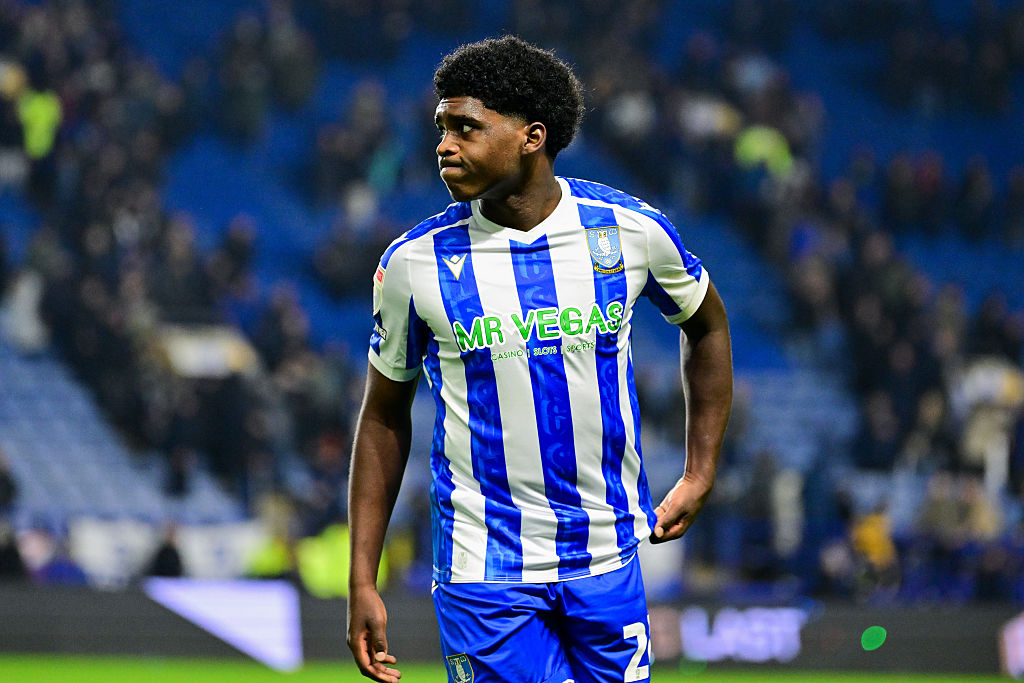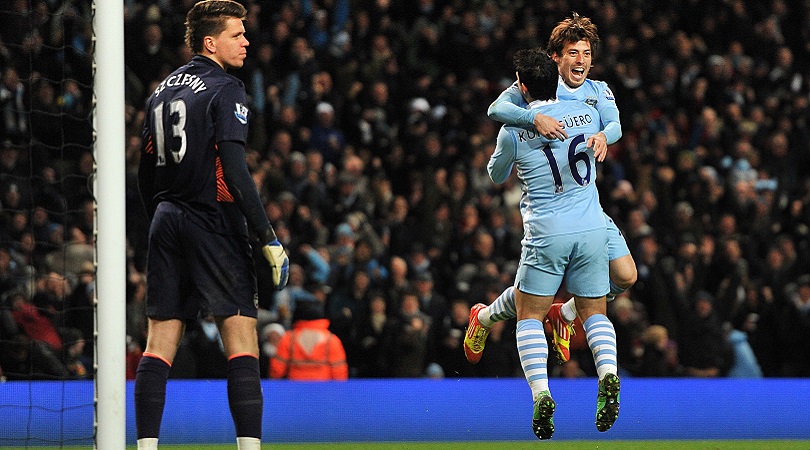
The Premier League's 100 best foreigners
Sure, football didn't begin in 1992, but there's little doubting what a major yardstick it is for English football. Since then the Premier League has welcomed players from 105 countries outside of the British Isles, so many of whom have influenced more than just results on the pitch. This is our celebration of them.
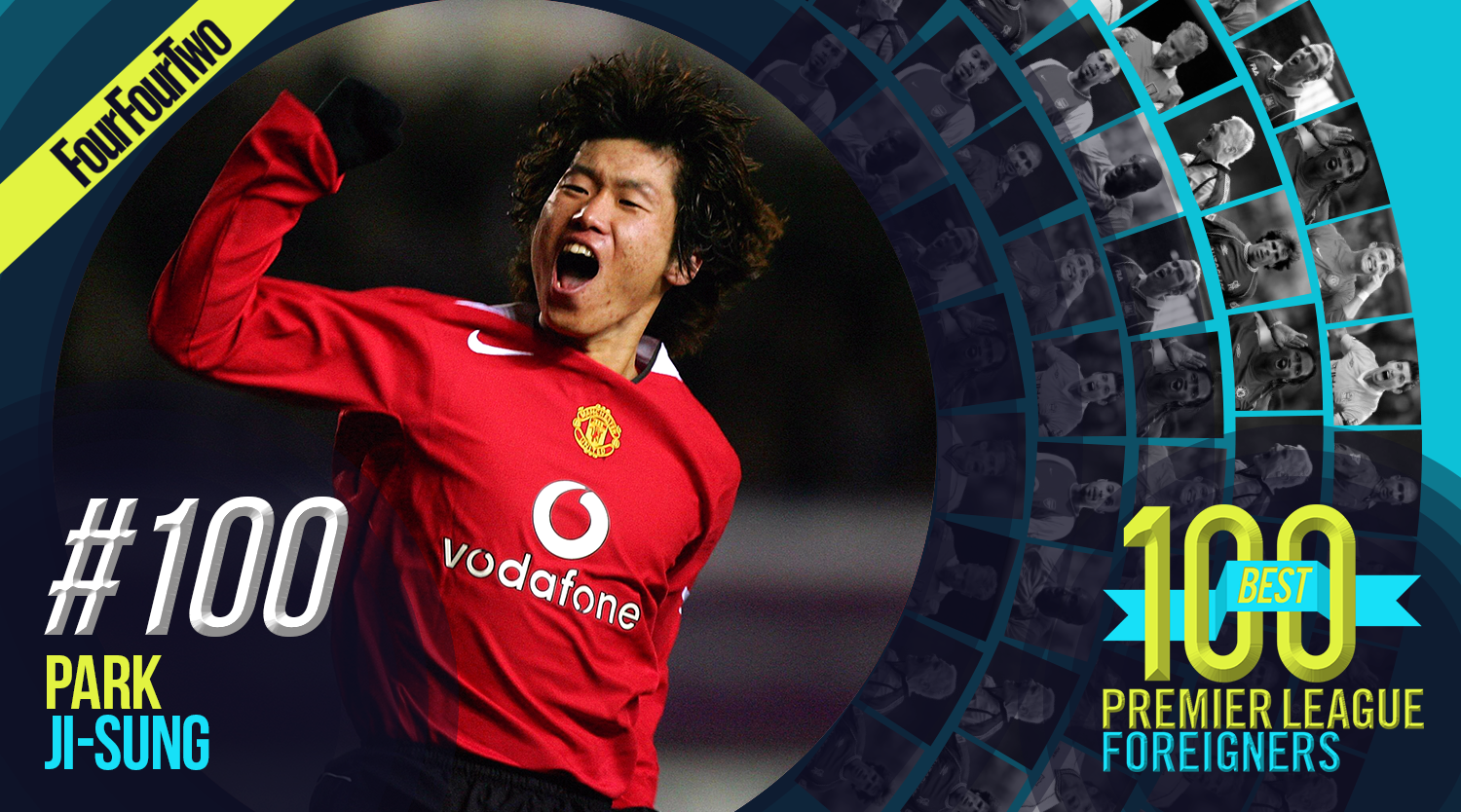
100. Park Ji-sung
The Korean’s arrival in 2005 helped the Premier League become a sensation back home – Alex Ferguson even had to deny he’d been signed to boost Manchester United’s shirt sales in Asia. True enough, Park’s near-infinite reservoir of attacking running, defensive diligence and tactical intelligence made him a fans’ favourite at Old Trafford.
He was a manager’s favourite, too: in a squad packed with talent, it was Park who started the 2009 and 2011 Champions League finals, after Ferguson admitted that leaving him out of the 2008 showpiece was the hardest decision he’d ever made.
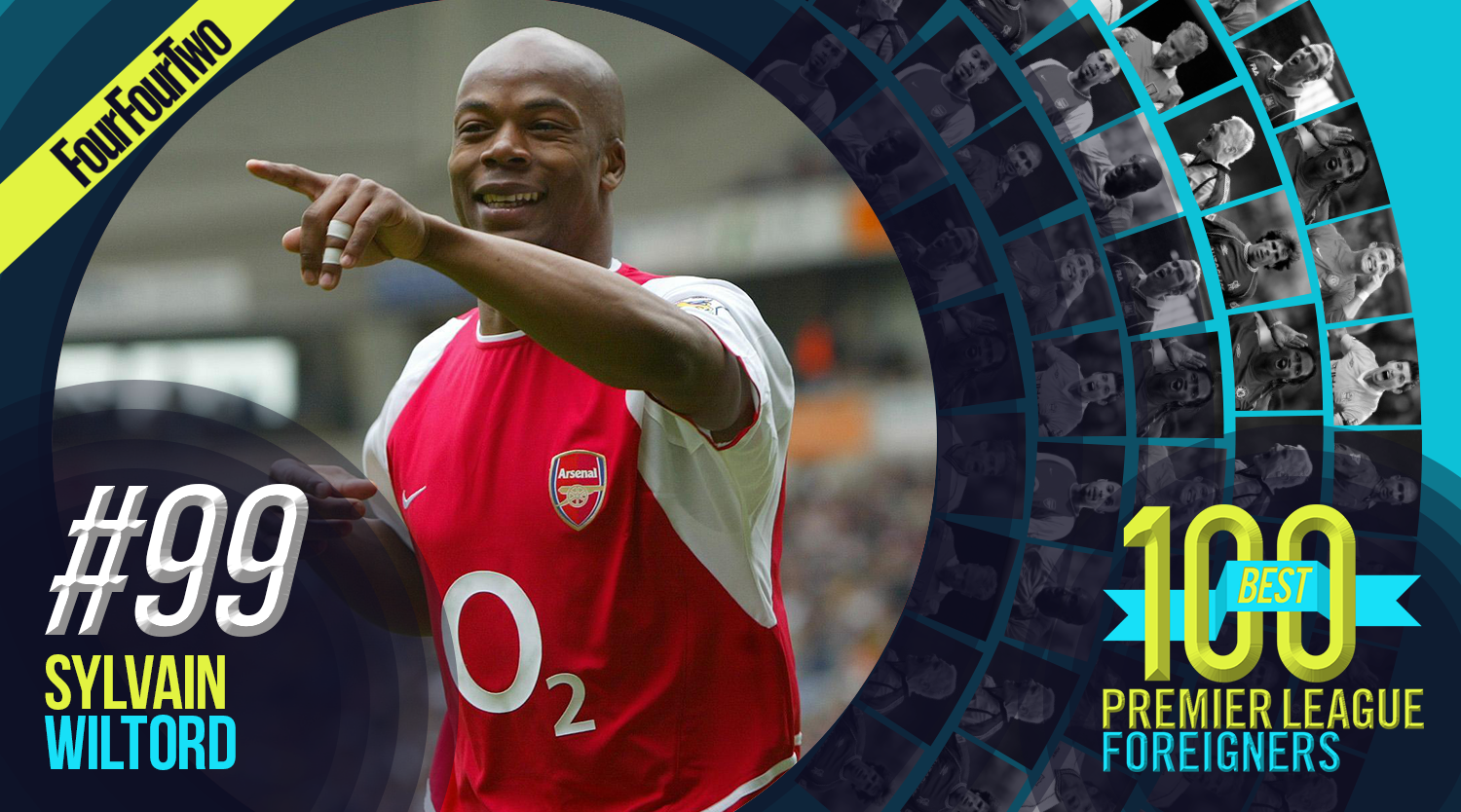
99. Sylvain Wiltord
Following his £13m transfer from Bordeaux, Arsenal’s then-record signing sometimes appeared to labour in the lengthy shadow of his Bleus team-mate, Thierry Henry. Wiltord, a winger, expressed a desire to play as a central striker, only to be regularly rebuffed by Arsene Wenger.
Yet Gunners fans owe Wiltord a huge debt of gratitude for his goals in their team’s Double-winning campaign. His freakish winner at Goodison Park in February sparked Arsenal's 13-match winning run, and his decisive strike at Old Trafford in May 2002 confirmed the Londoners as Premier League champions.
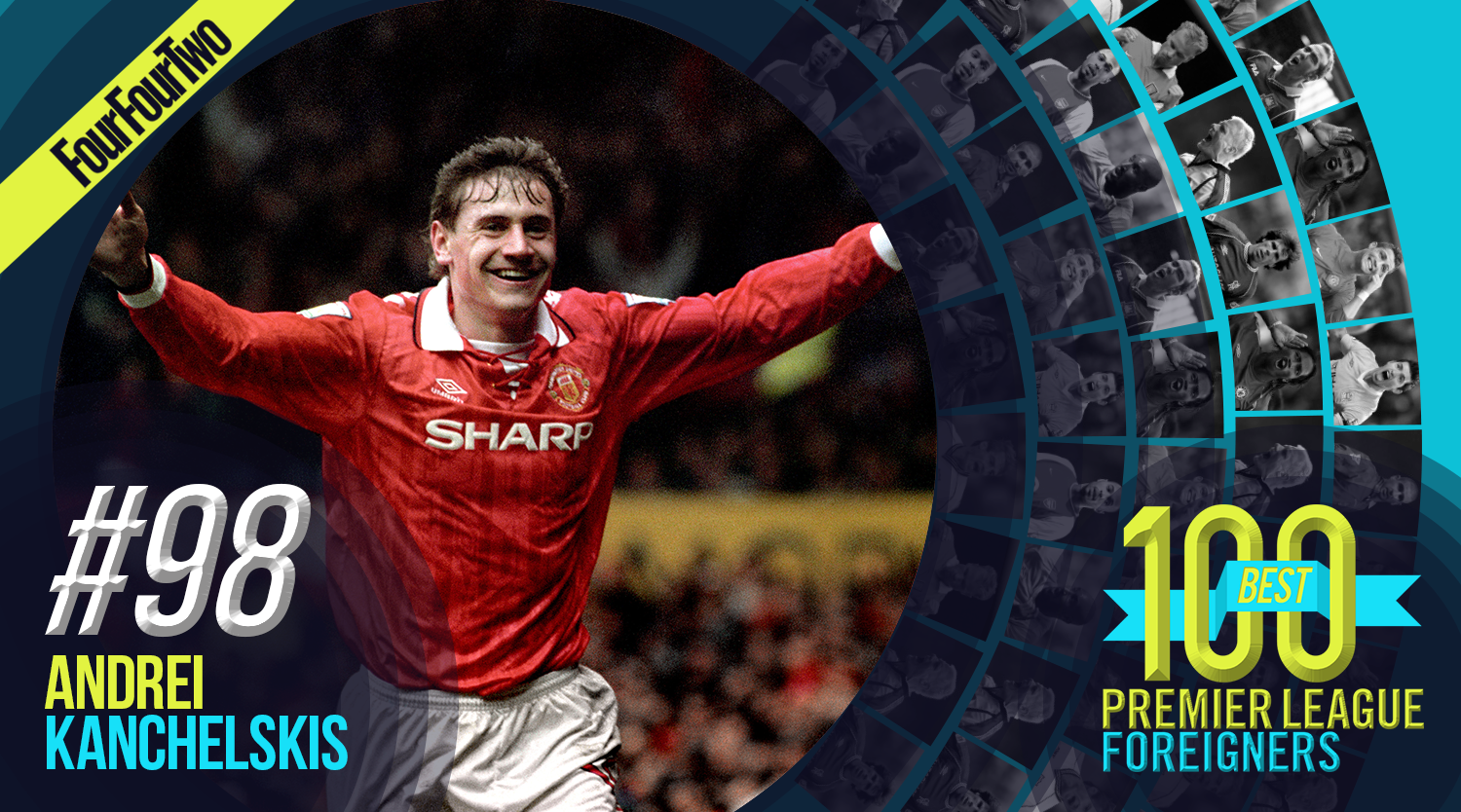
98. Andrei Kanchelskis
The flying winger made defenders' lives miserable after joining Manchester United in March 1991, and played an oft-forgotten part in the club’s transformation into serial winners.
Kanchelskis lifted two Premier League titles, the FA Cup and the League Cup before leaving United a healthy profit, Everton paying a club-record £5m for their £650,000 investment. His superb performances in the Toffees’ impressive 1995/96 campaign drew illustrious suitors, and after moving to Fiorentina for £8m he’d return to England only for fleeting spells with Manchester City and Southampton.
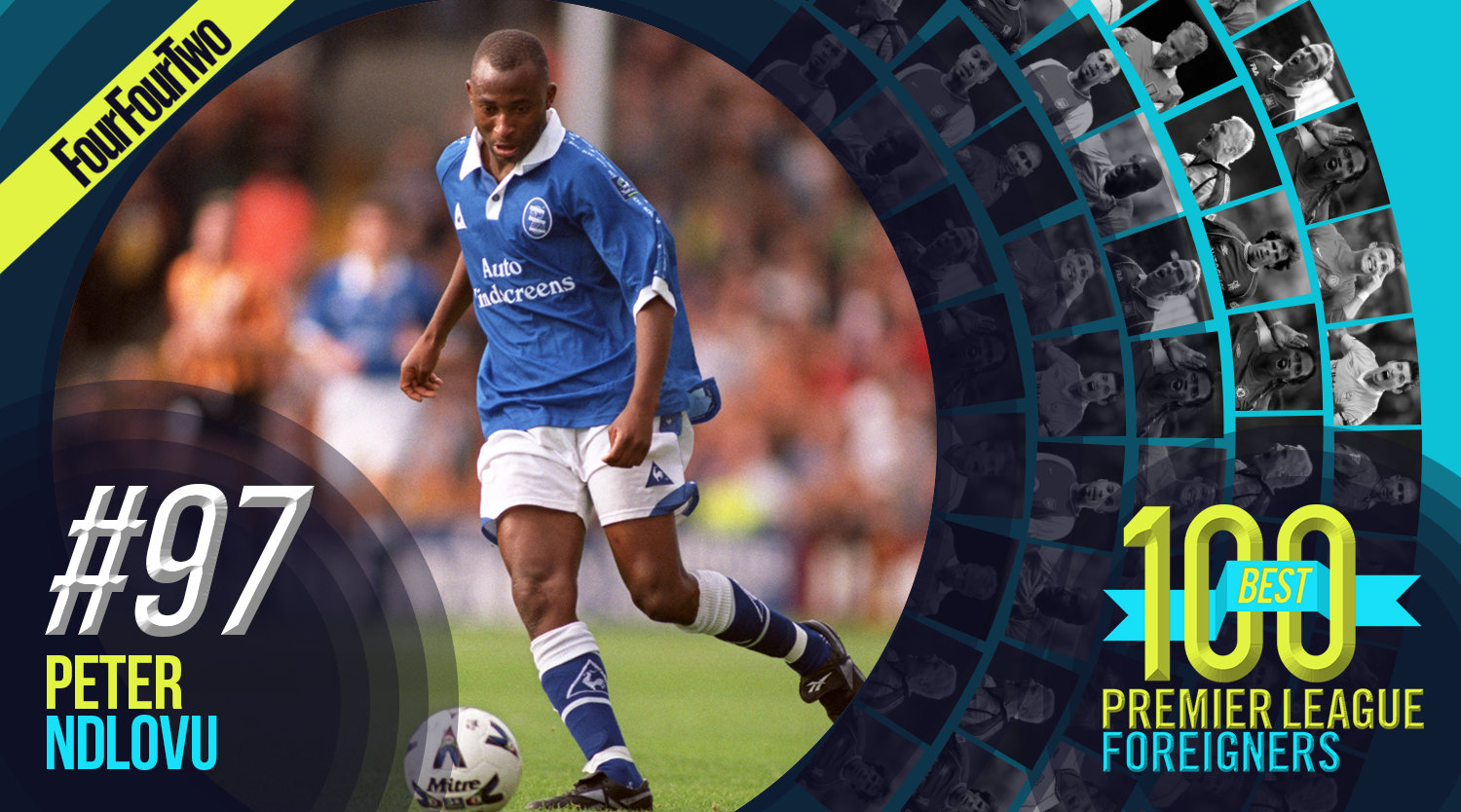
97. Peter Ndlovu
While the name might mean little to today’s generation, Ndlovu brought class when foreign players were a Premier League rarity. He’d go on to win 100 caps for Zimbabwe, but even as a teenager he was key for Coventry City (another name who’ll resonate with few Premier League fans today).
In a struggling side Ndlovu was a constant nuisance to opposition defences. The striker was largely responsible for maintaining Cov’s 34-year residence in the top flight, before dropping a division in 1997 to improve Birmingham, then Sheffield United.
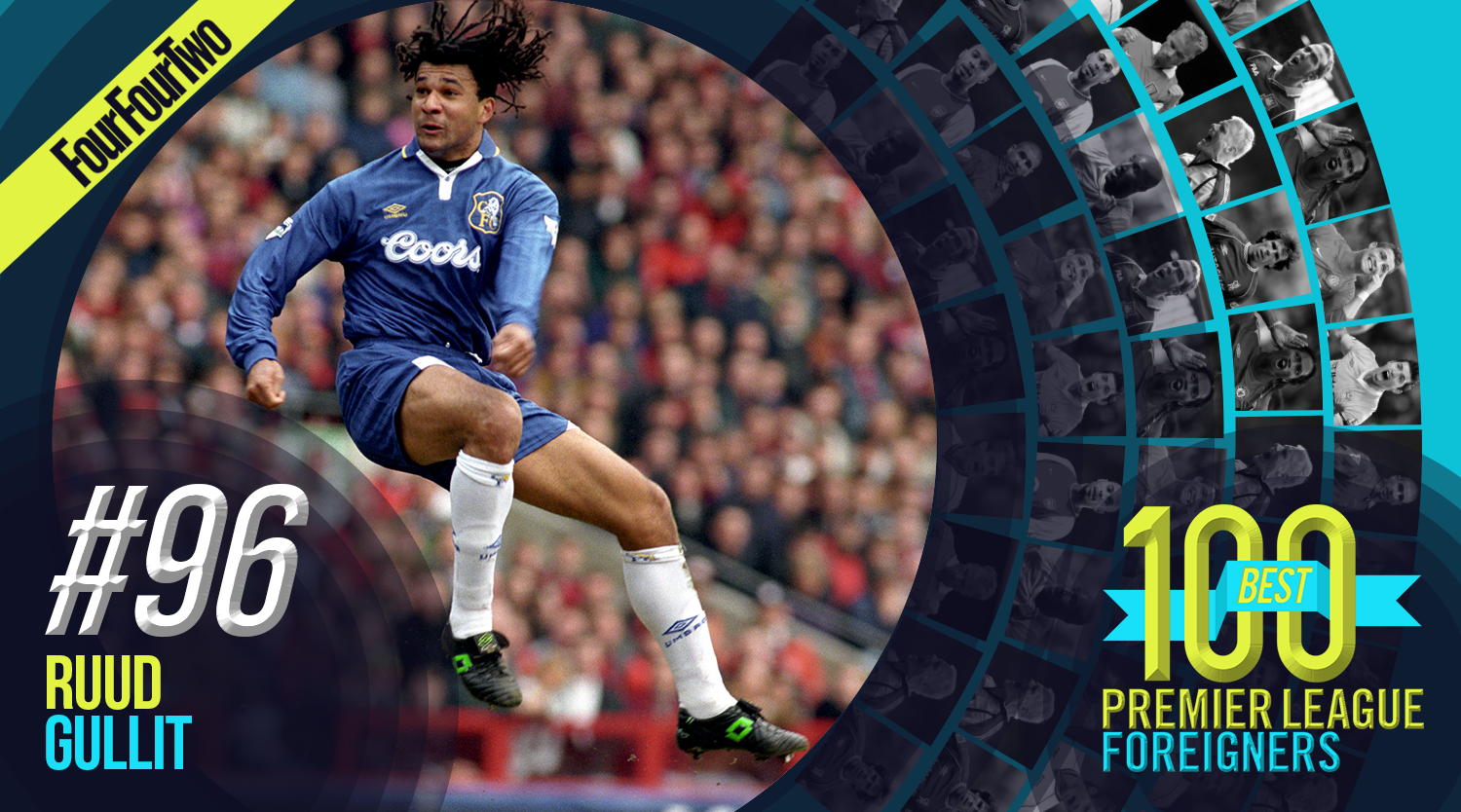
96. Ruud Gullit
The Ballon d’Or winner joined Chelsea for free in 1995. He may have been past his legendary best, but the Dutchman’s arrival nonetheless signalled the Premier League’s intent to compete with Europe’s top divisions.
Gullit began as a sweeper before moving into midfield, and became a dominant presence so quickly that he was named runner-up to Eric Cantona as Footballer of the Year.
Within a year of his arrival he became player-manager, replacing England-bound Hoddle. Gullit promptly won the FA Cup, Chelsea’s first silverware since 1970.
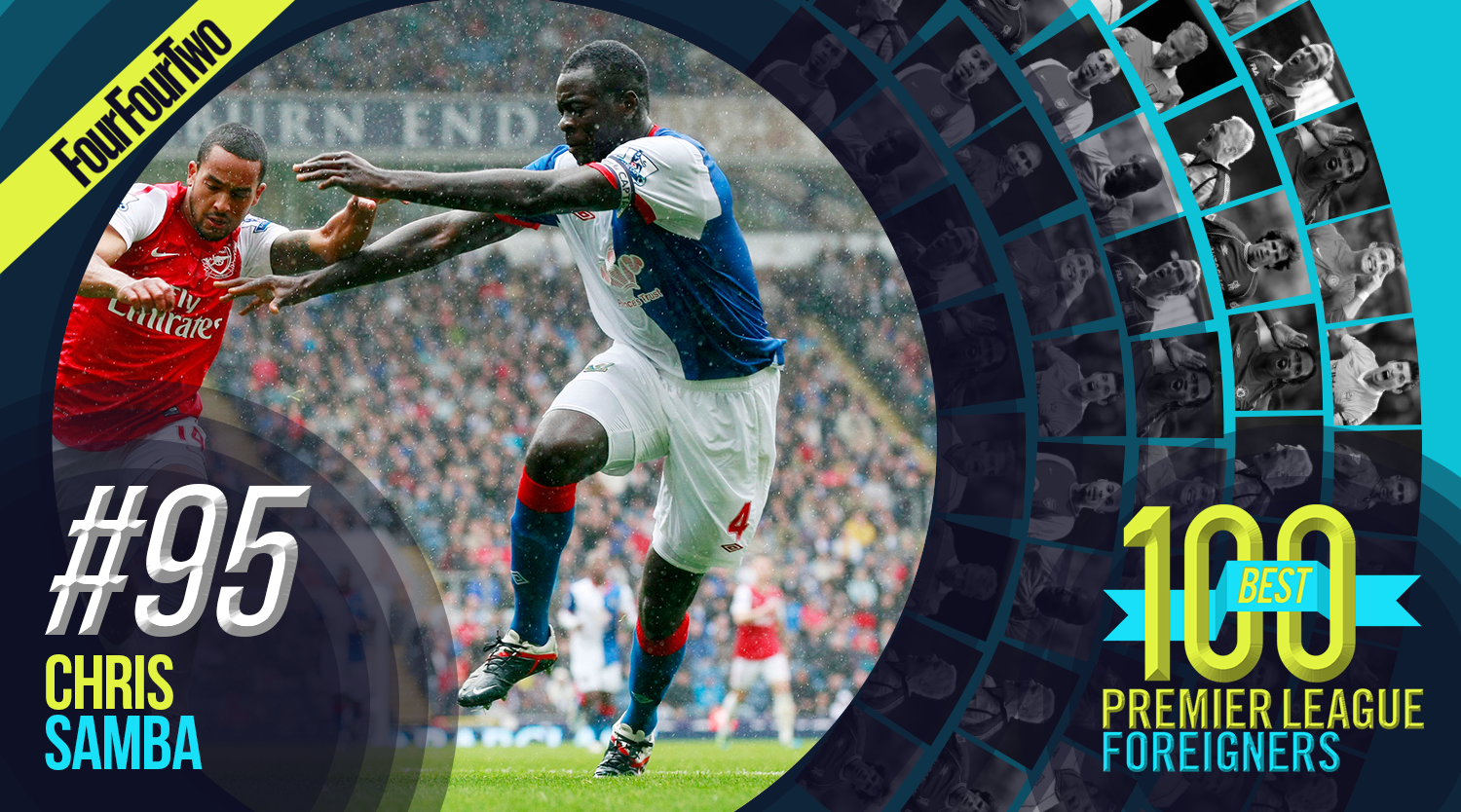
95. Chris Samba
Forget the QPR episode, which ruined his reputation in England, and remember that between 2007 and 2012 Samba was one of the most aerially dominant defenders in the Premier League. Though it’s hard to imagine now, he was a key component of a Blackburn side who could have climbed higher up the table.
Various factors contributed to his stagnation, but his big-money move to Anzhi Makhachkala and the racist abuse that followed were paramount. When he returned to England less than a year later, the centre-back was a shuffling imitation of the player he had been.
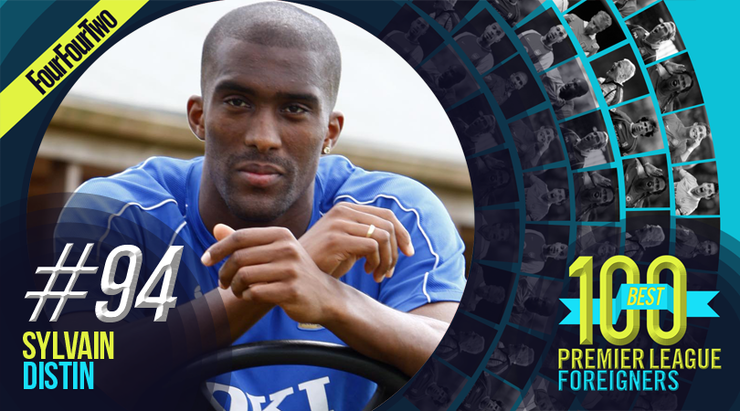
94. Sylvain Distin
Pick someone at random and ask them who’s made the most Premier League appearances of any foreign outfield player. It’s unlikely they’ll be correct. Yet it was his under-the-radar, no-fuss performances that earned Distin that accolade (he played 469 games in total), even if they brought him little recognition in England and none in his home country.
If Manchester City saw the most of Distin, either side of stints with Newcastle and Portsmouth, Everton saw the best. A classic David Moyes signing, he gave the Toffees’ backline experience and solidity across six seasons.
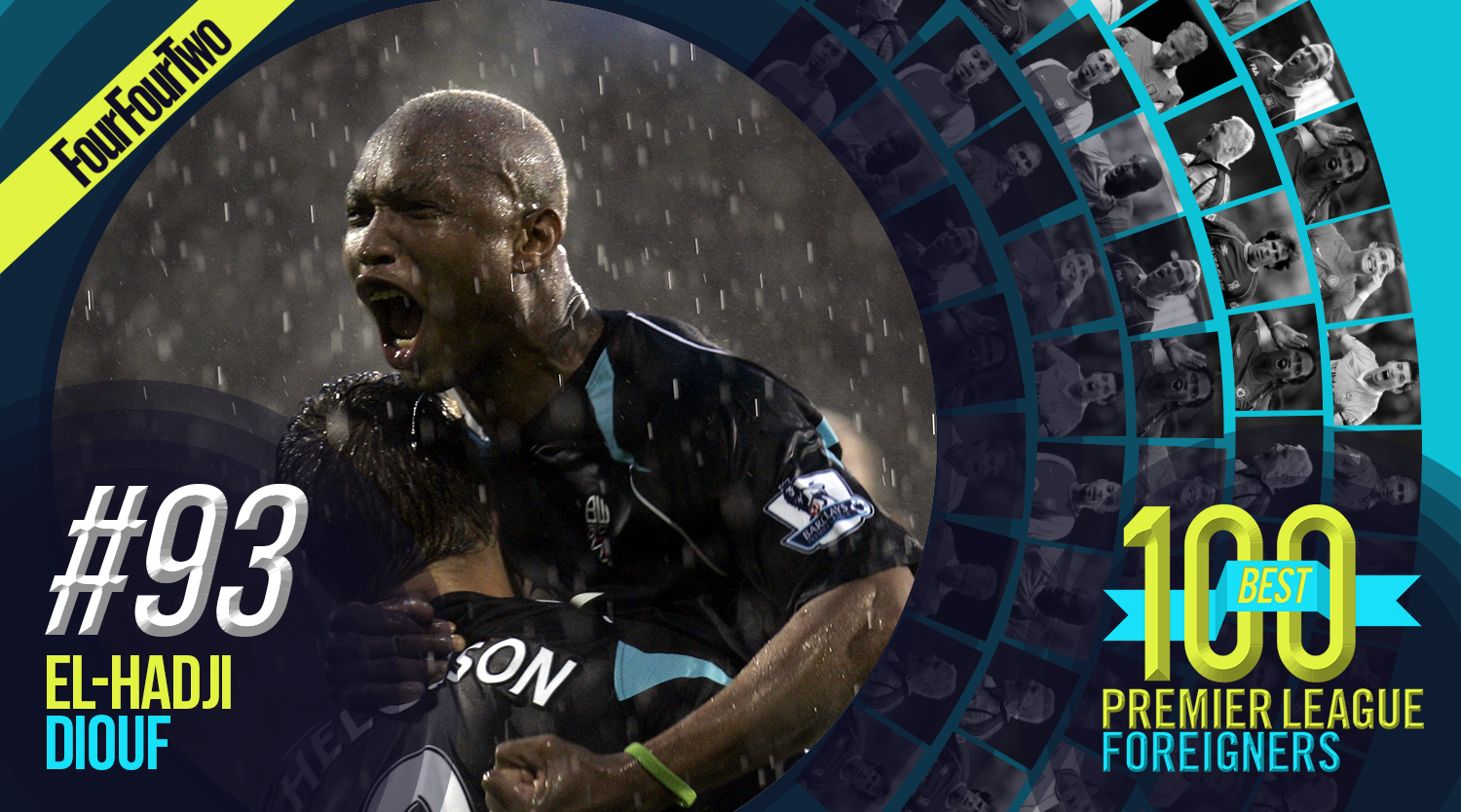
93. El-Hadji Diouf
Senegal's World Cup squad had made zero Premier League appearances between them when they shocked holders France and reached the quarter-finals in 2002, but 10 of the 23 would end up in England's top flight. In fact, El-Hadji Diouf and Salif Diao had agreed moves to Liverpool before the World Cup began.
Neither had much fun at Anfield (and Diouf is detested there even now for his continued attacks on club legend Steven Gerrard) but the forward enjoyed greater success at Bolton as the talisman of a team that twice qualified for Europe.
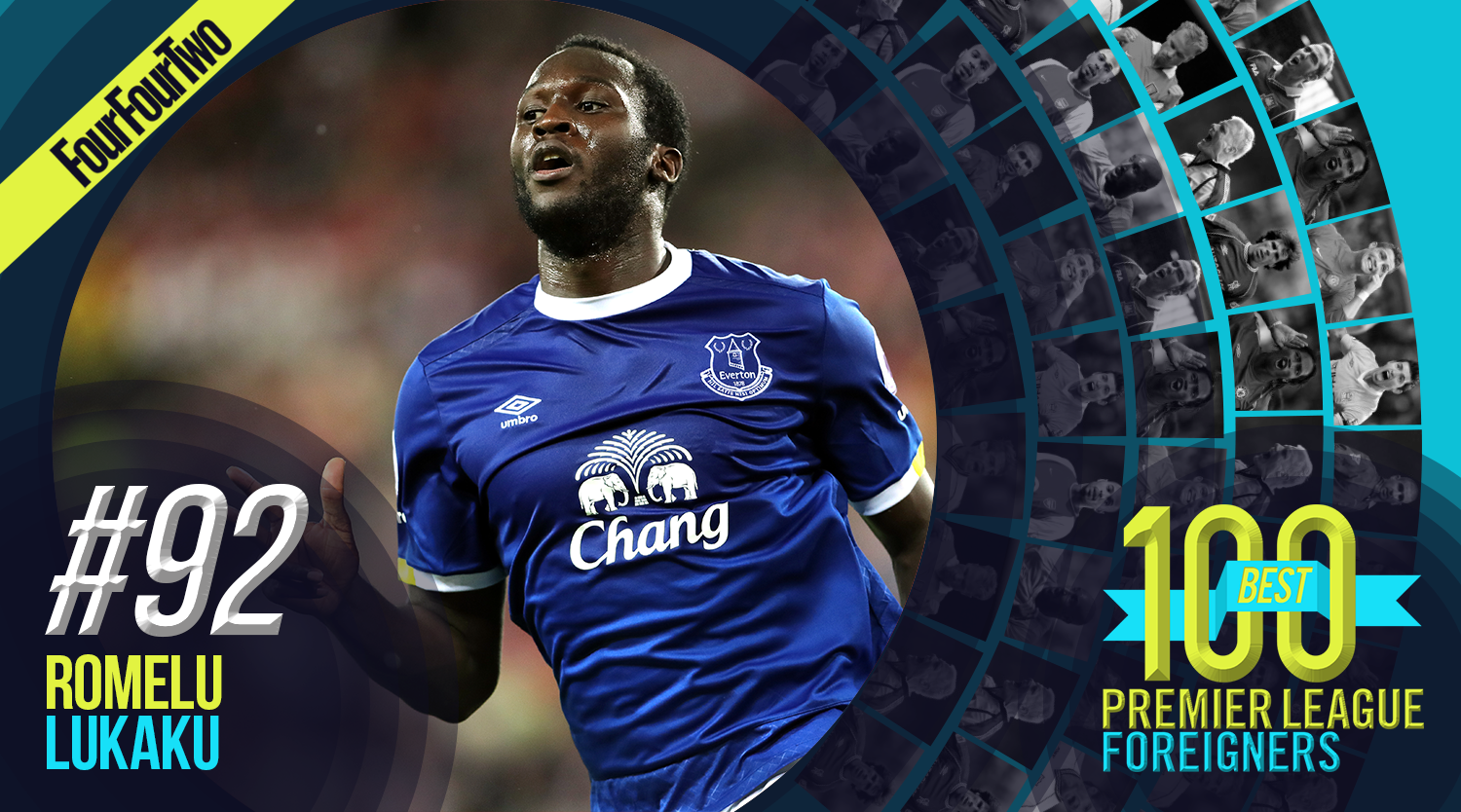
92. Romelu Lukaku
One day, Lukaku might be less polarising. His one-in-two strike rate will eventually be married to a more rounded game, and when that point arrives, he really will become an apex predator.
But those are concerns for tomorrow. Today, the Manchester United man is already an eclectically talented goalscorer as dangerous with his feet as he is in the air. His large frame disguises an occasional delicacy when inside the goalkeeper's shadow, and his current progress, when charted by goals and age, puts him in very special company.
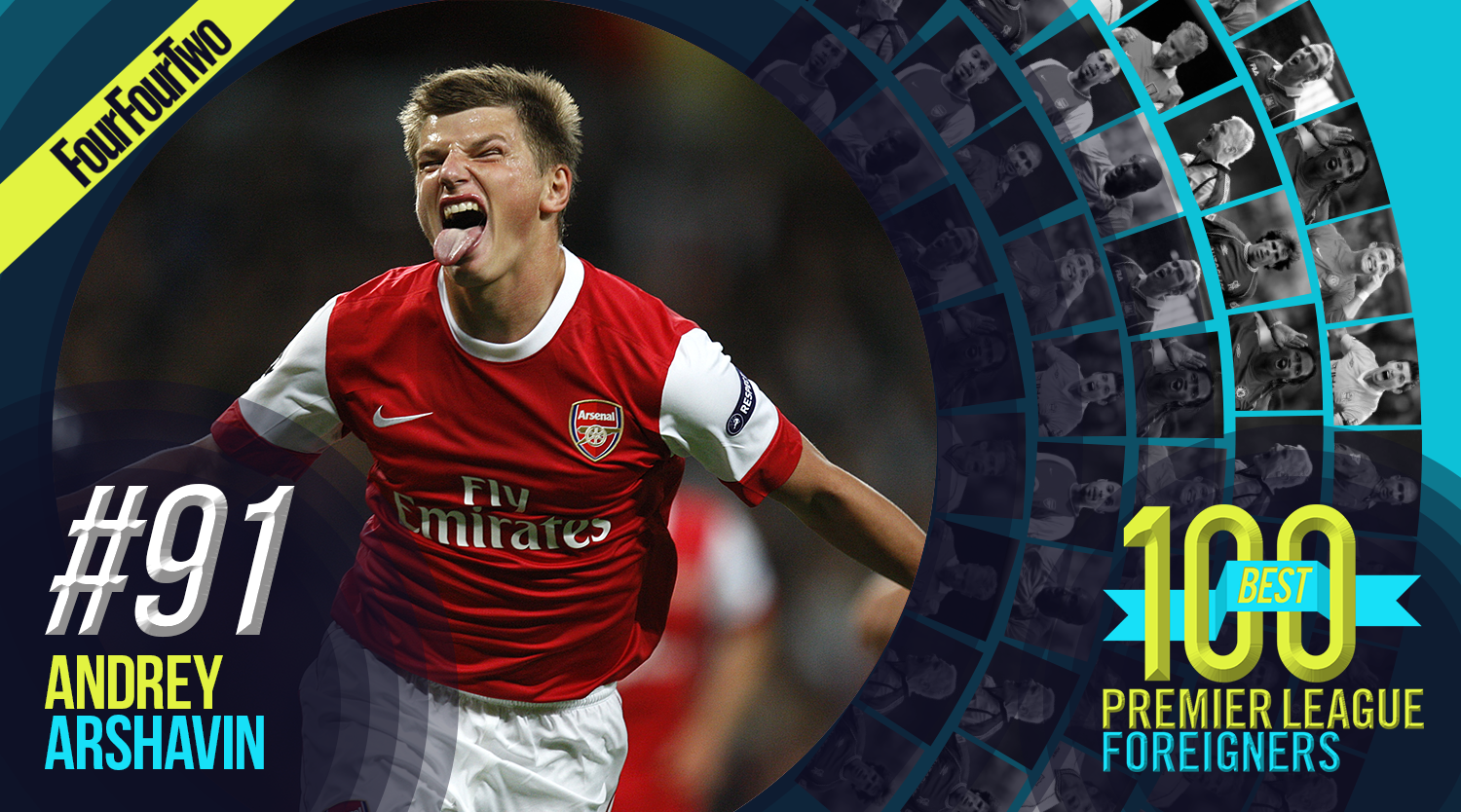
91. Andrey Arshavin
After his stunning performances at Euro 2008, the diminutive Russian joined Arsenal in January 2009 and immediately injected panache into a team that was labouring outside the Premier League’s top four.
Arshavin’s pace, directness and willingness to shoot from range widened their attacking options, until his joie de vivre disappeared when he was made to plough a lonely furrow up front during another prolonged Arsenal injury crisis.
Yet Gunners fans will never forget that remarkable four-goal salvo in a 4-4 draw at Anfield two months after his debut. That night, they saw Arshavin at his brilliant best.
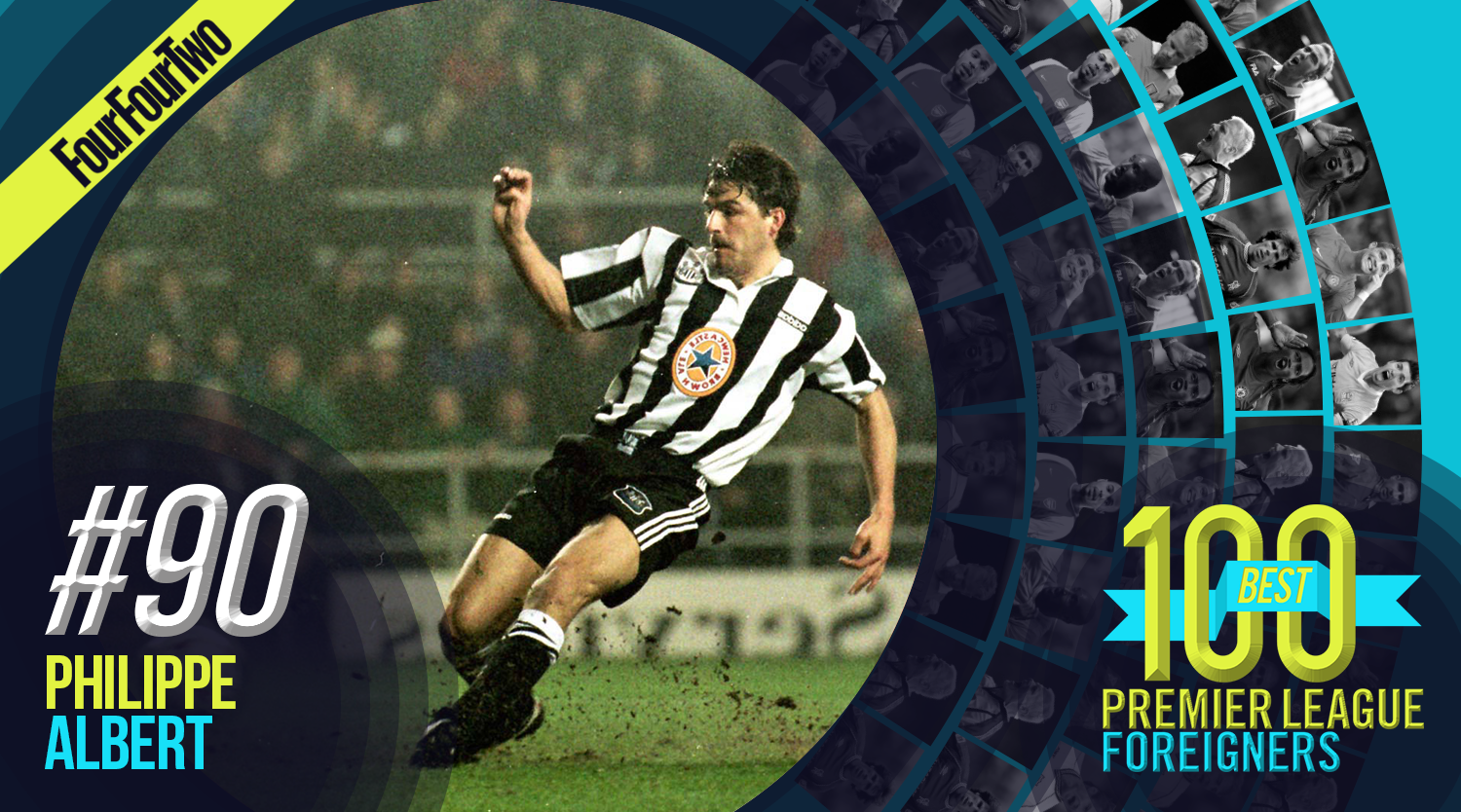
90. Philippe Albert
With his relaxed demeanour, elegant playing style and tremendous ’tache, the Belgian defender became a folk hero on Tyneside. His attacking forays assisted Newcastle in overloading opponents, as the Entertainers came close to ending the club’s trophy drought.
But while that beautiful chipped goal in 5-0 thronking of Manchester United in October 1996 deserves its regular outings on Premier League Years, Albert’s defensive qualities shouldn’t be overlooked.
He enjoyed five years with Newcastle and a loan spell at Fulham, before heading home to Belgium, where he started a new life trading fruit and veg. As you do.
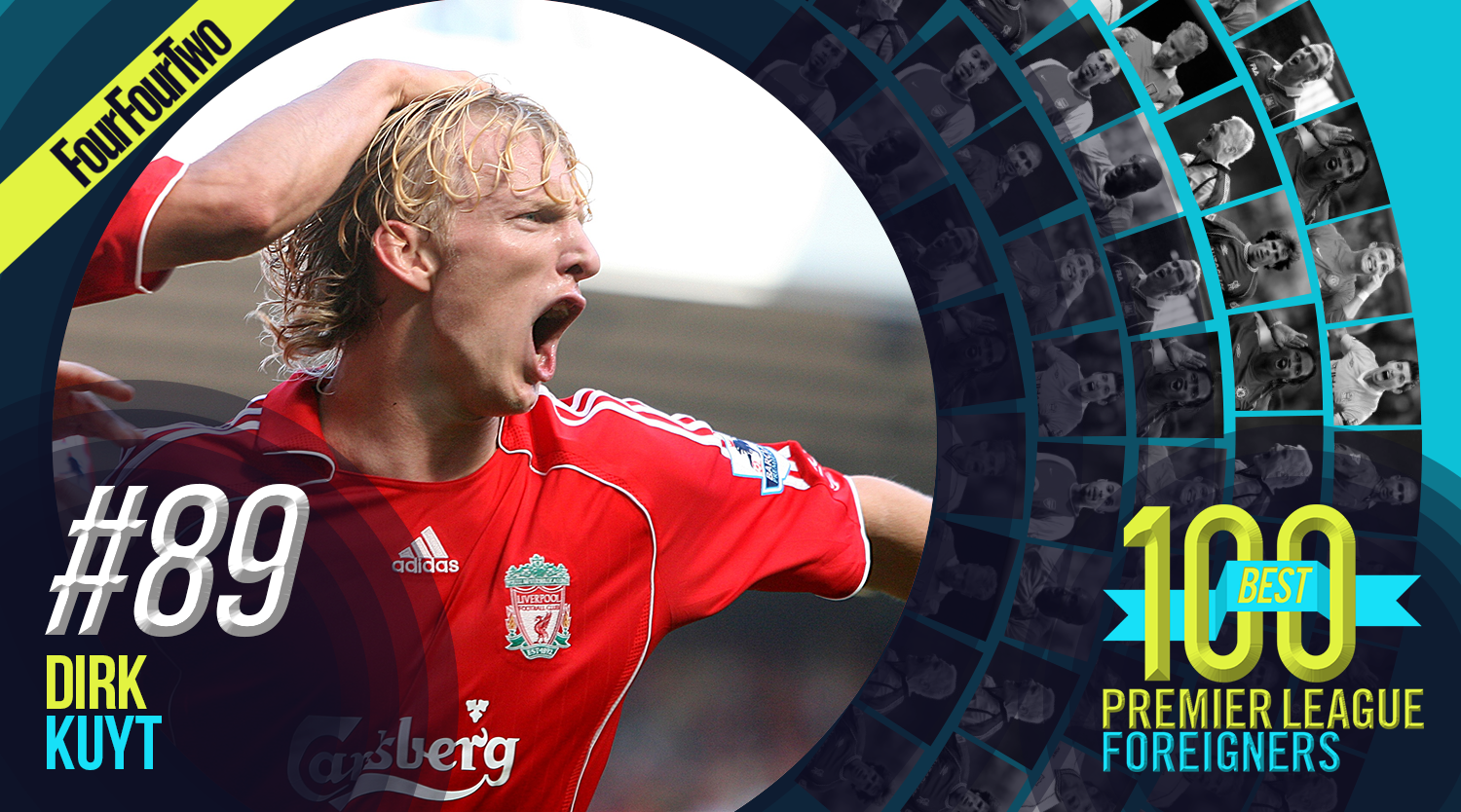
89. Dirk Kuyt
Signed from Feyenoord as a free-scoring striker, Kuyt looked destined to be just another forward to experience cringe-inducing difficulty in turning Eredivisie goals into Premier League currency. Before he could fail as a striker, however, the Dutchman reinvented himself as a winger.
Kuyt was the unsung hero of Rafa Benitez’s finely tuned Liverpool team which peaked in the 2008/09 campaign, when they lost two games all season and narrowly missed out on the title. Unsurprisingly, the Anfield faithful grew to love a player who was preposterously hard-working and had a knack of scoring in big games.
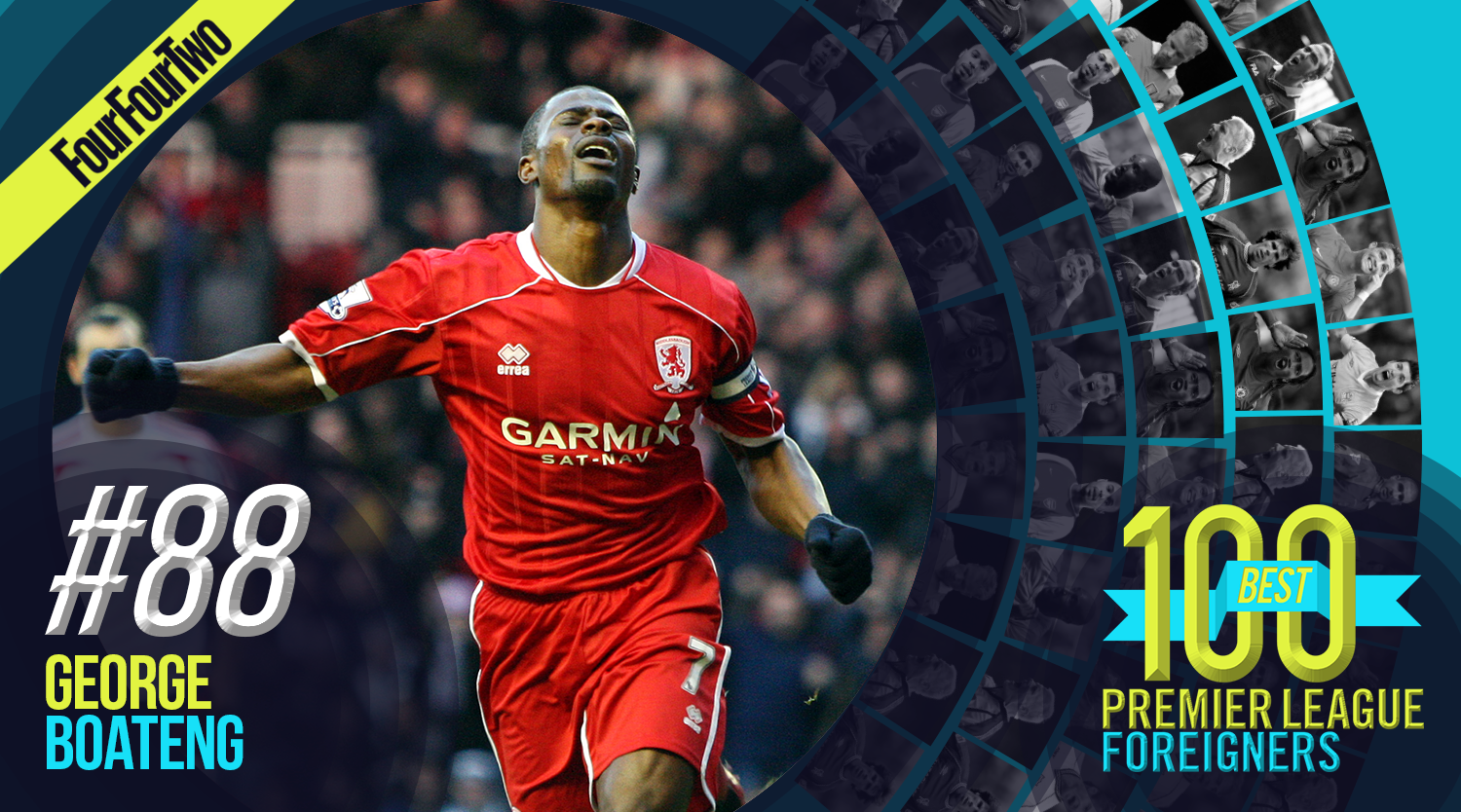
88. George Boateng
This particular Boateng was the kind of player loved by every fan of the clubs he represented. Seeing as the Dutchman made nearly 400 Premier League appearances for Coventry, Aston Villa, Middlesbrough and Hull, that amounts to some substantial affection – and rightly so.
While he was more than a mere ball-winner, Boateng’s defining characteristic was his tenacity in hunting down and retrieving possession. Was he the most gifted of midfielders? No. But he gave all of himself to every cause, and watching him play was often a stirring experience for the traditionalists among us.
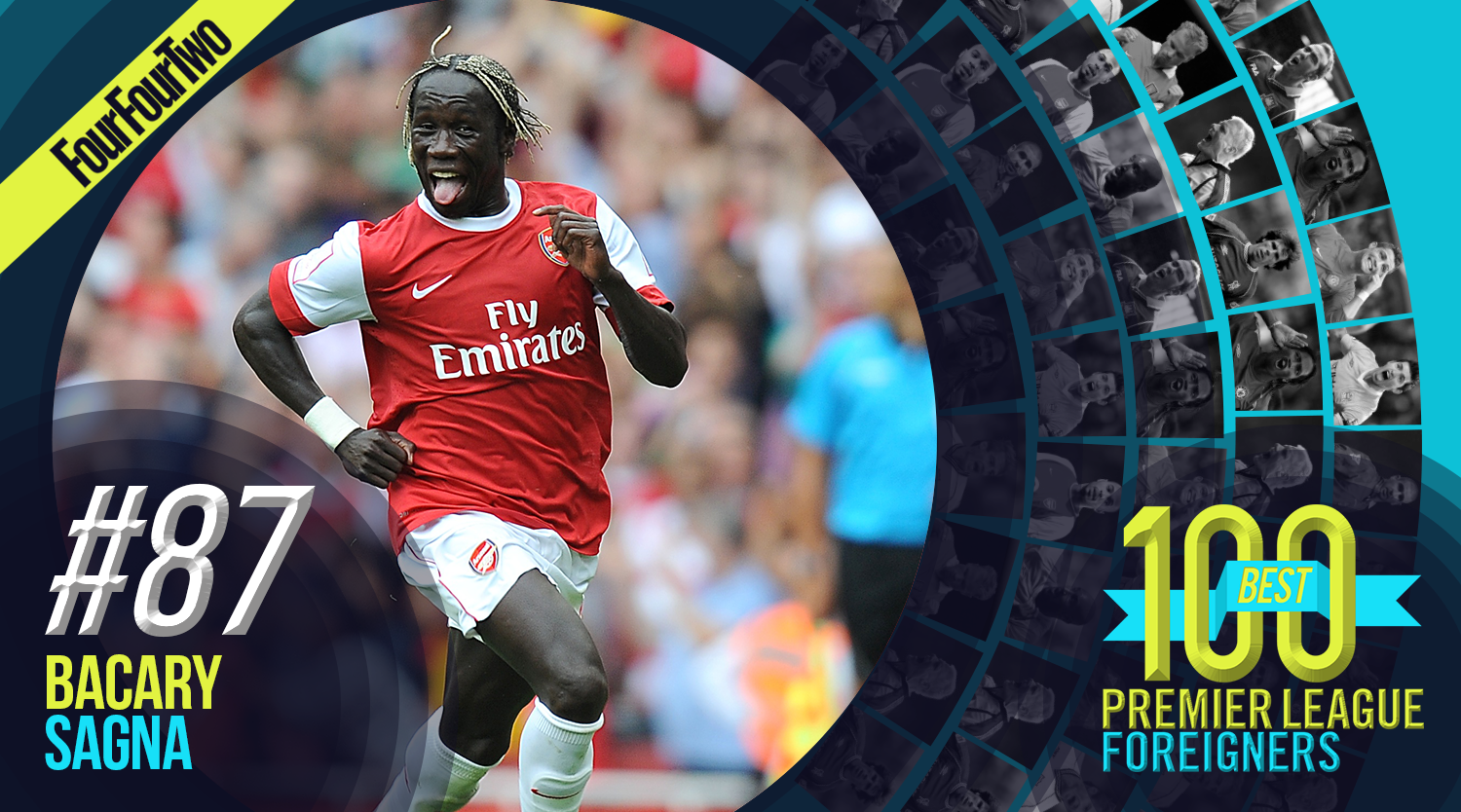
87. Bacary Sagna
For seven years at Arsenal, the Frenchman was a model of consistency as well as the archetypal modern full-back: fast, combative and the instigator of countless attacks. There were few finer sights at the Emirates than Sagna in full flow, his beaded braids gleaming in the sun.
He won just one trophy with Arsenal, the FA Cup in 2014, before announcing his intention to leave for Manchester City. He gradually forced his way into the reckoning there, before being released at the end of last season.
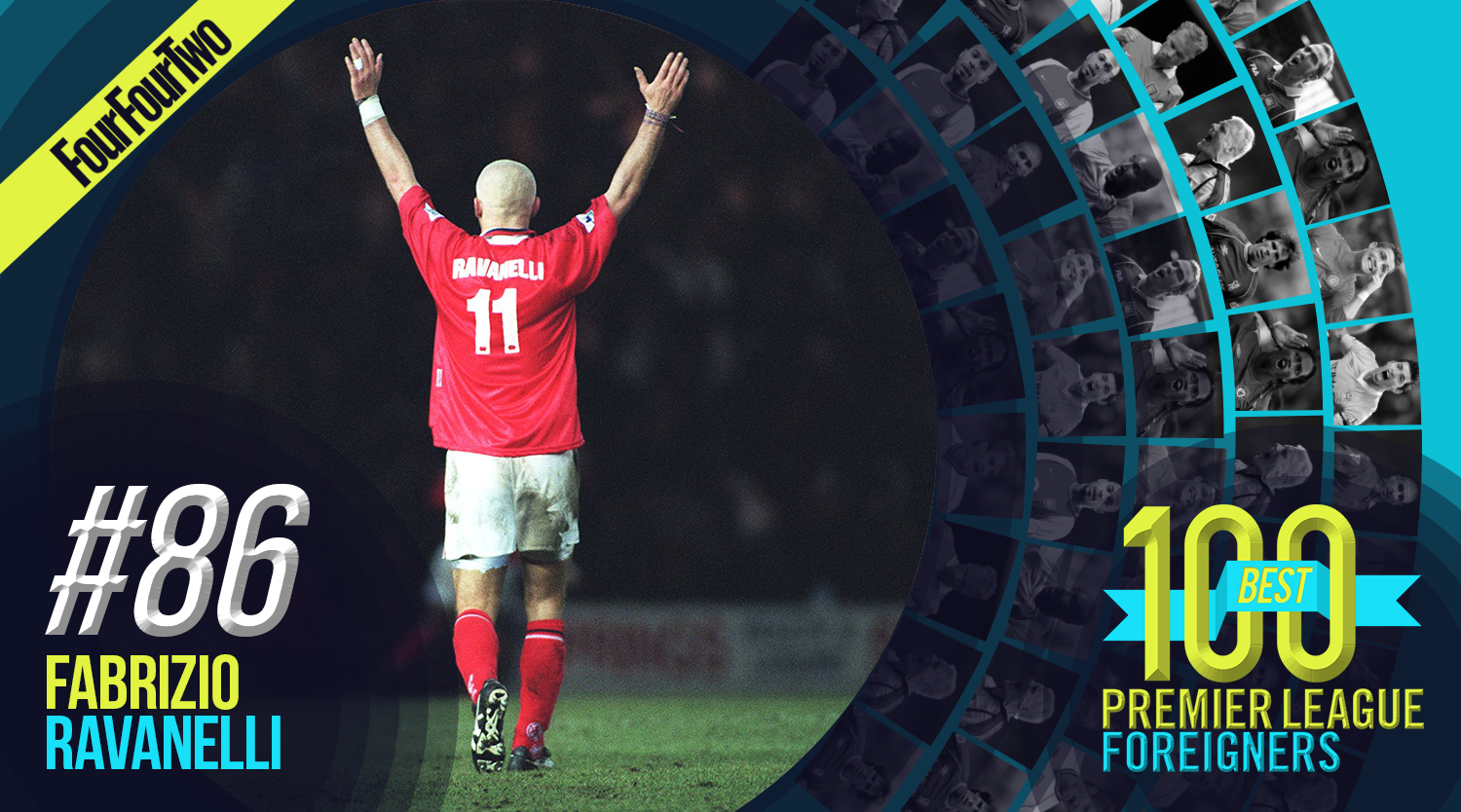
86. Fabrizio Ravanelli
Teesside was an unlikely Mecca for exotic footballers in the mid-1990s, and Ravanelli – silver-haired but only 27 – wasted no time in making his Premier League pilgrimage, barely six weeks after scoring for Juventus in the Champions League final.
Ravanelli was a rather English style of player: strong and mobile, and more than equipped for the British game. And he was incredibly effective, scoring 31 goals in his only full season with Boro – including a debut hat-trick against Liverpool. Even when he turned out for Derby in 2001/02, Ravanelli notched a respectable nine times in 31 matches.
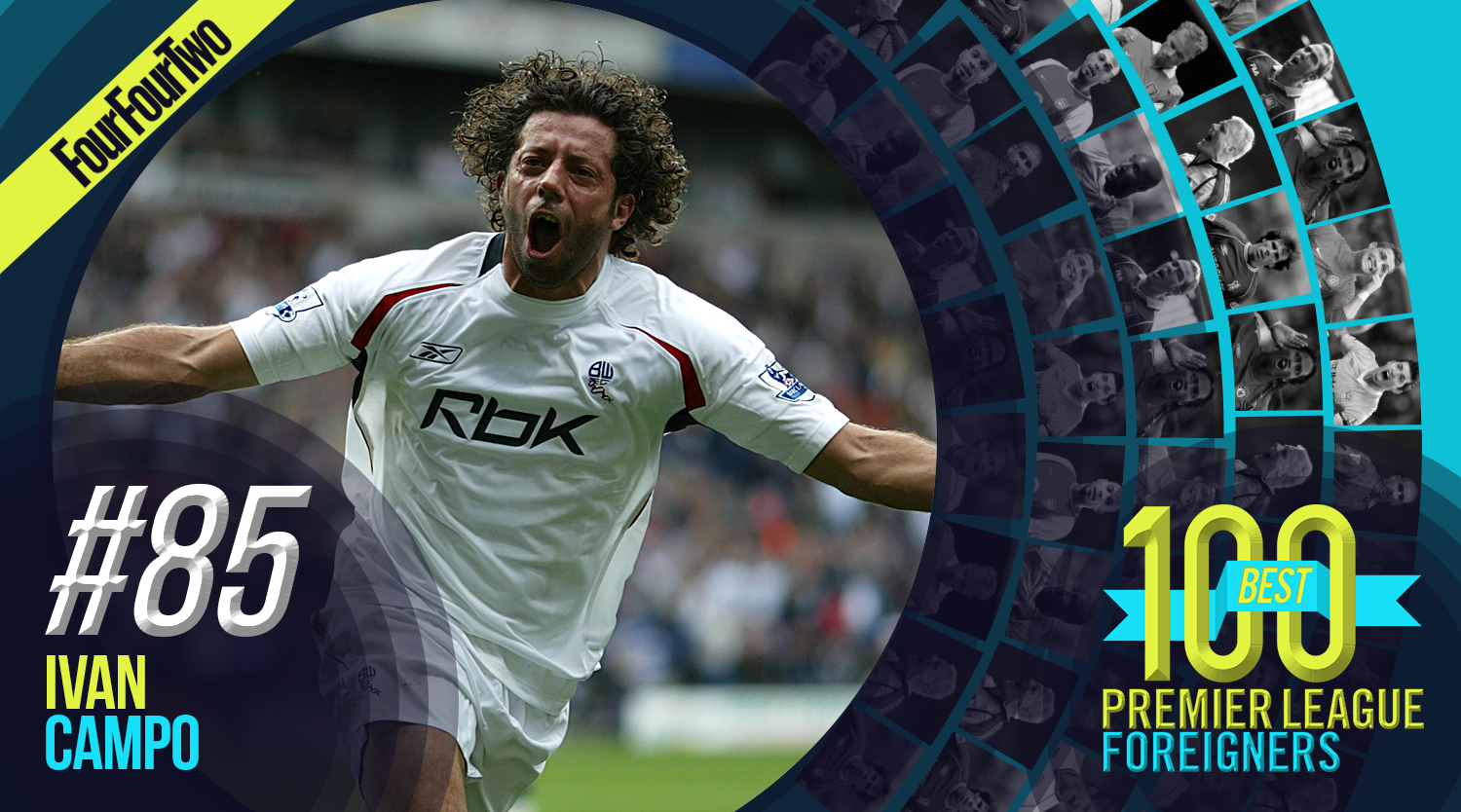
85. Ivan Campo
The mop-haired Basque won the Champions League twice at Real Madrid, but things went sour when fans turned on him following a number of mistakes. The player Bolton signed in 2002 – initially on loan – was therefore horribly low on confidence.
Also lacking pace, Campo struggled as a Premier League centre-back before Sam Allardyce moved him into a holding midfield role. There the former Spain international flourished, and aided by his range of passing, Bolton turned from relegation battlers into regular contenders for a European spot.
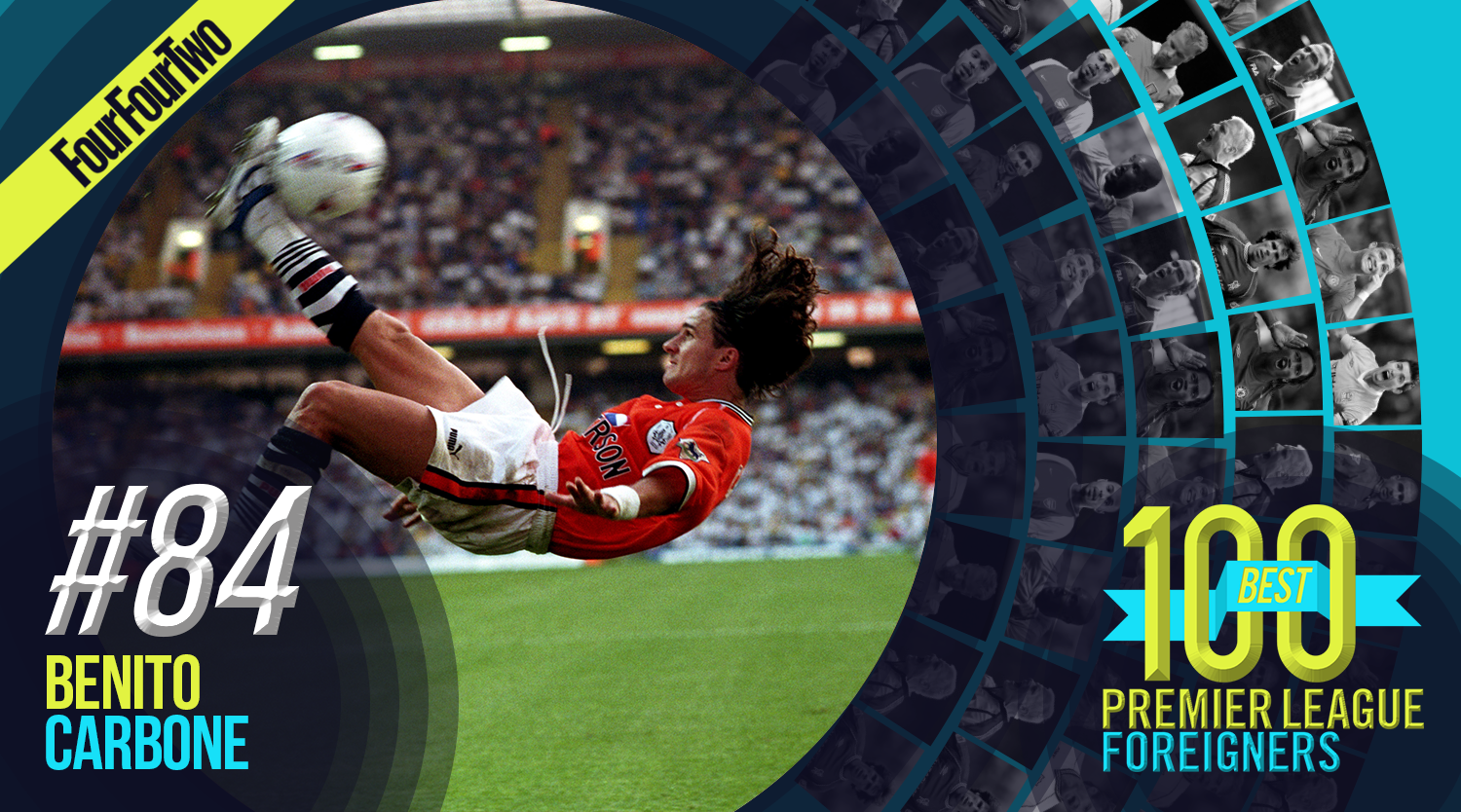
84. Benito Carbone
Carbone arrived at Sheffield Wednesday in 1996, when the Premier League was still relatively underdeveloped and rugged Englishness was the norm. Yet here was a dainty Italian, with catwalk good looks and flowing hair, caressing the ball and playing the game with an imagination that didn’t quite belong.
His goals have stood the test of time, but Carbone’s legacy doesn't endure as it should. He’s rarely credited for being in the initial boarding party of foreign players, and he was ultimately good enough to leave an impression upon a league which tried very hard to kick him to pieces.
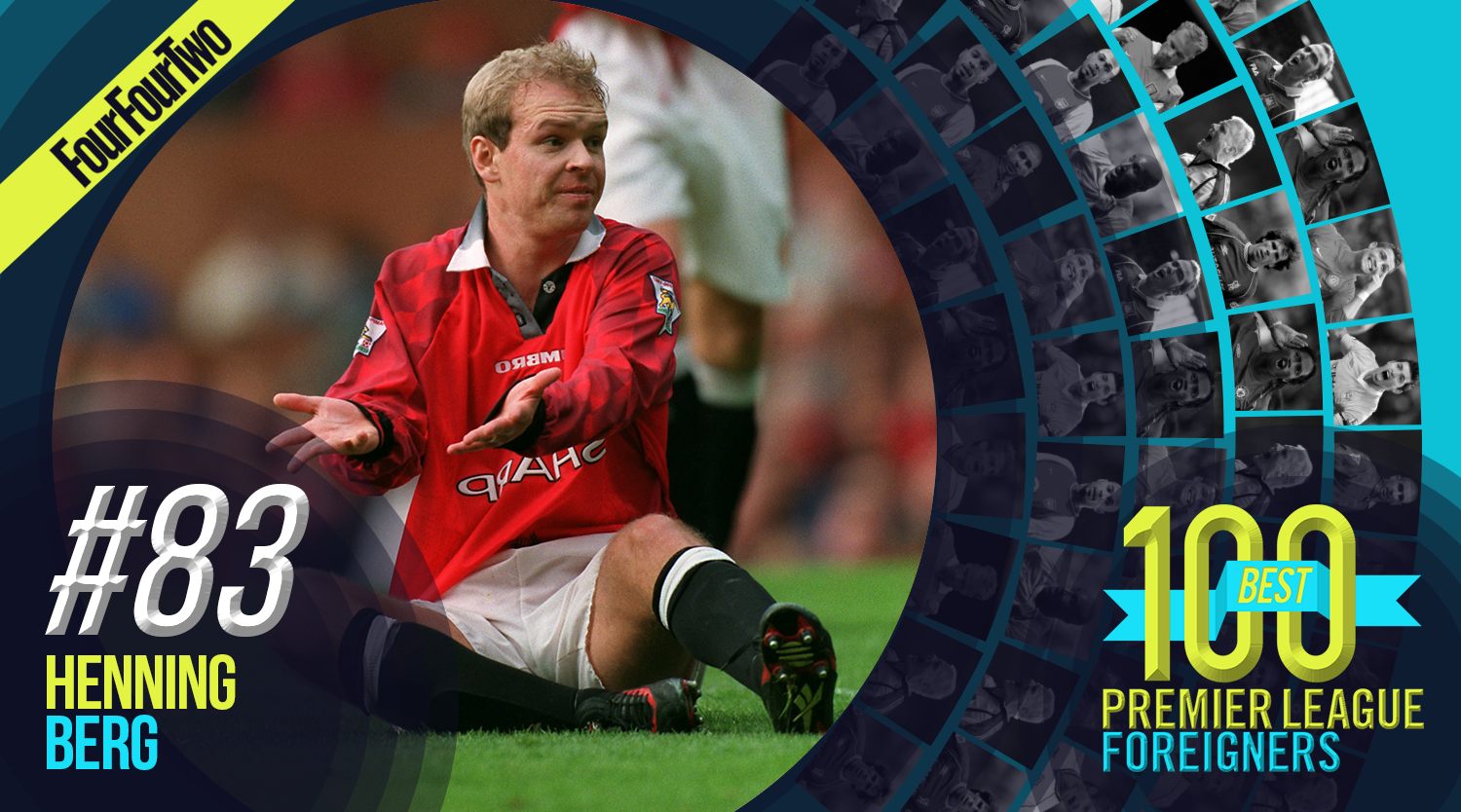
83. Henning Berg
For over a decade, Berg was the only player to win the Premier League with two clubs (six more have now matched the feat – try to name them if you like). The Norwegian was a pillar of reliability for Blackburn in their 1994/95 title-winning season, and again when called upon by Manchester United during a golden period in the club’s history.
After three years at Old Trafford, Berg returned to Ewood Park as a Treble-winner and marshalled Rovers’ backline for three more seasons to show he could still do the simple things as well as any defender in the league.
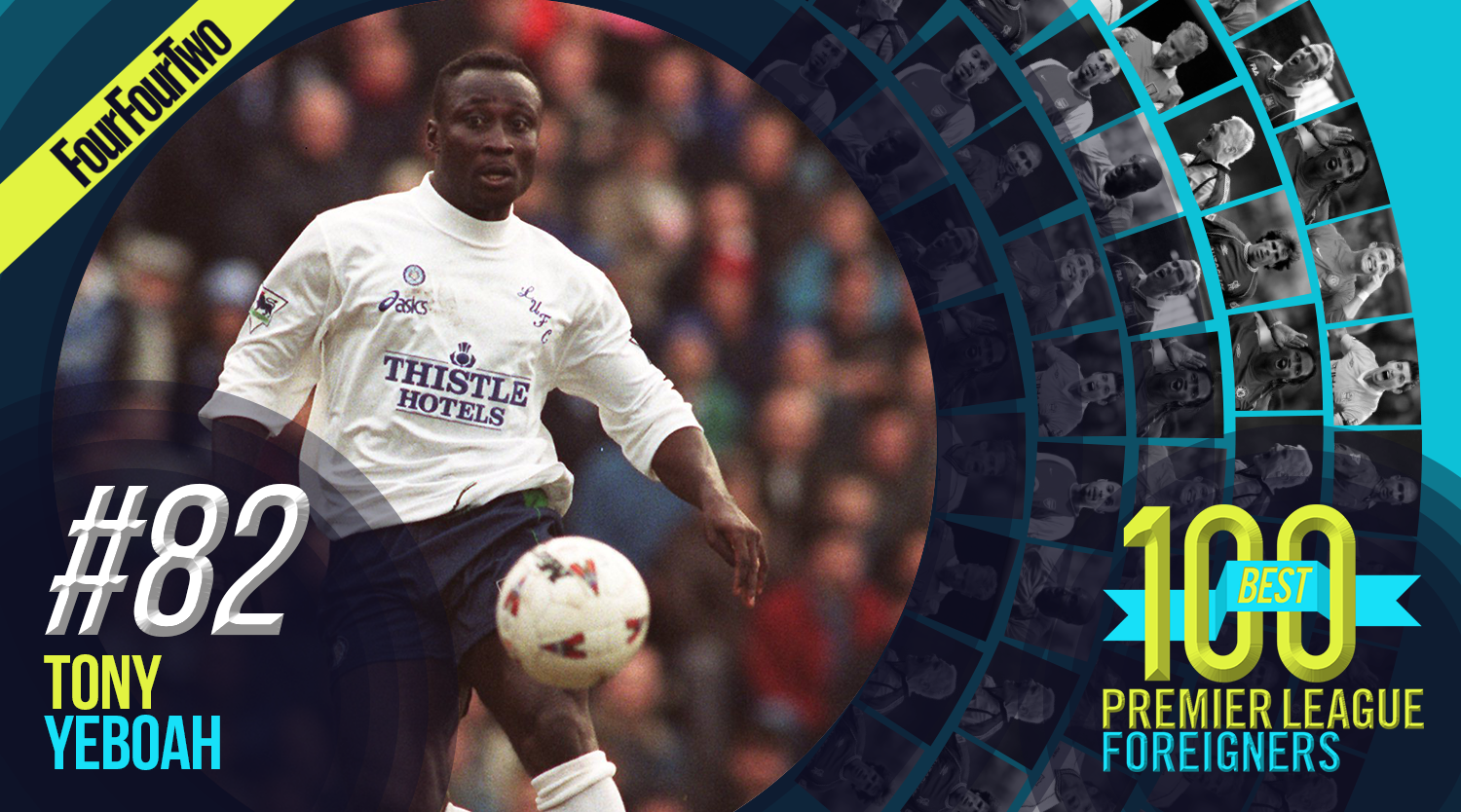
82. Tony Yeboah
The Ghanaian arrived at Leeds with a huge reputation thanks to his goalscoring exploits with Eintracht Frankfurt in the Bundesliga, where he finished as top scorer in 1992/93 and 1993/94.
‘Yeboah’ became a footballing verb heard on playgrounds across the country, and his goals against Liverpool and Wimbledon in consecutive months of 1995 live long in the memory.
However, those inimitable strikes were just a snippet of the brilliance he brought to Yorkshire. He scored 32 goals, many of them breathtaking, during his two years in the Premier League, before leaving Elland Road behind to join Hamburg.
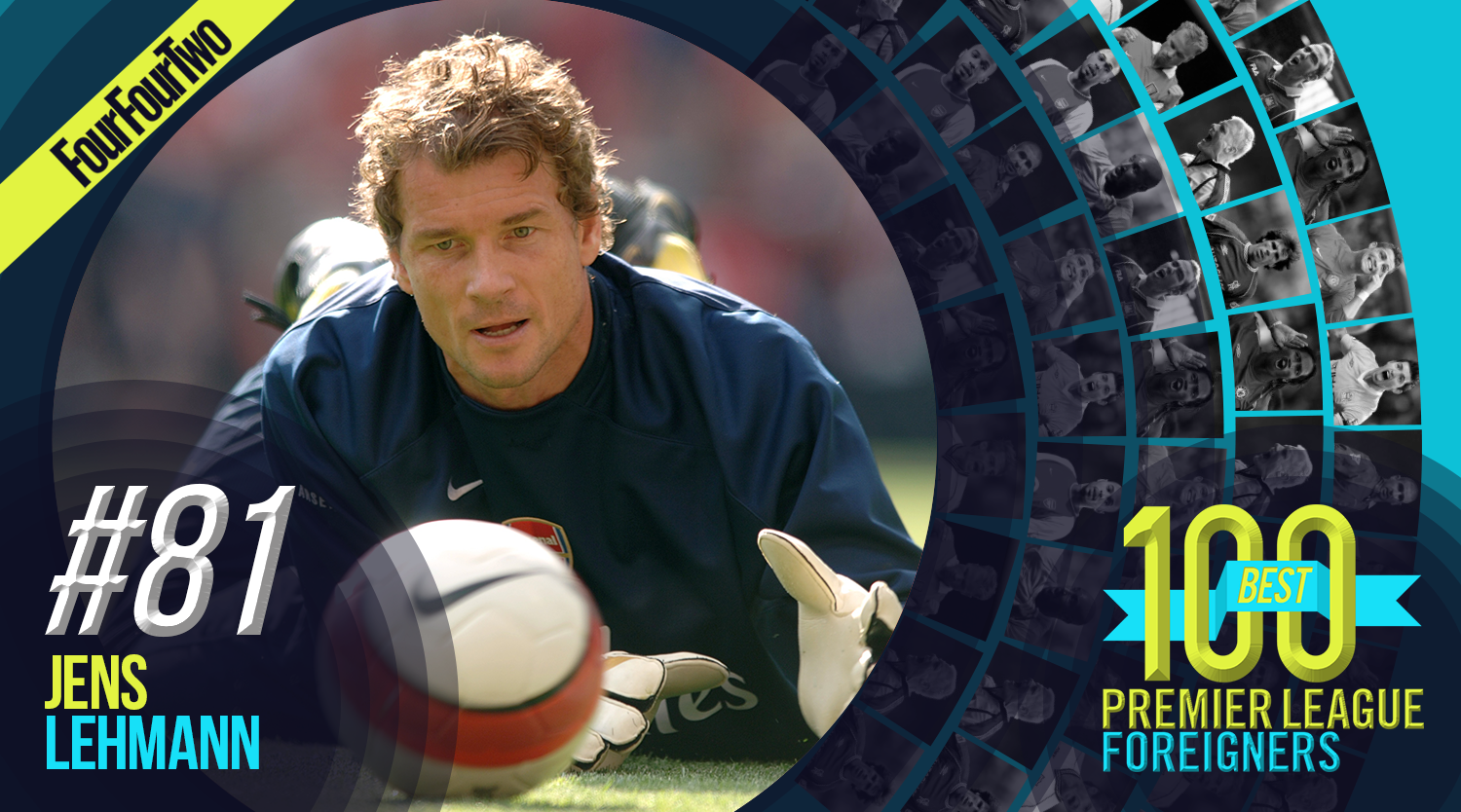
81. Jens Lehmann
Lehmann faced a daunting task when he inherited David Seaman’s Arsenal gloves in 2003. Yet the spiky German embraced the challenge of replacing a club legend and, in his first season, turned in admirably consistent performances between the sticks as the Gunners went through the 2003/04 campaign unbeaten.
Somehow he kept a rabid Manchester United at bay in 2005 as Arsenal won the FA Cup, and helped his team keep a record-breaking 10 consecutive clean sheets in Europe. Later, after returning to Germany, Lehmann came out of retirement in 2011 to help Arsenal during an injury crisis.
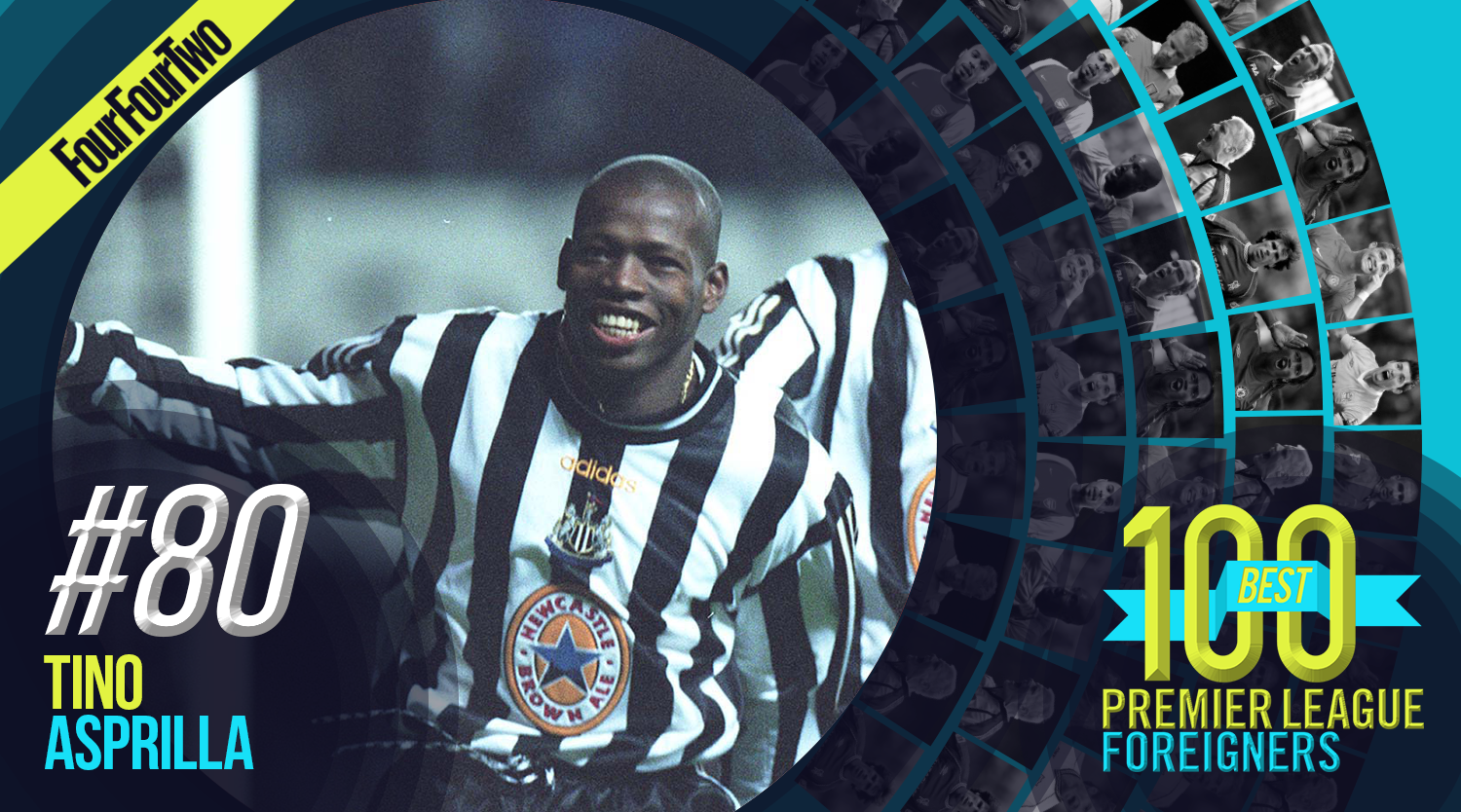
80. Tino Asprilla
The Colombian was blamed by many for Newcastle’s failure to convert a 10-point lead into title victory in 1995/96, but the somersaulting South American never paid much attention to the opinions of others.
Asprilla’s signing was supposed to be the cherry on top of Newcastle's cake, with his creative talents adding to those of Peter Beardsley and David Ginola. As it was, Asprilla was often the odd man out at St James’ Park, but life was rarely dull with him around and over two seasons in the northeast he wowed and frustrated in equal measure.
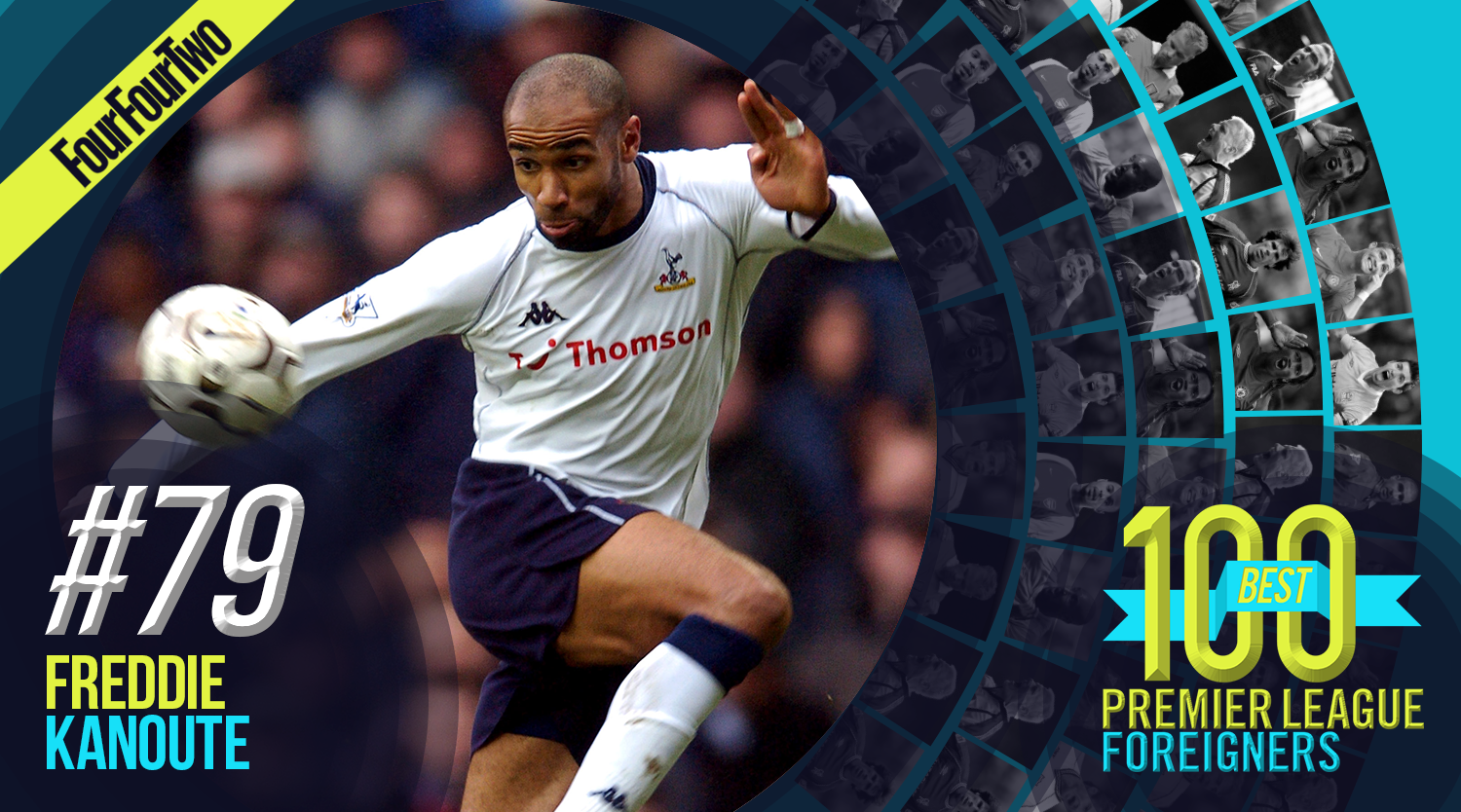
79. Freddie Kanoute
Memories of Kanoute’s time in England are tinged with questions of what might have been. The Malian left Tottenham after they attempted to block his participation in the 2004 Africa Cup of Nations, and Spurs fans radiated frustration as he scored freely for Sevilla while winning consecutive UEFA Cups.
But while he’d peak elsewhere, Kanoute was often a joy to behold in the colours of Spurs and West Ham, where he top-scored two years running. He had a broad range of talents and netted nine times in his first 11 appearances for Tottenham before the relationship turned sour.
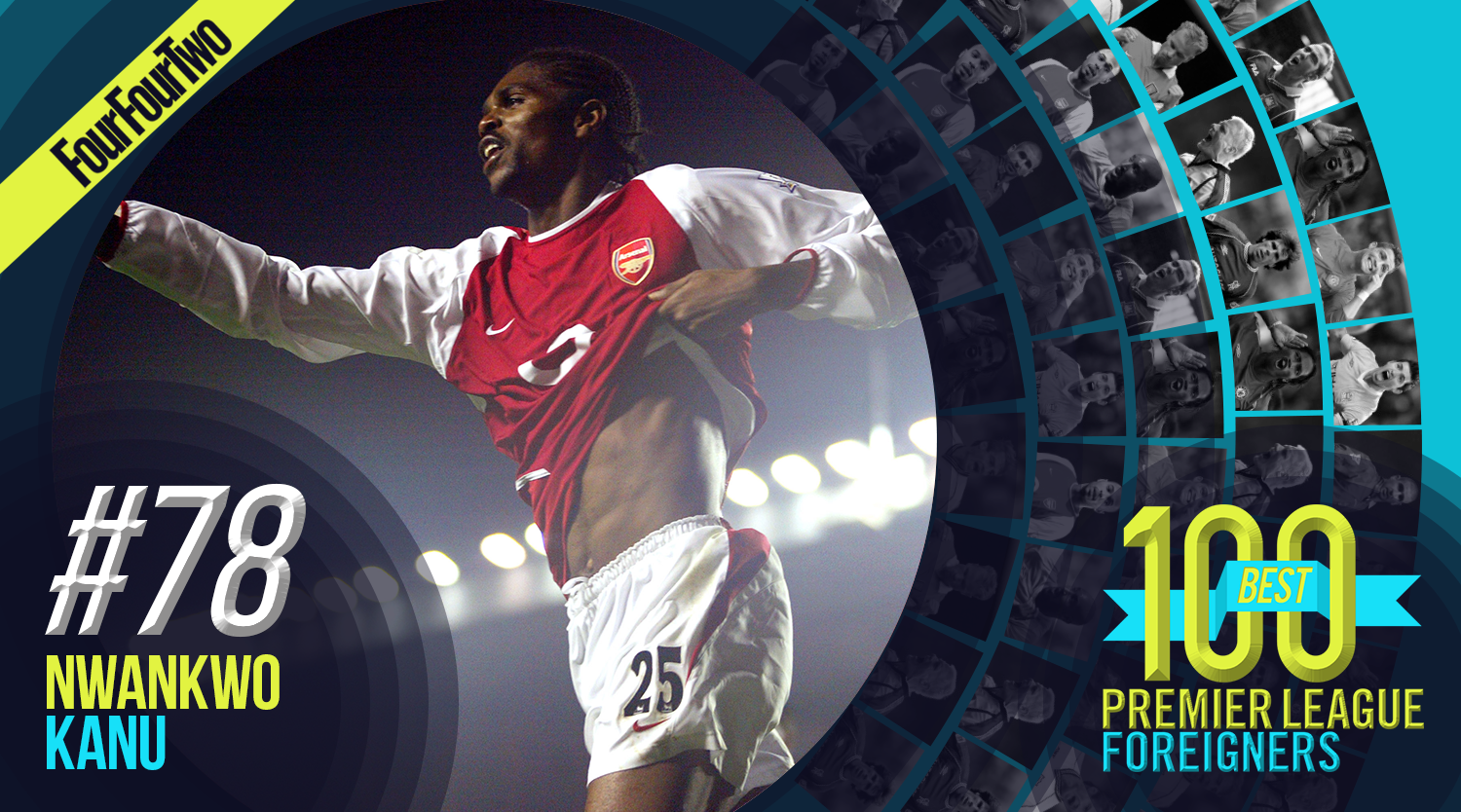
78. Nwankwo Kanu
The Nigerian with the telescopic legs was a bewitching force in the Gunners team during the early noughties, often teeing up Thierry Henry and Dennis Bergkamp with mind-boggling dummies and flicks. Many of his own Arsenal goals were also sublime, including a back-heeled volley at Middlesbrough in 1999 and a stupendous hat-trick at Stamford Bridge in his side's incredible 3-2 win.
Kanu demonstrated that there was life after Arsenal, too, netting the Wembley winner to help Portsmouth win the FA Cup in 2008.
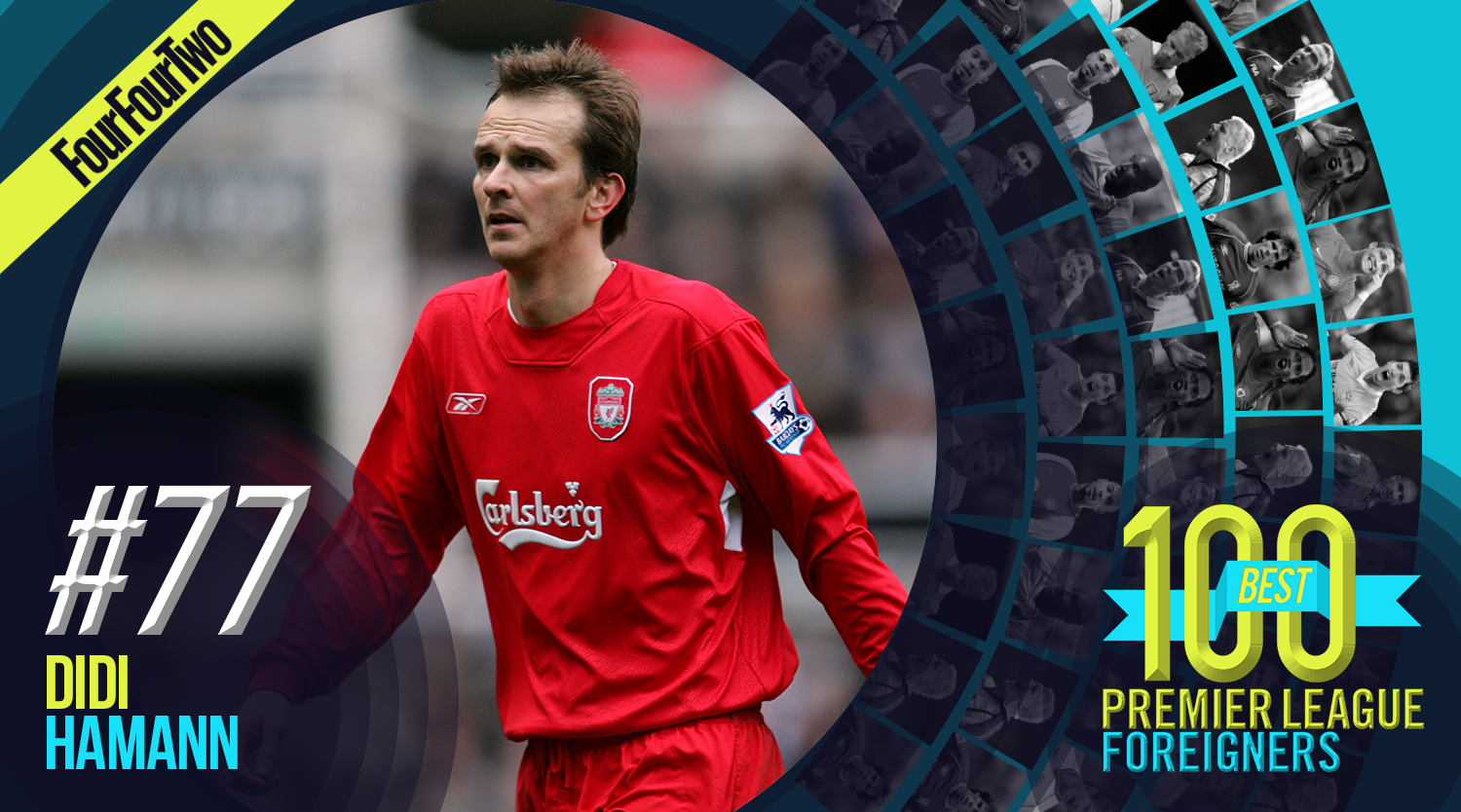
77. Dietmar Hamann
Not only did the German score the final goal at the old Wembley, he also played a key role in Liverpool’s noughties revival. Signed from Newcastle in 1999, the former Bayern Munich star kept things simple in the Merseysiders' midfield and allowed those in front of him to wreak merry havoc in both domestic and continental competition.
He won six major trophies with Liverpool over seven seasons, including the Champions League in 2005 and the 2001 UEFA Cup, before moving on to Manchester City and then, briefly, MK Dons. He later managed Stockport County.
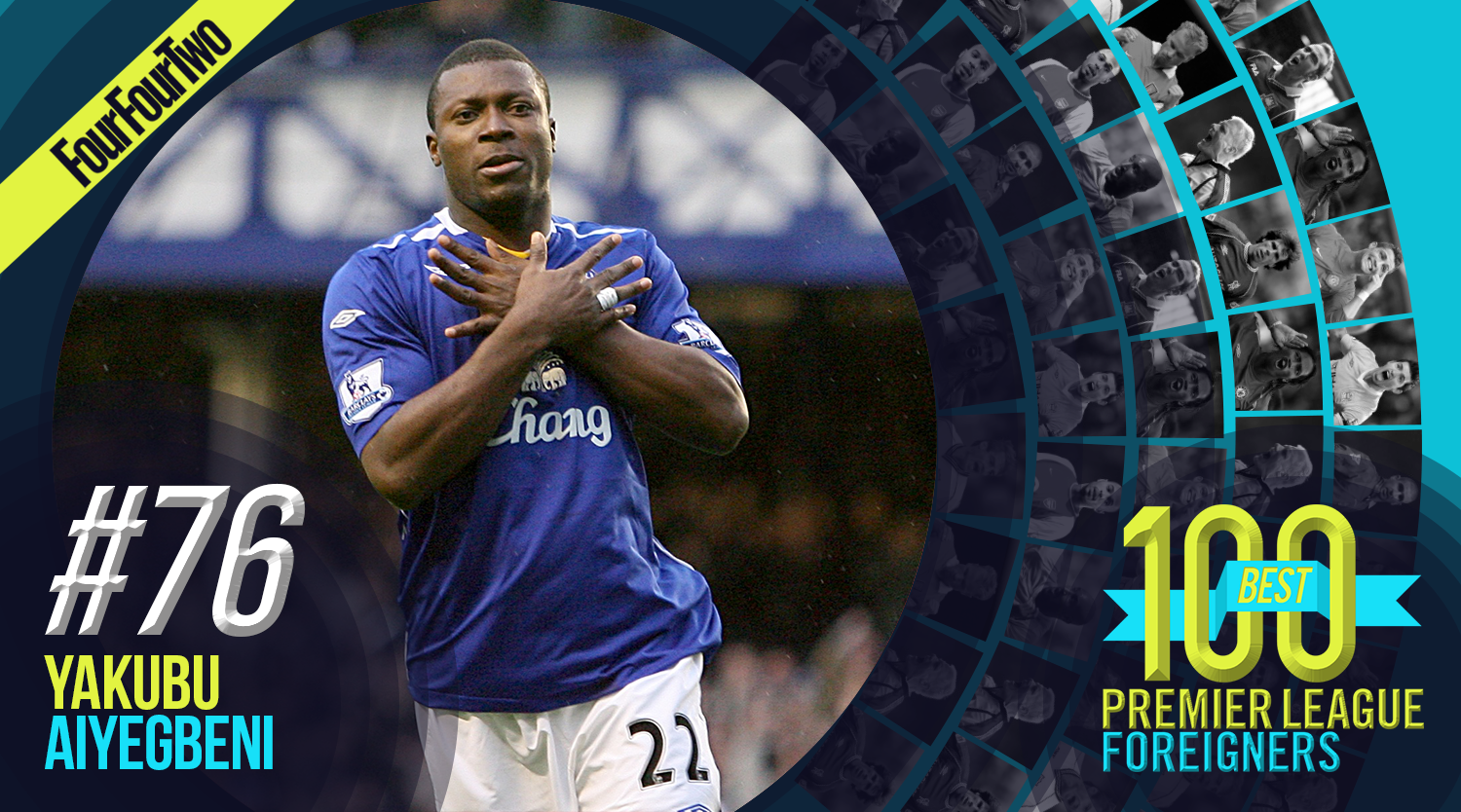
76. Yakubu
Yakubu's career – which encompassed stints at Portsmouth, Middlesbrough, Everton and Blackburn, and nigh on 100 goals – had him painted of something as a hired gun. But for those inclined to see things another way, mid-table journeymanship has a romantic element to it, too.
A knee injury at Everton interrupted his momentum while he was in the form of his career. But on he battled, dropping down a division with Leicester before returning in 2011/12 with 17 goals for a doomed Blackburn side during a last hurrah in the top flight.
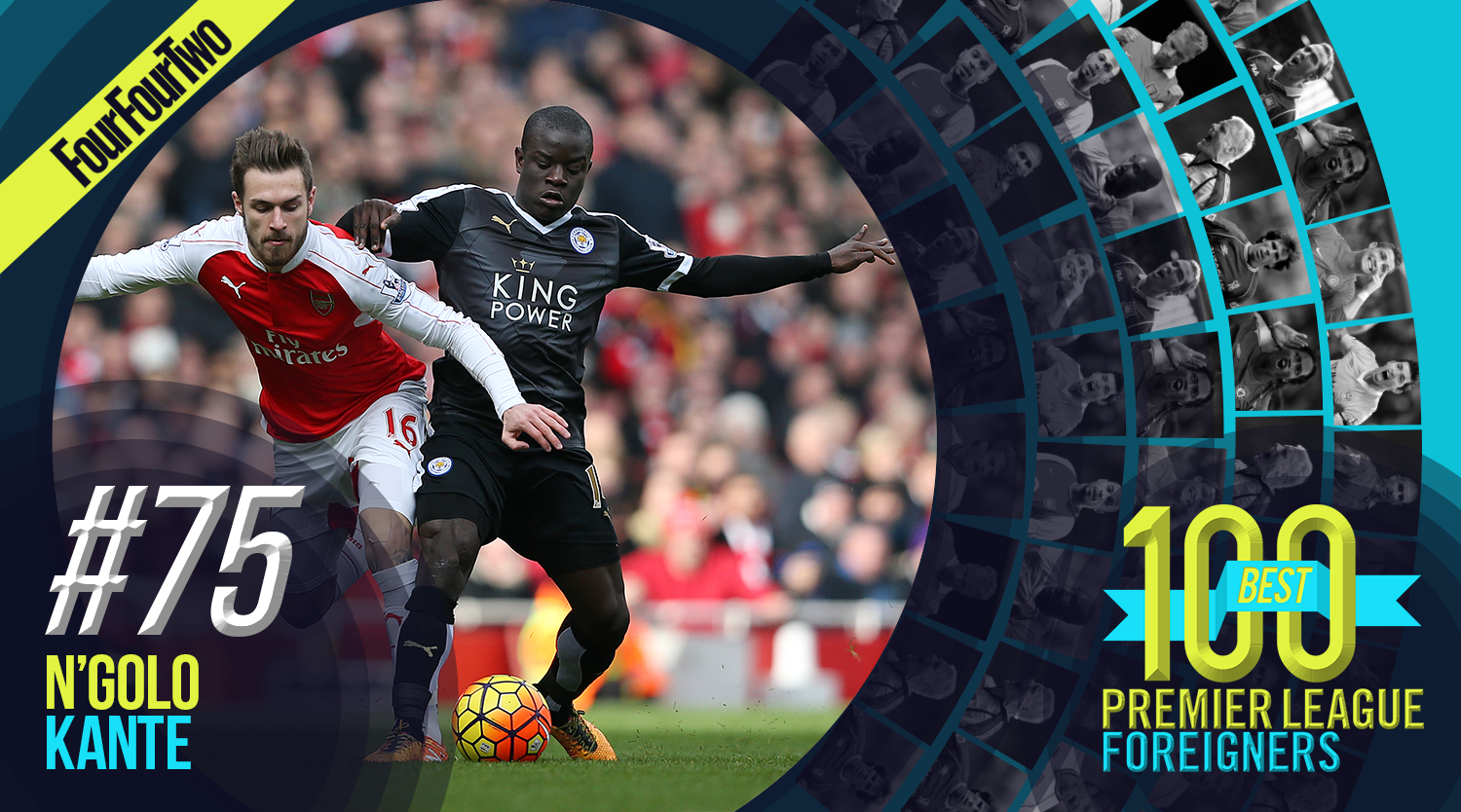
75. N'Golo Kante
Expectations were minimal when a boyish-looking midfielder rocked up at Leicester in summer 2015. But don’t judge a book and all that. Kante quickly established himself as a freakish force of nature who epitomised the rise of a Leicester team that shocked the world in 2015/16, haring around midfield like a Duracell bunny on speed.
The Frenchman was a statistical phenomenon who added quiet class in possession to his all-action defensive displays. Leicester couldn’t hang on to him for more than season, though, as Kante took his talents to Chelsea – where he promptly collected another league winner’s medal.
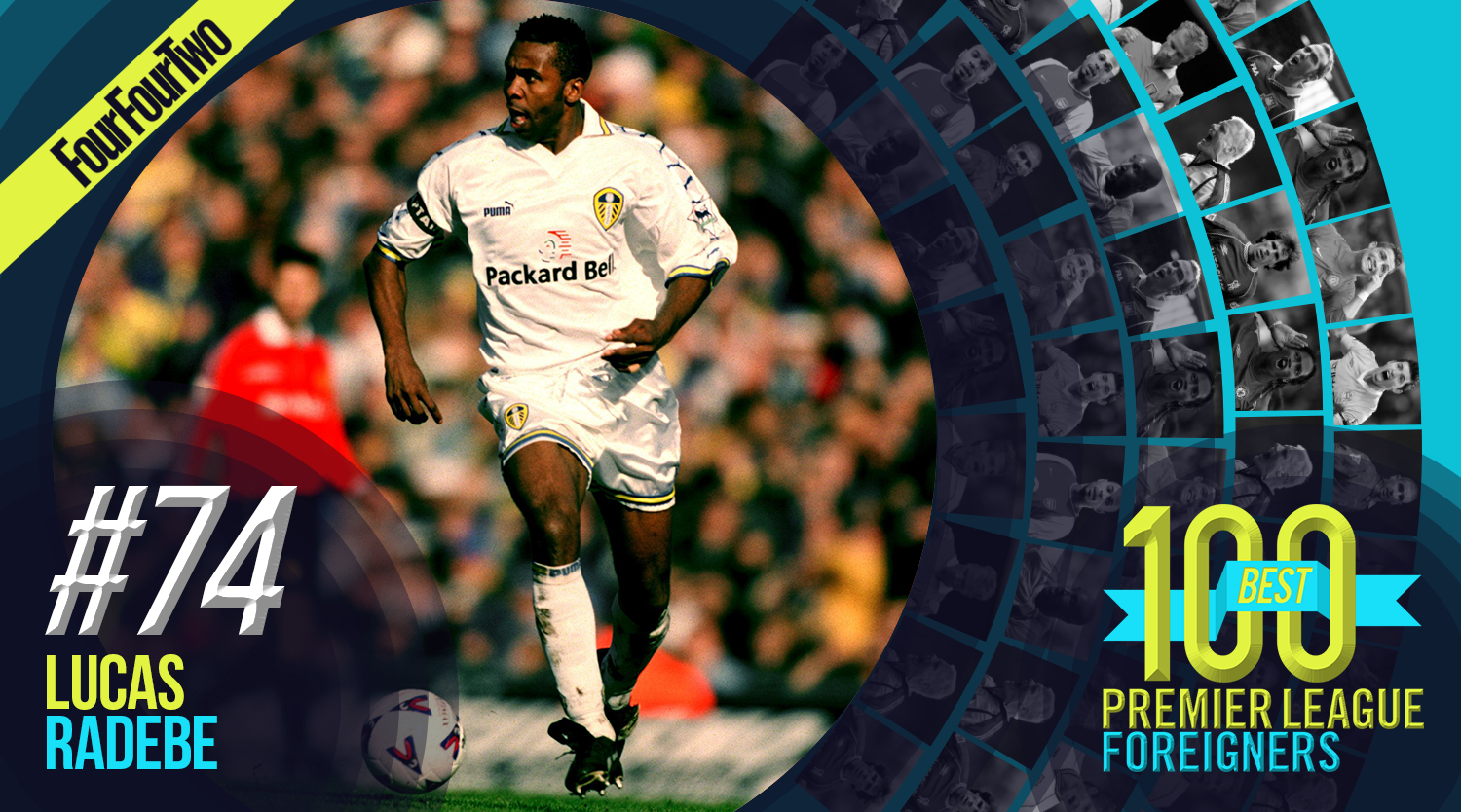
74. Lucas Radebe
Radebe arrived in Yorkshire from Kaizer Chiefs in 1994, and after a difficult start under Howard Wilkinson, remained at the club for over 10 years to establish himself as one of the Premier League’s most reliable centre-backs.
He skippered the young side that finished fourth in 1998/99, then third a season later before 2000/01's memorable run to the Champions League semi-finals (which injury cruelly robbed him a part of, and much of his career thereafter). He remains a true Leeds legend.
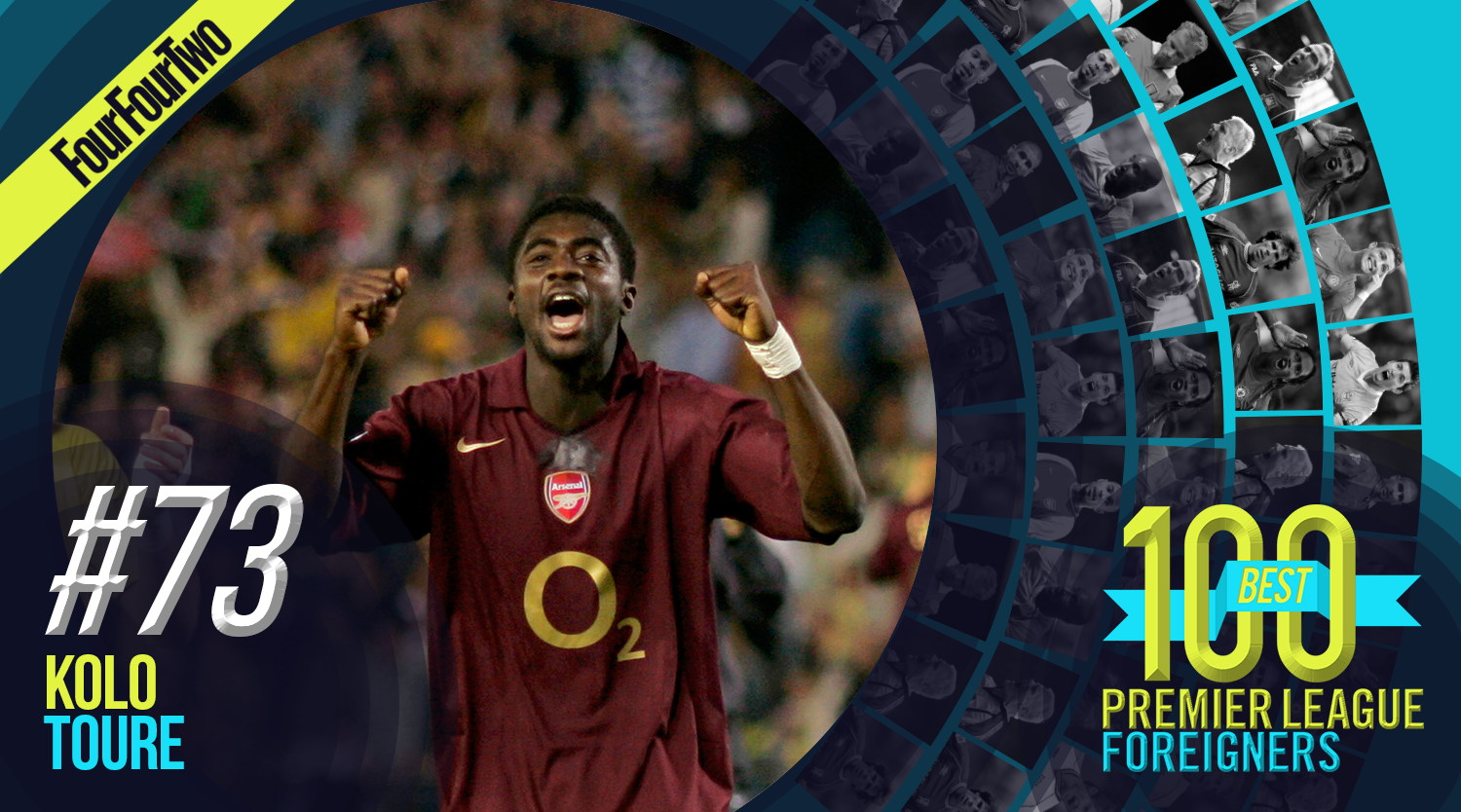
73. Kolo Toure
He should never have left Arsenal. A move to Manchester City in the summer of 2009 had obvious appeal, but Toure’s style of play was perfect for an Arsene Wenger team. Instead, he joined an upwardly mobile club whose recruitment strategy quickly rendered him a bit-part player.
At his best, the Ivorian was a highly modern, aggressive centre-half, which earned him a Premier League winner's medal in 2004. Having missed out on the 2003 FA Cup Final team, Toure was then able to taste success against Manchester United in 2005's edition.
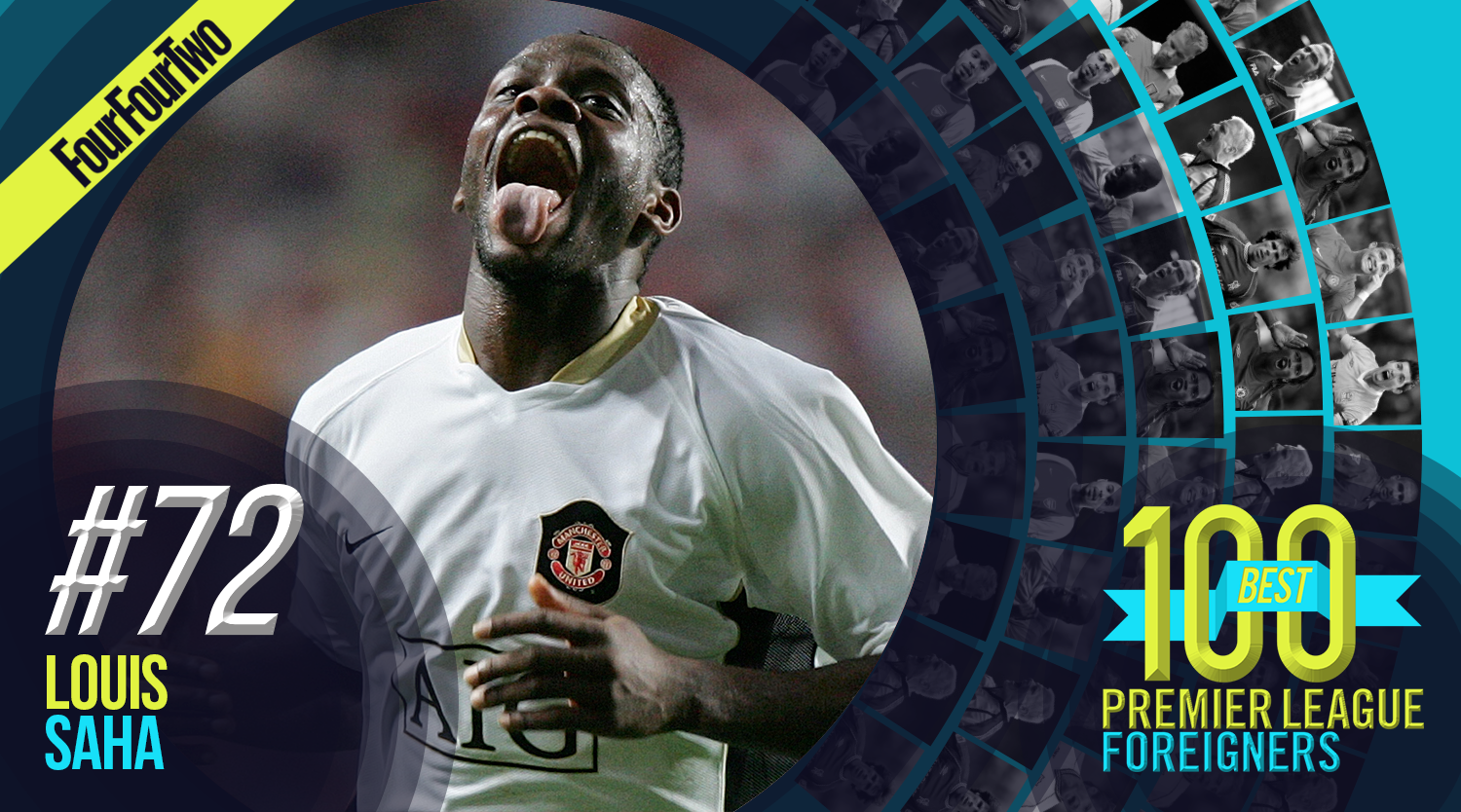
72. Louis Saha
Remember how he introduced himself to the Premier League? Two goals for Fulham away to Manchester United on the opening day.
However, Saha never truly became the top-flight forward he should have been. Talent took him to England's top flight and enamoured him to Sir Alex Ferguson, but the former Everton and Manchester United striker reached double figures just twice in 13 seasons.
His is a story of what might have been – or what should have been: Saha was a player of marvellous finesse, but that he's not higher on this list conveys just how fragile he was physically.
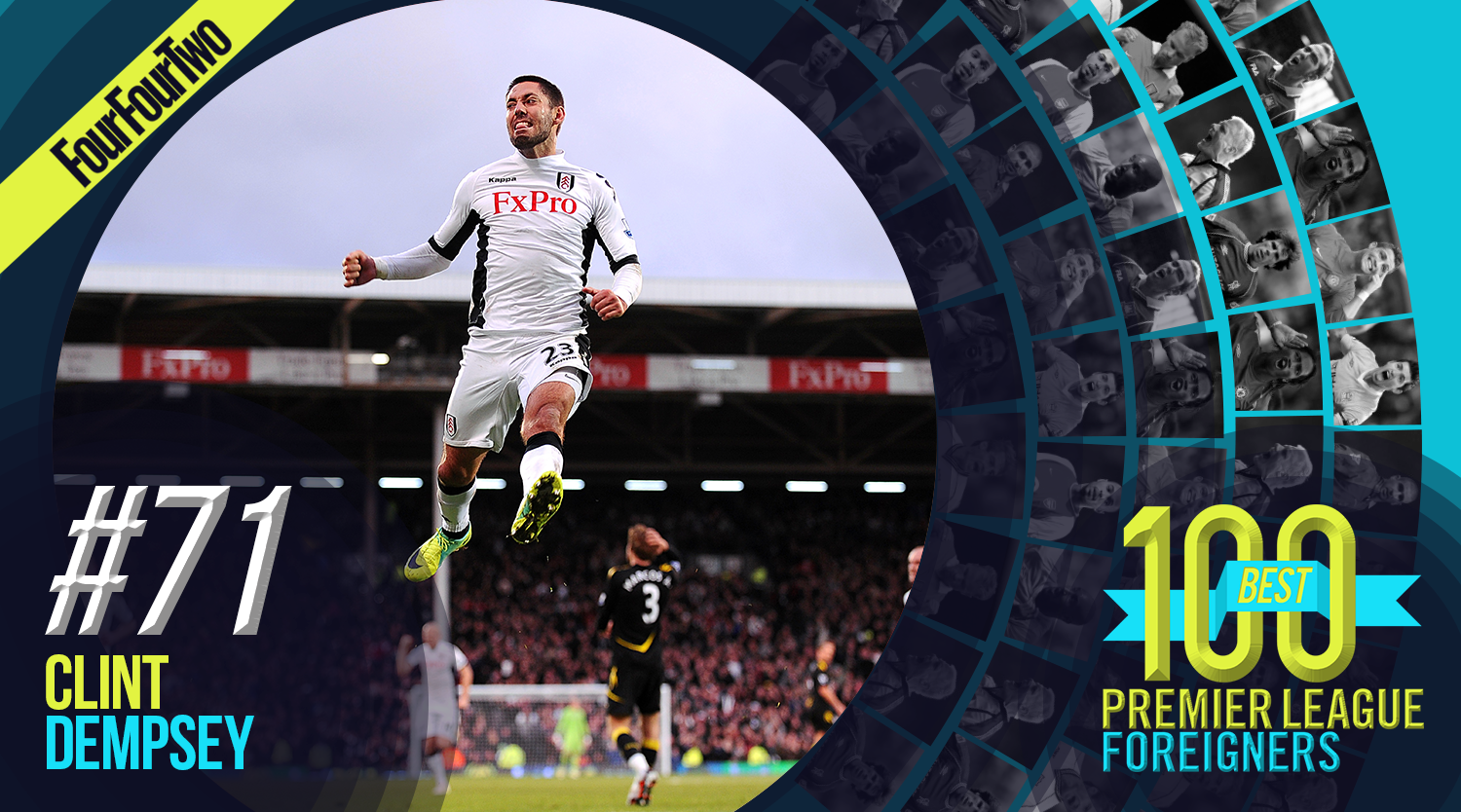
71. Clint Dempsey
At the time of Dempsey's arrival in 2007, very few American outfielders had enjoyed any success in England. Kasey Keller, Brad Friedel, and Tim Howard had carved out careers as goalkeepers and Brian McBride had been a physical forward presence at Everton and Fulham, but Dempsey was something of trailblazer. He wasn't the first to arrive, but he was the first to be truly respected.
In six-and-a-half years at Fulham – including a fabulously productive 2011/12 in which he netted 12 league goals – Dempsey made his claim to be the finest American to ever play in England.
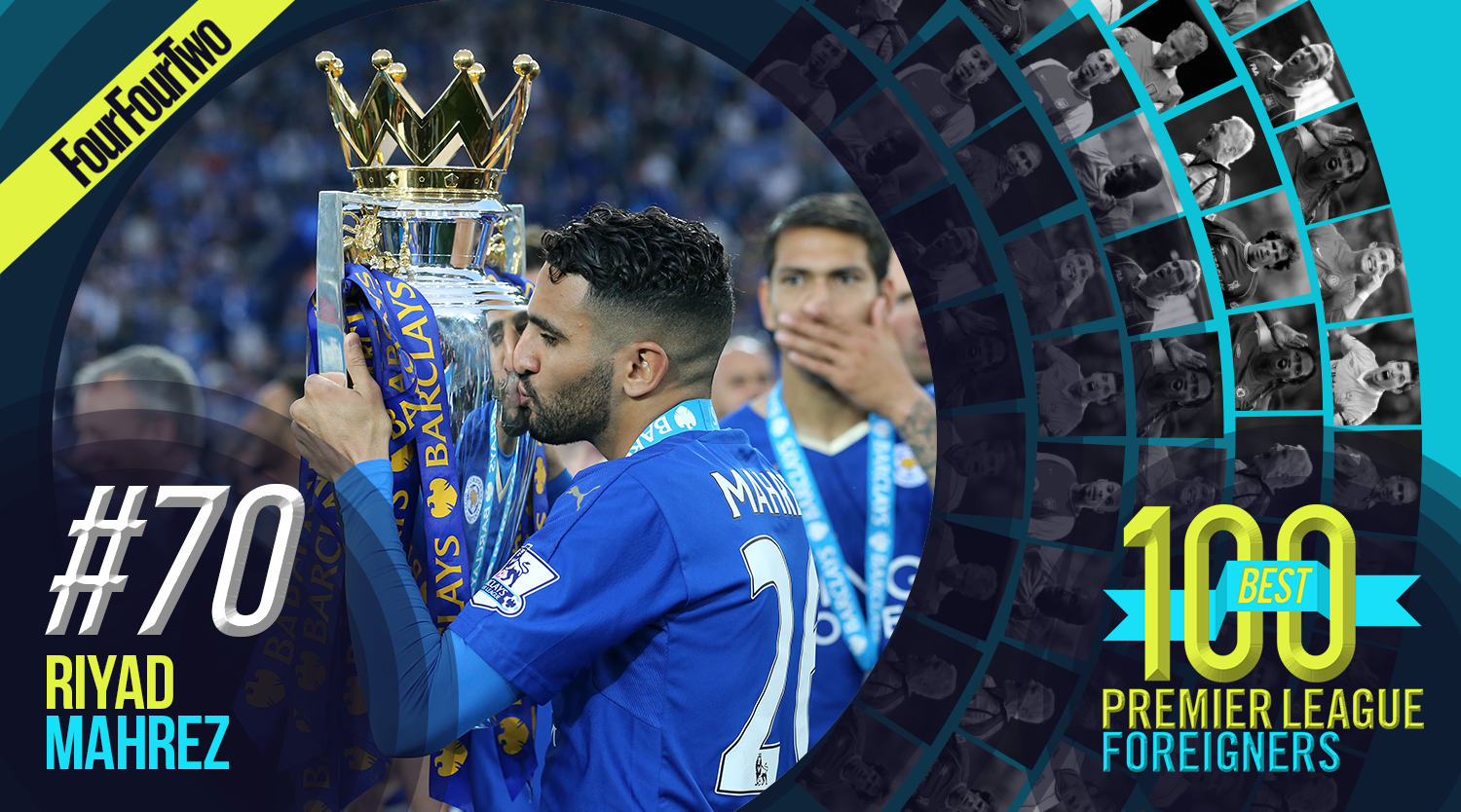
70. Riyad Mahrez
The wire-legged wideman was a dazzling force for Leicester in their triumphant season in 2015/16, netting four goals in the first three games and barely lifting his foot off the gas from there.
Mahrez was the man to manoeuvre his team beyond sticky situations; a hat-trick at Swansea was followed by a beautiful goal against Chelsea, then a brace at Everton which put Leicester top. By the end of the campaign, he’d been directly involved in 28 of the champions’ goals.
Mahrez failed to repeat the trick the following season, though, leading some to question whether 2015/16 was a one-off.
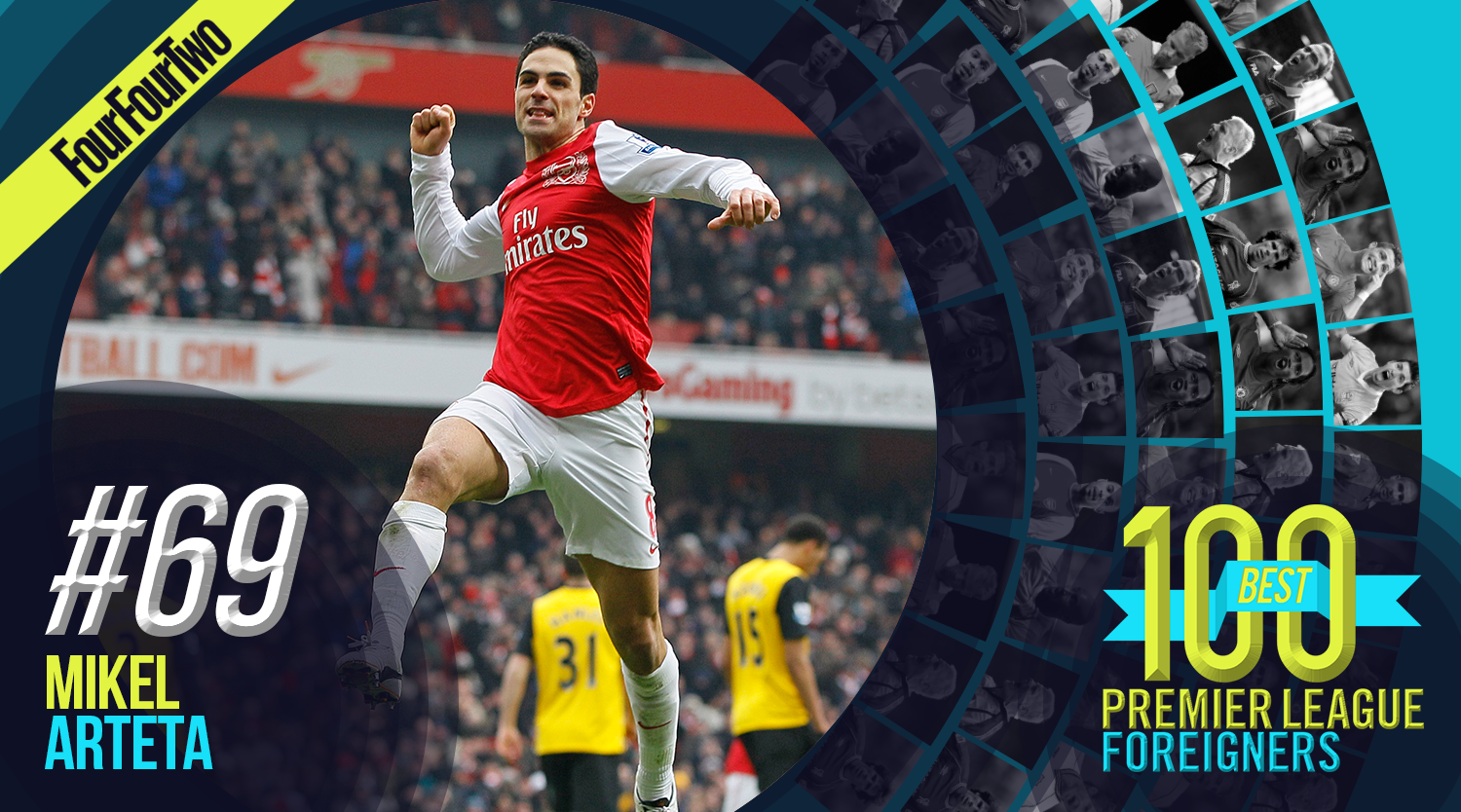
69. Mikel Arteta
Arriving at Everton in 2005, Arteta spent six successful years at Goodison Park in David Moyes's establishment-upsetting side before moving to Arsenal in 2011. The more dynamic parts of his game may have faded over time, but his later career was characterised by his care for the ball and his understanding for when – and how – to involve the more celebrated attacking talents surrounding him.
He was often maligned, as nearly every possession-focused player is by the mainstream, but Arteta was a highly watchable midfielder who played his steady percussion in England for nearly 12 years.
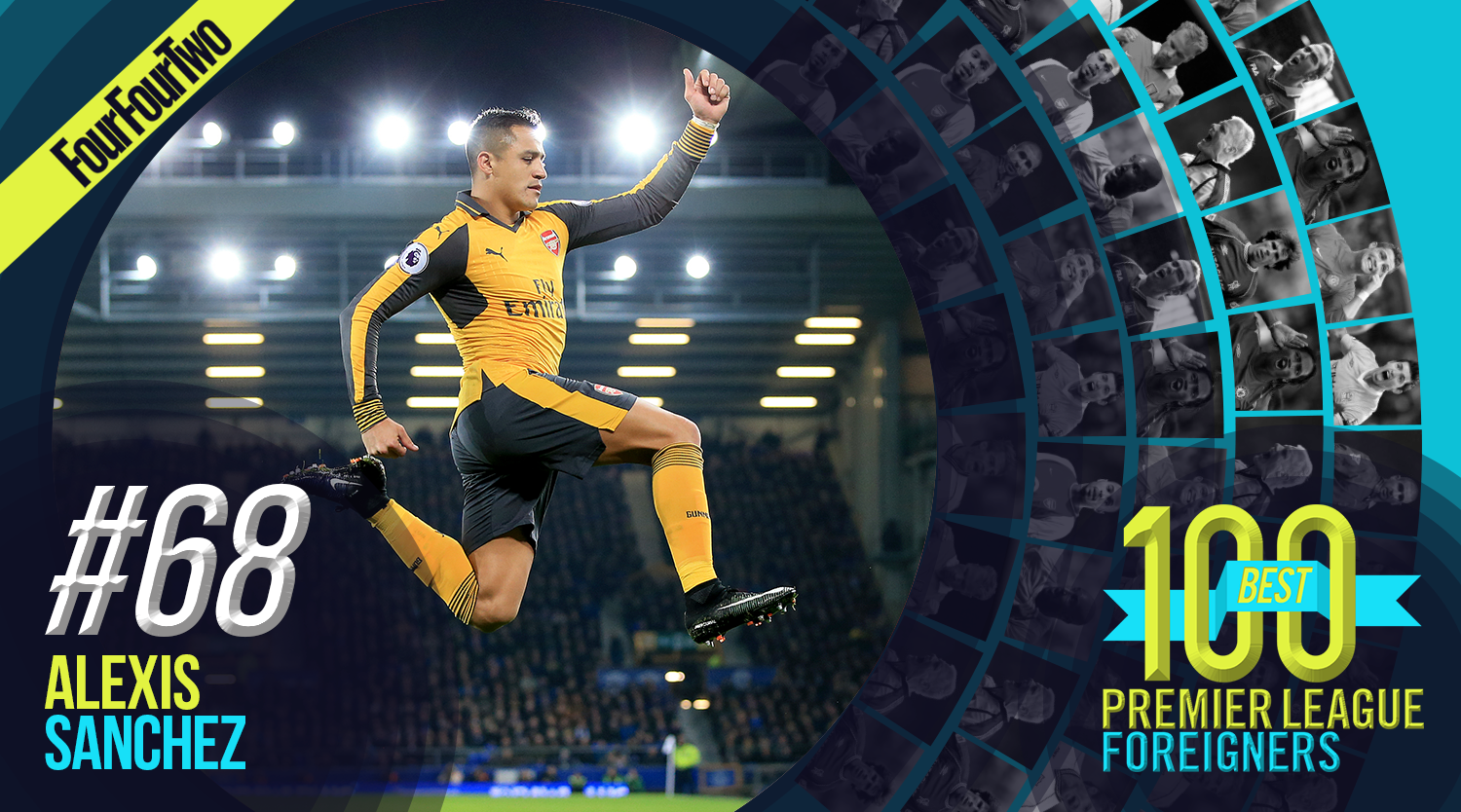
68. Alexis Sanchez
Ever since he joined Arsenal in 2014, the former Barcelona forward has been an explosive and dynamic force in his team's attack. Equally adept at playing out wide or more centrally, Sanchez has demonstrated the full range of his finishing skills at the Emirates, while his non-stop running helps lift supporters and team-mates alike.
His blistering goal against Aston Villa in the 2015 FA Cup Final guided Arsenal to victory, but Sanchez will need to win more silverware to be ranked alongside the likes of Thierry Henry and Dennis Bergkamp.
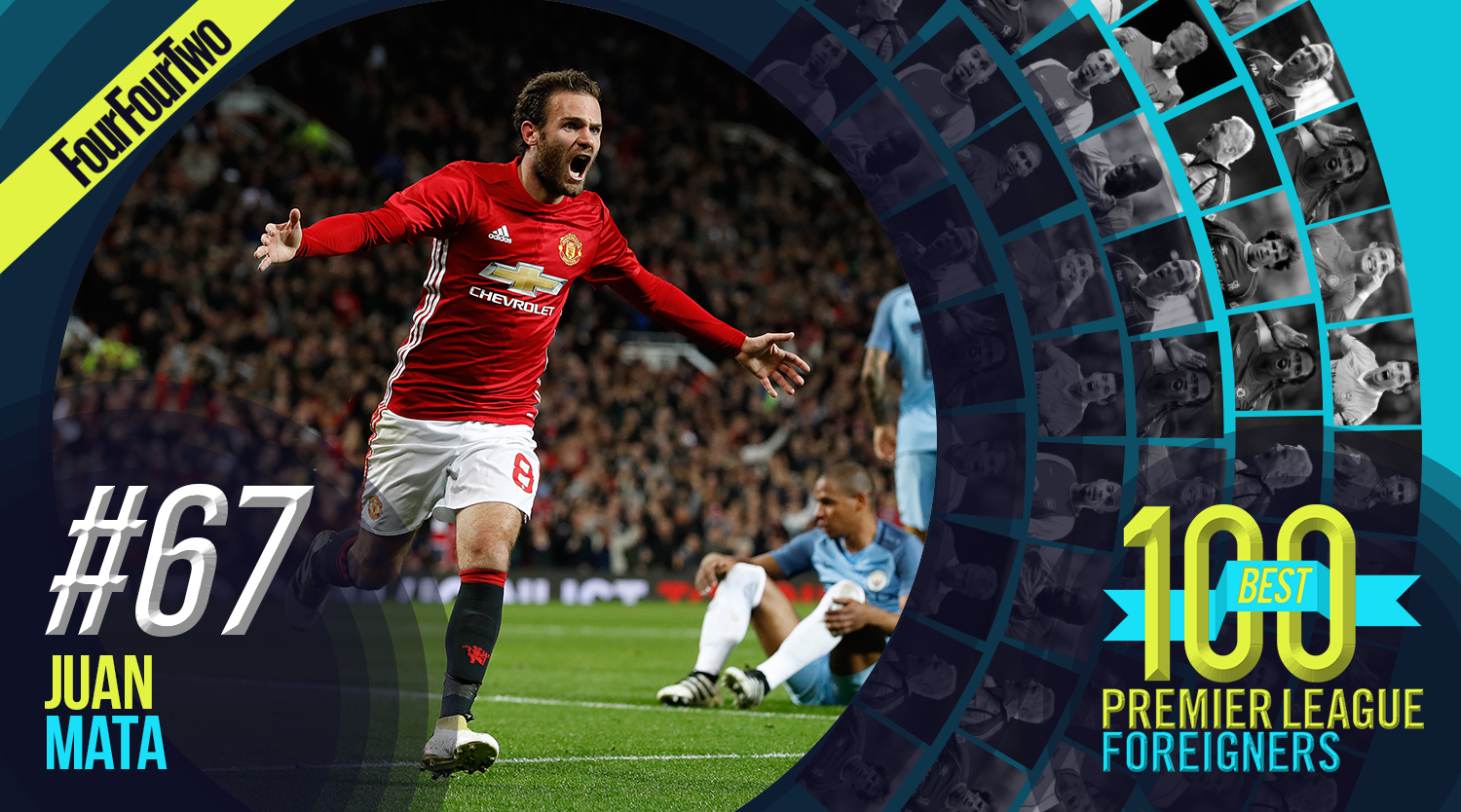
67. Juan Mata
Mata’s three years at Chelsea brought a European and FA Cup double and also a Europa League medal, before Manchester United paid a then-club record fee to take him to Old Trafford in 2014.
It was a strange transfer at the time, apparently animated by something other than pure footballing reasons, but even as United have stumbled on their way back to the top of the game he's produced some glowing moments: that goal at Anfield, for instance, could be watched on repeat for a long time.
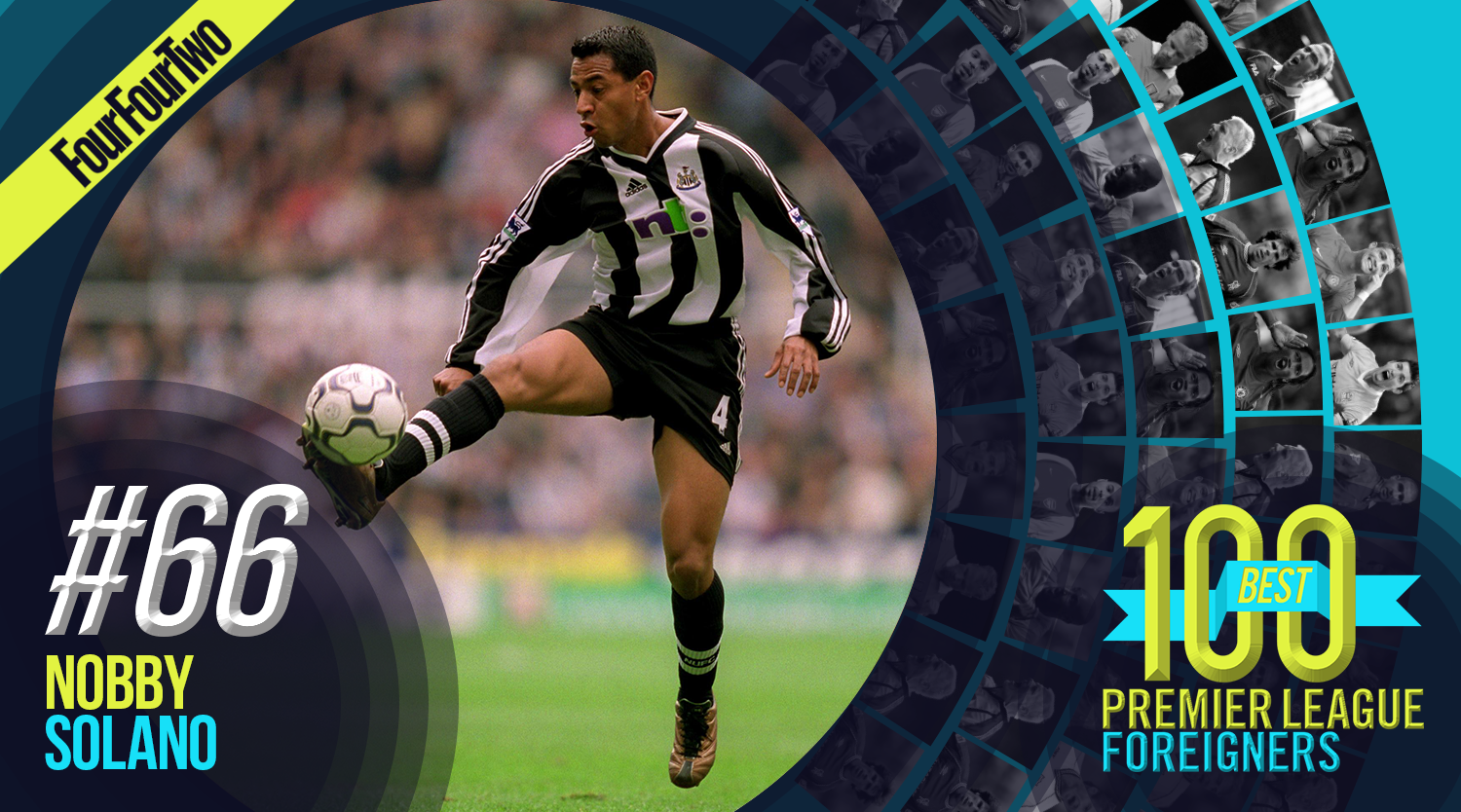
66. Nolberto Solano
The first Peruvian to play in the Premier League was a class act at Newcastle, before enjoying spells at Aston Villa, West Ham, Leicester, Hull and, erm, Hartlepool.
Solano threw himself into life in the northeast and remained a firm favourite throughout his two spells with the club. He was a regular goalscorer and carved out chance after chance for Alan Shearer with his industry out wide, while he was also a free-kick exponent of the highest class.
Widely respected throughout his Premier League career, Solano's one regret was the lack of silverware he managed to accrue.
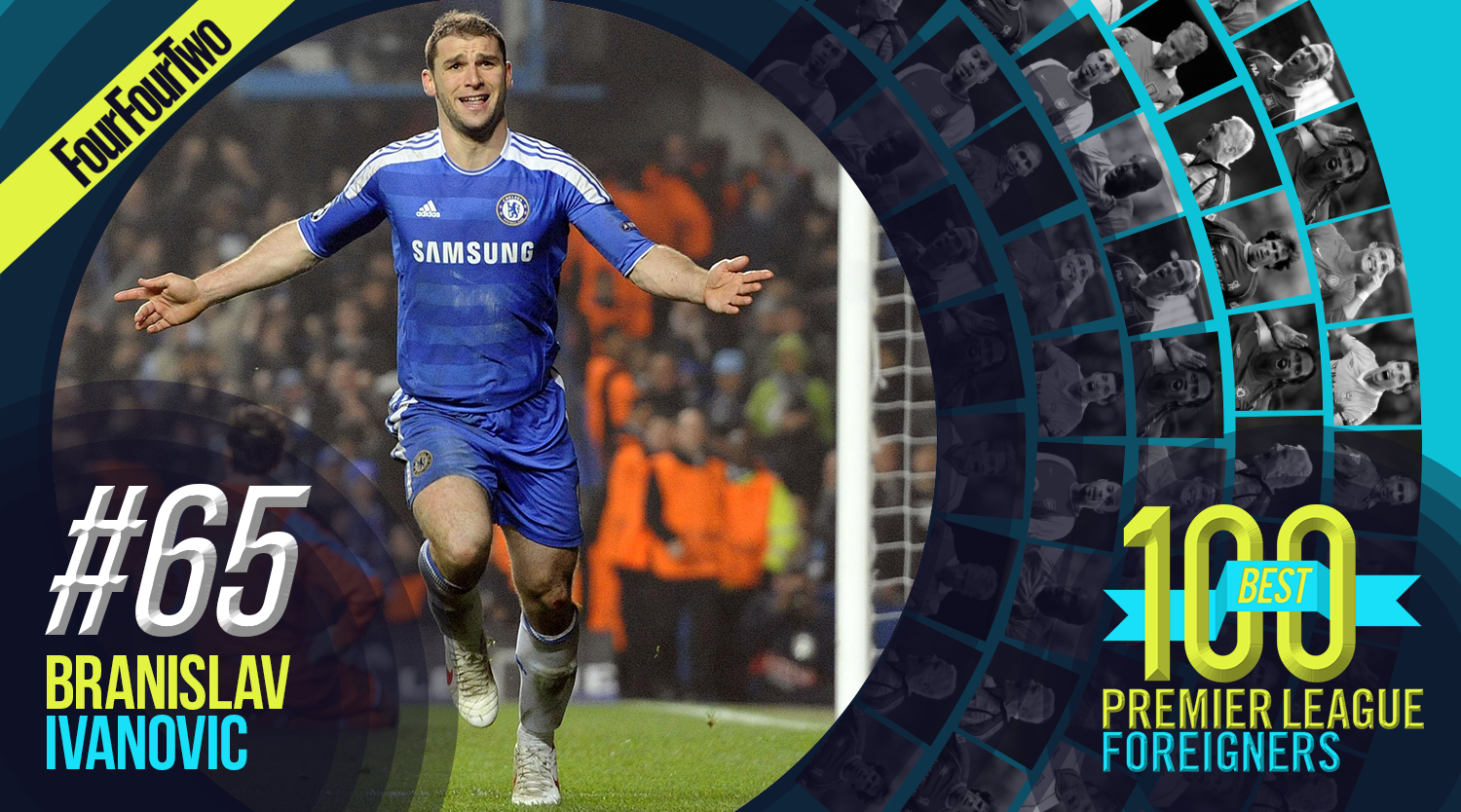
65. Branislav Ivanovic
Ivanovic may have struggled late on in his Chelsea career, but that shouldn't disguise what a useful player he was after arriving in 2008. A right-back who could play centre-half, or the other way around? Either way, he was excellent in both roles.
And the goals, too. Most famously, his header won the Europa League in 2013, but he also scored in the second-leg comeback against Benfica and was part of the mighty resistance in the Camp Nou en route to Champions League glory. He blended into the background, but Ivanovic was instrumental in much of Chelsea’s recent success.
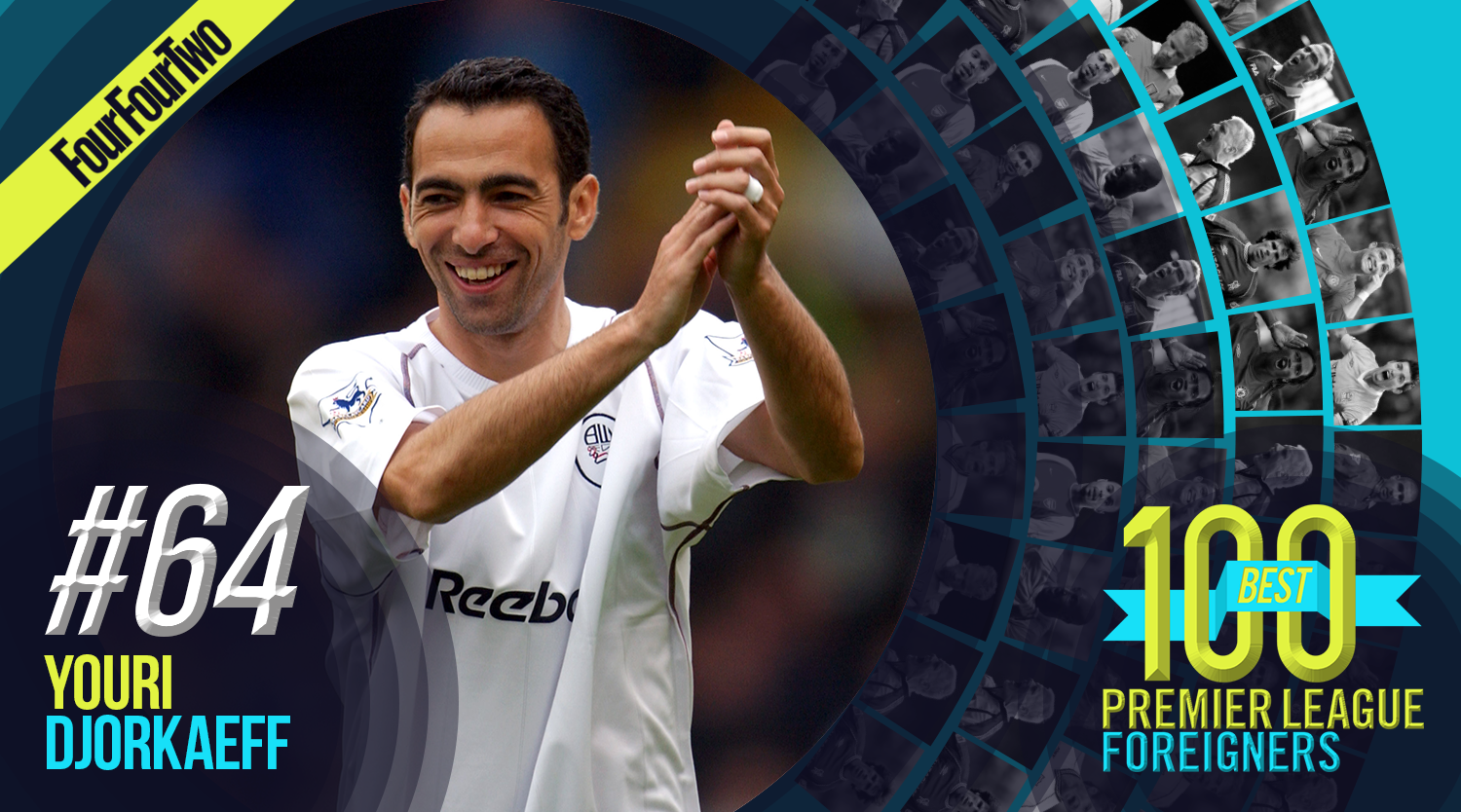
64. Youri Djorkaeff
Djorkaeff had been a star of the Bleus side which won the 1998 World Cup and Euro 2000, but he'd fallen badly out of favour at Kaiserslautern when Sam Allardyce made his move for the 33-year-old in February 2001, Bolton's first season after promotion.
The move worked for both parties – the player helped the club stay up, while the club helped the player win a place in France's 2002 World Cup squad. The former Inter star liked life at the Reebok so much that he stayed for another two seasons, before a brief spell with Blackburn.
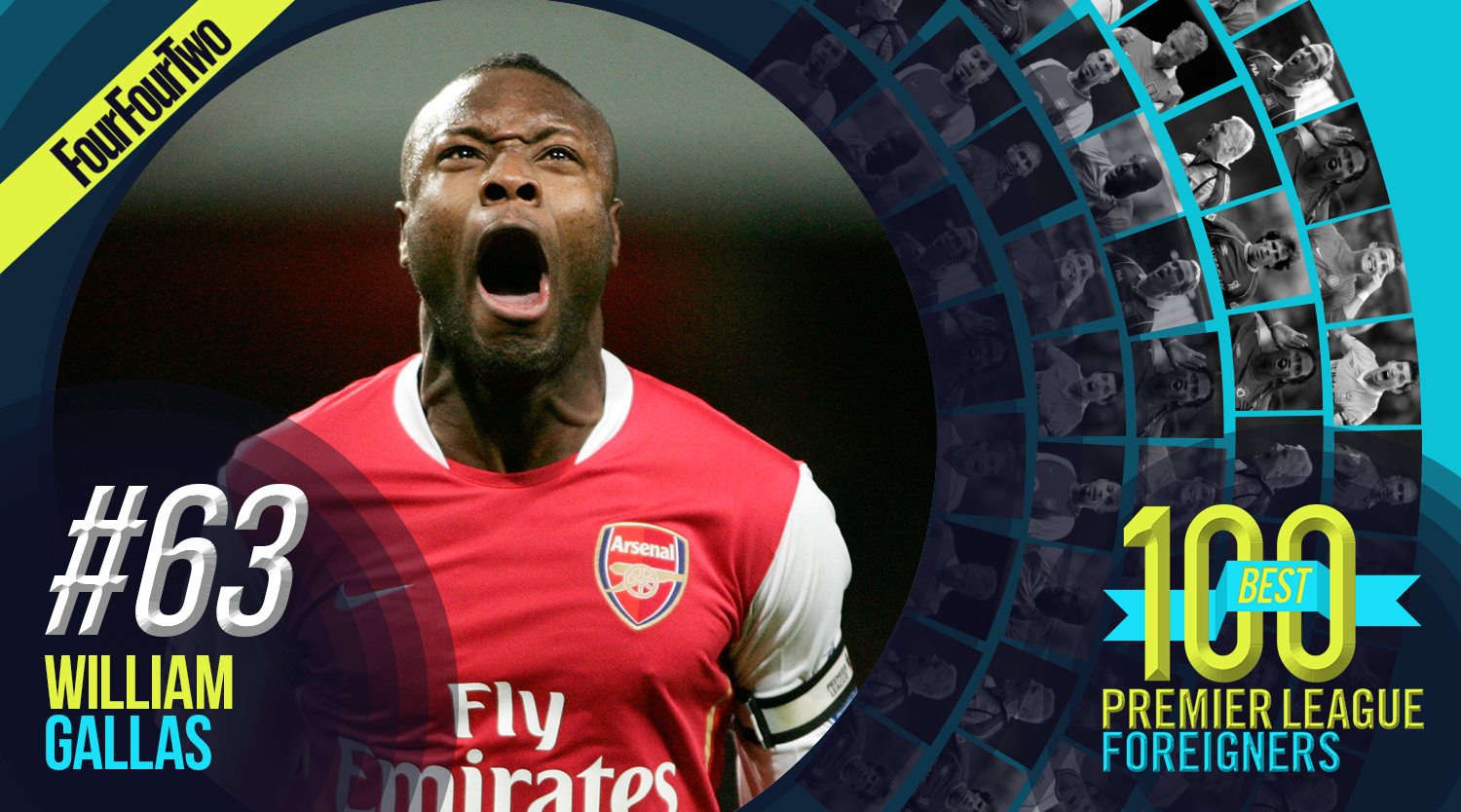
63. William Gallas
There's no escaping the fact that Gallas’ Chelsea exit damaged his legacy and tarnished his reputation; the events leading to that transfer to Arsenal are still disputed, but it certainly wasn't his most professional moment. It's a shame, because he was a pivotal part of Chelsea's ascension and yet rather needlessly involved himself in the Gunners’ mid-decade stagnation.
Gallas ended his Premier League career at Tottenham, thus ensuring he could never be truly trusted by fans of his previous clubs. Yet that shouldn’t deflect from what he was as a player: combative, competitive and – occasionally – capable of being impassable.
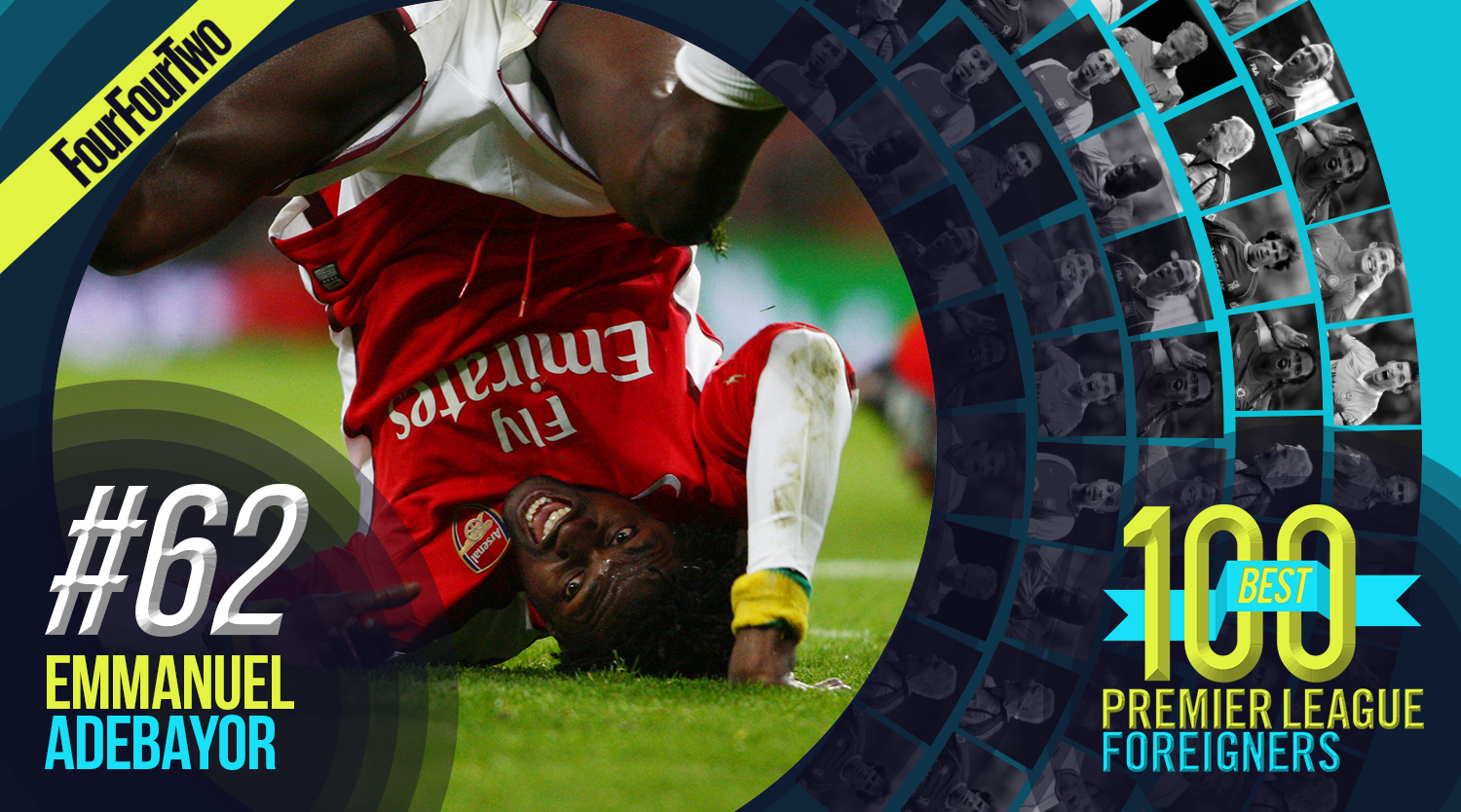
62. Emmanuel Adebayor
Controversial and outspoken, Adebayor isn't exactly worshipped at any of his four former Premier League clubs: Arsenal, Manchester City, Tottenham or Crystal Palace. On his day, though, the Togo international was almost unstoppable.
Tall, powerful and with a surprisingly delicate touch for a big man, he scored goals aplenty at the Emirates before departing to moneybags City, where his celebration after scoring against his former club incensed Arsenal fans in 2009. At White Hart Lane, he became infamous for his gargantuan wage as Tottenham tried to offload him, while he was a shadow of his former self at Palace.
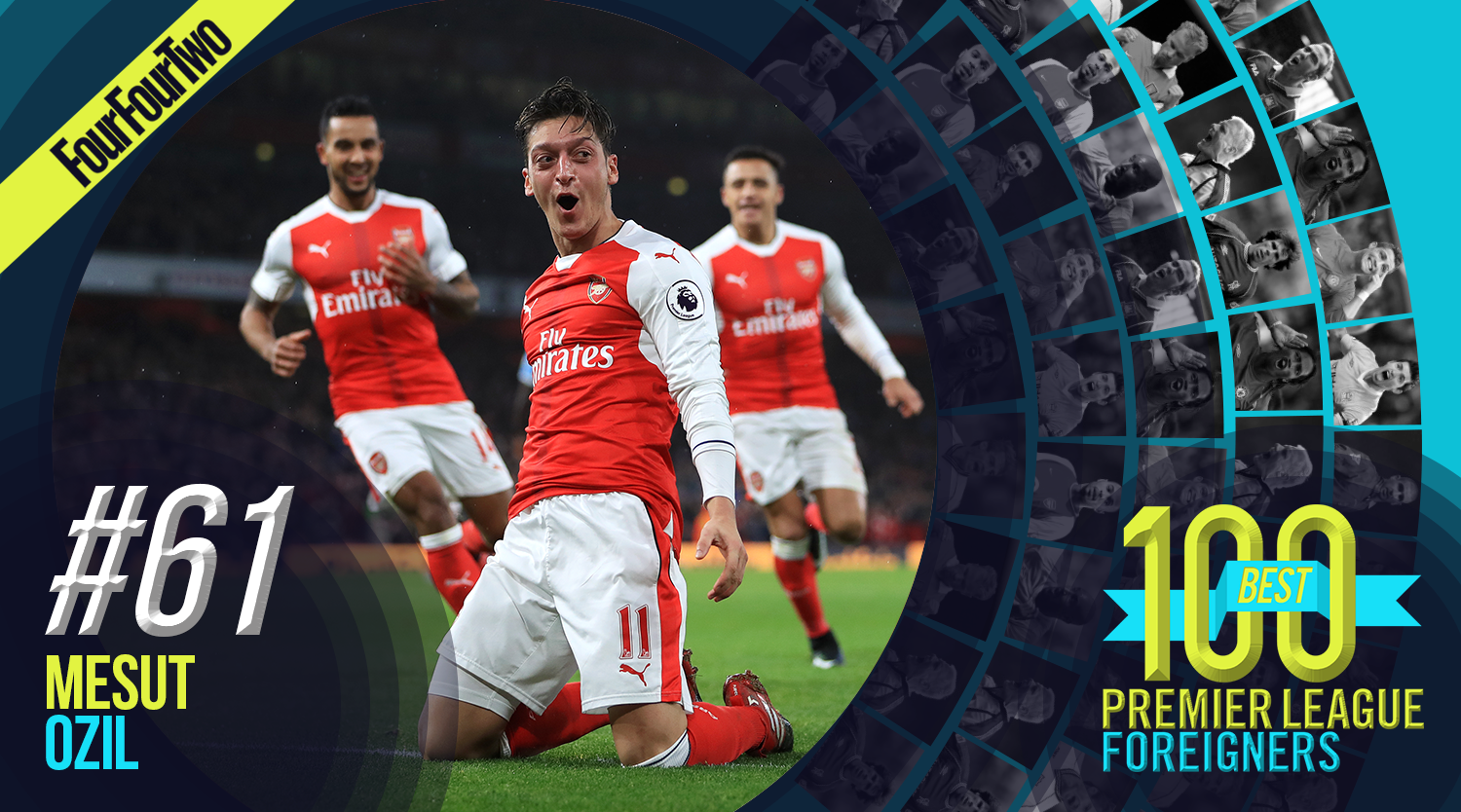
61. Mesut Ozil
How will history treat Ozil's career at Arsenal? Over time, will all the acrimony melt away and will the more facile criticisms fade to silence?
Hopefully, because despite the occasionally anaemic performance, Ozil has regularly been a fabulous garnish on Premier League life. He's an acquired taste and perhaps someone who doesn't quite fit the English culture, but his deft subtlety has nevertheless left an imprint on the division.
His assists have often been fetishised and some of his defenders can be a little cultish, but there are few players in Arsenal's history who have embodied craft with such purity.
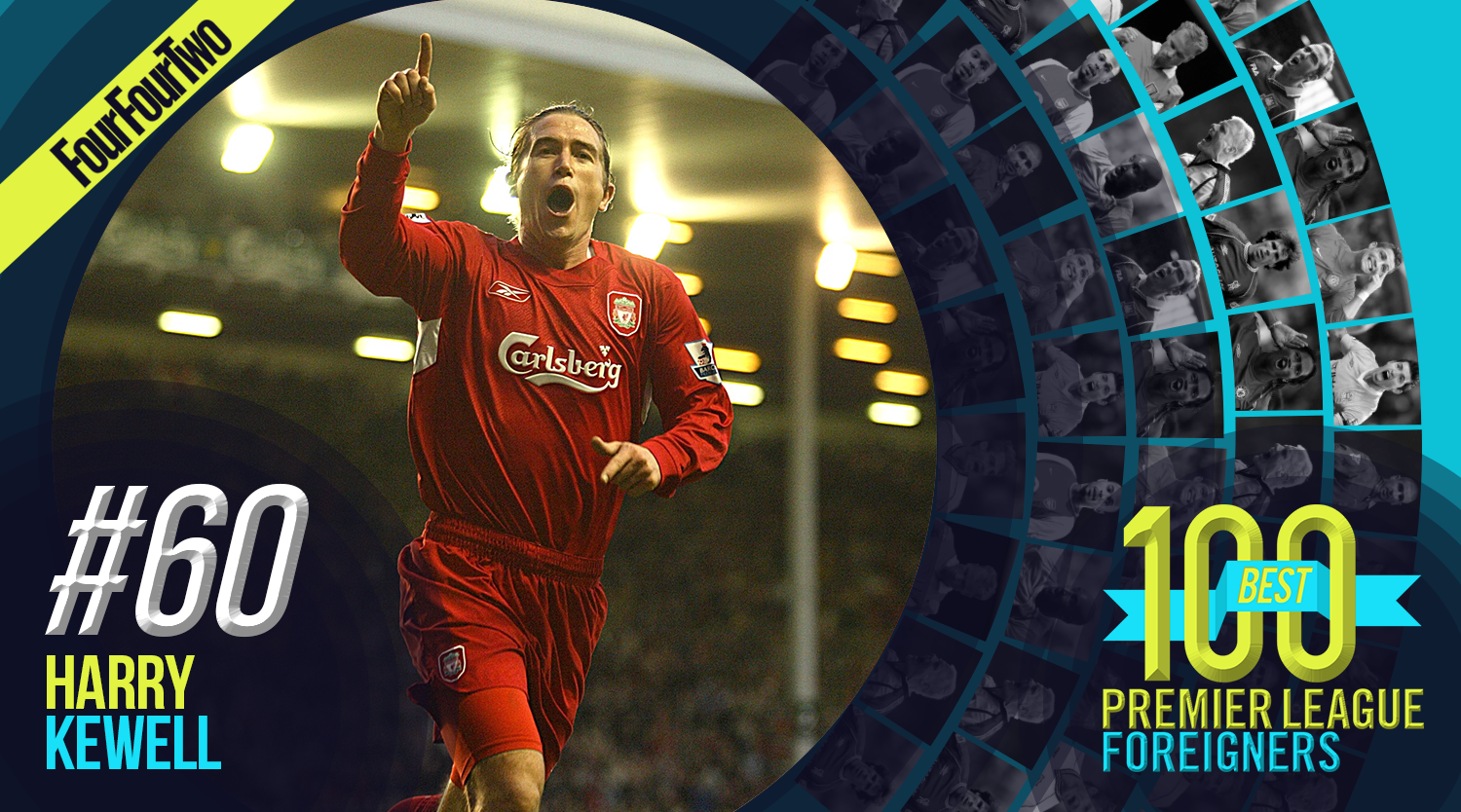
60. Harry Kewell
Having starred as the crown jewel in a Leeds side bursting at the seams with thrilling youngsters, Kewell's move to Liverpool in 2003 carried the expectation that he would provide the missing link between midfield and attack that could transform Gerard Houllier's promising side from contenders to conquerors.
Things didn't quite turn out that way, with his time an Anfield largely blighted by various ruinous injuries. But his 13 years in England's top flight bore plenty of fruit – not least some truly spectacular goals.
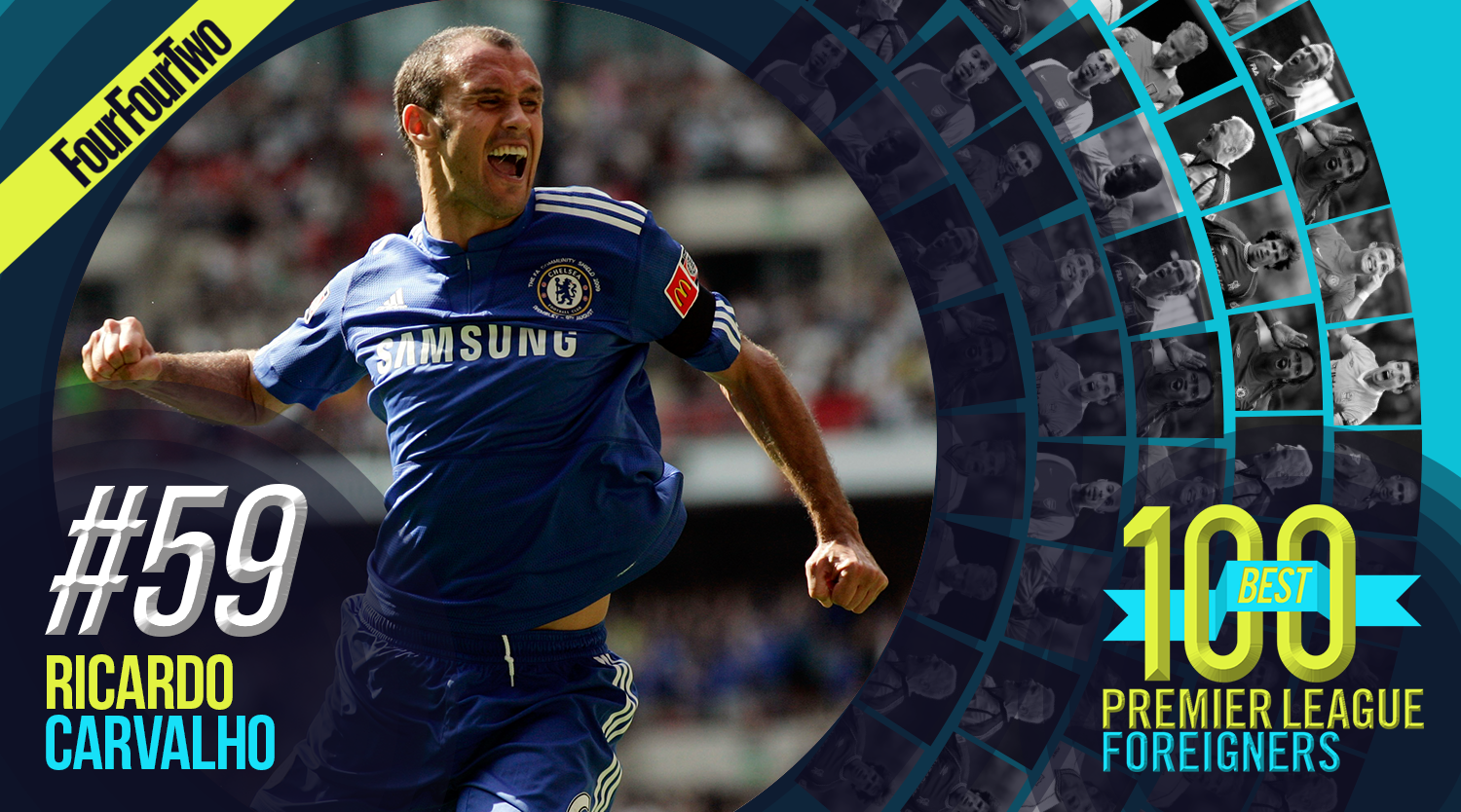
59. Ricardo Carvalho
Part of Jose Mourinho's hand luggage when he took the Chelsea job in 2004, Carvalho arrived as a European champion and spent the next six years showing why.
The value of the transfer was that it created such a complementary partnership with John Terry. Carvalho was the pace, Terry the positioning; it was that basic contrast which made them so successful.
The duo were the foundations of a defence that shipped 15 goals in 2004/05, and only 47 combined in the two seasons following that. That brought three Premier League titles, four FA Cups and two League Cups.
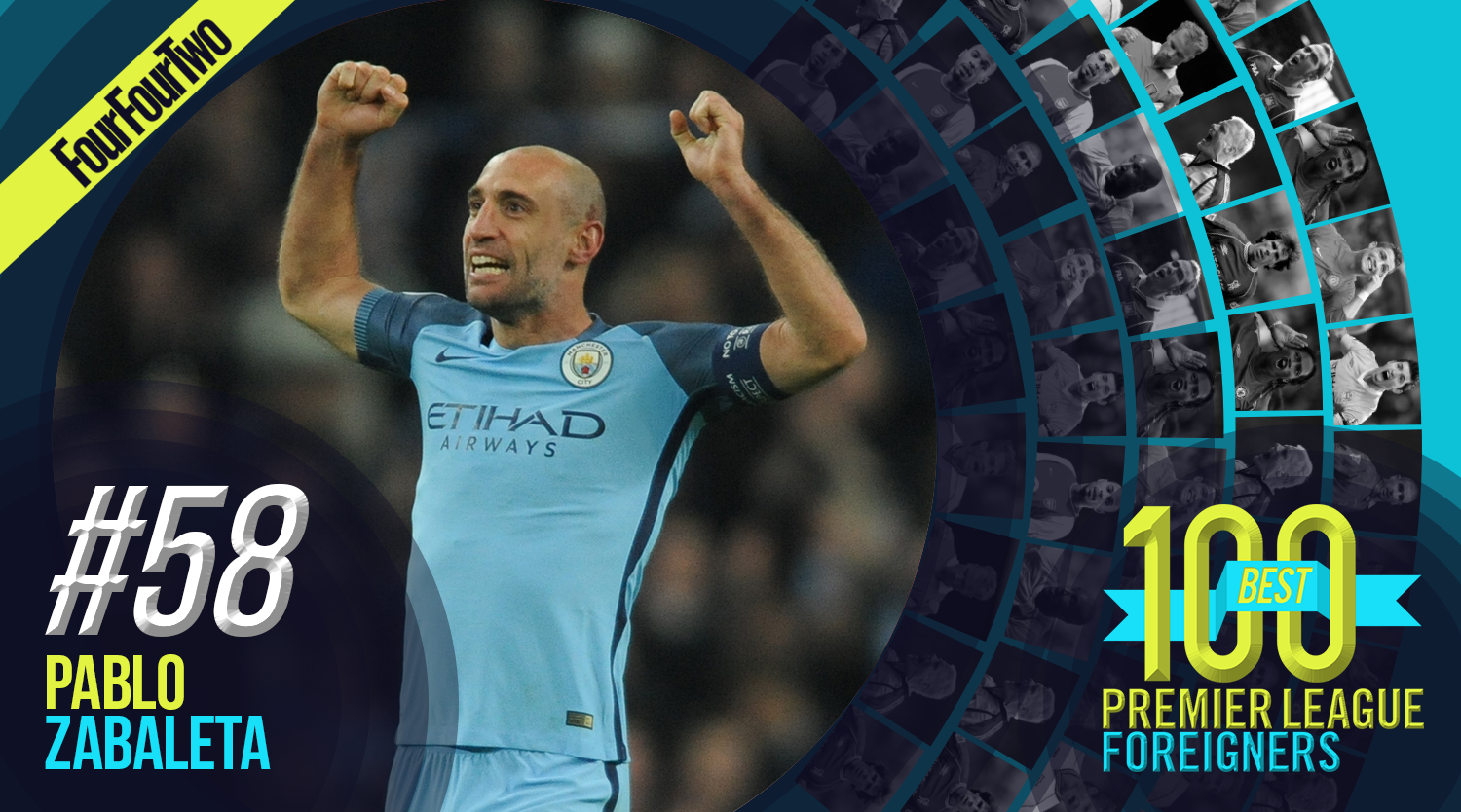
58. Pablo Zabaleta
As well liked for the man he is as the player he so often was: Zabaleta is still Manchester City royalty, despite his summer switch to West Ham.
The modern full-back is typically all pace and attacking threat, but Zabaleta carved his reputation from being good at almost every part of the game. Tactically outstanding – notice how he was always in the right place at the right time – the Argentinian was arguably the Premier League's finest right-back between 2012 and 2015. The continuity he provided was integral to the functionality of both the championship-winning sides he played in.
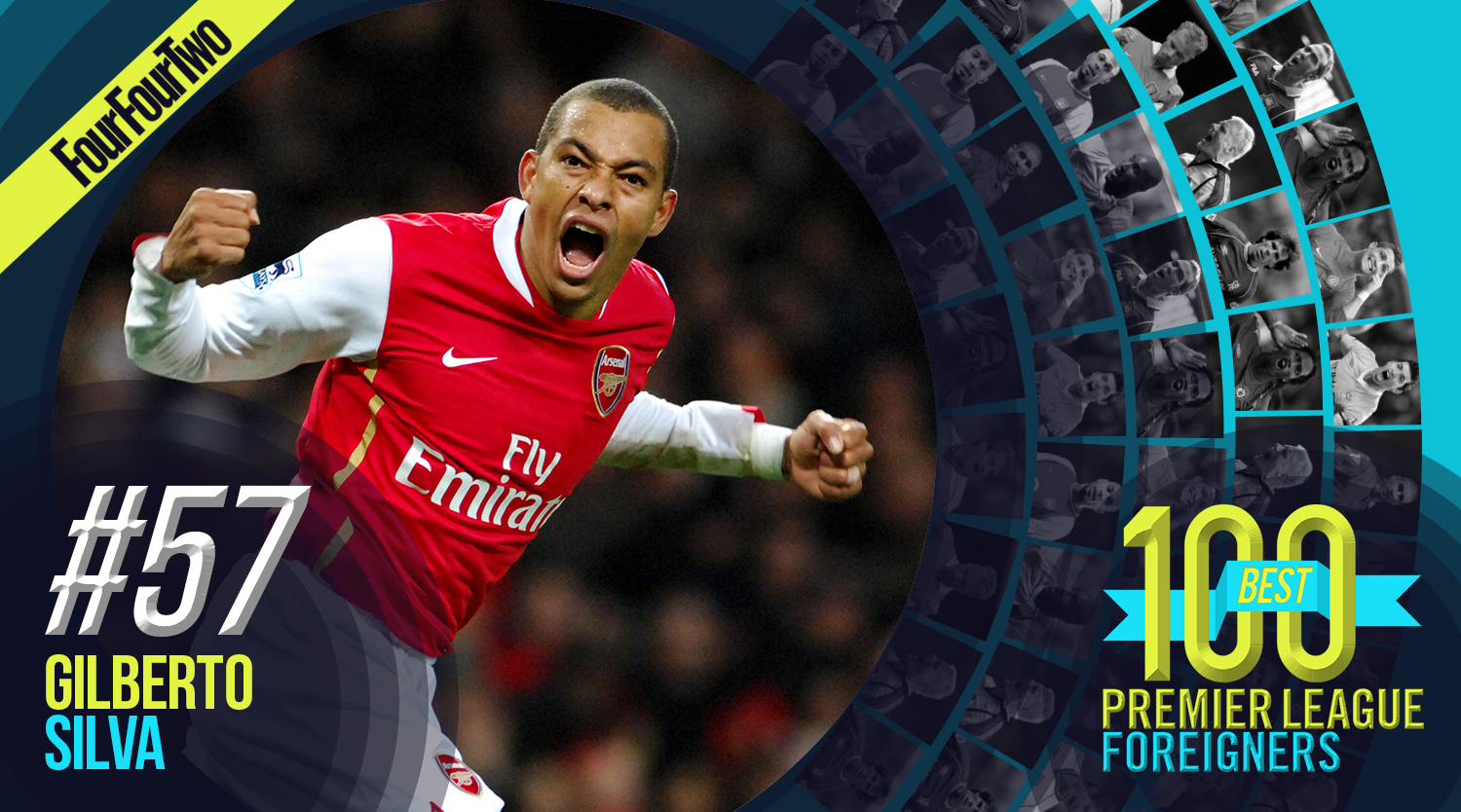
57. Gilberto Silva
The Brazilian midfielder, who won the World Cup in 2002, etched his name into Arsenal's history books by scoring the club's fastest-ever goal (20 seconds into the Gunners' 2002 Champions League match against PSV), and their first at the Emirates Stadium in 2006 against Aston Villa.
Crucially, he was the indestructible wall in midfield during Arsenal's Invincibles season in 2003/2004, adept at both dropping deep to assist the back four and joining the attack. Gilberto's selfless approach – and propensity to score more than the occasional goal – was appreciated by team-mates and supporters alike.
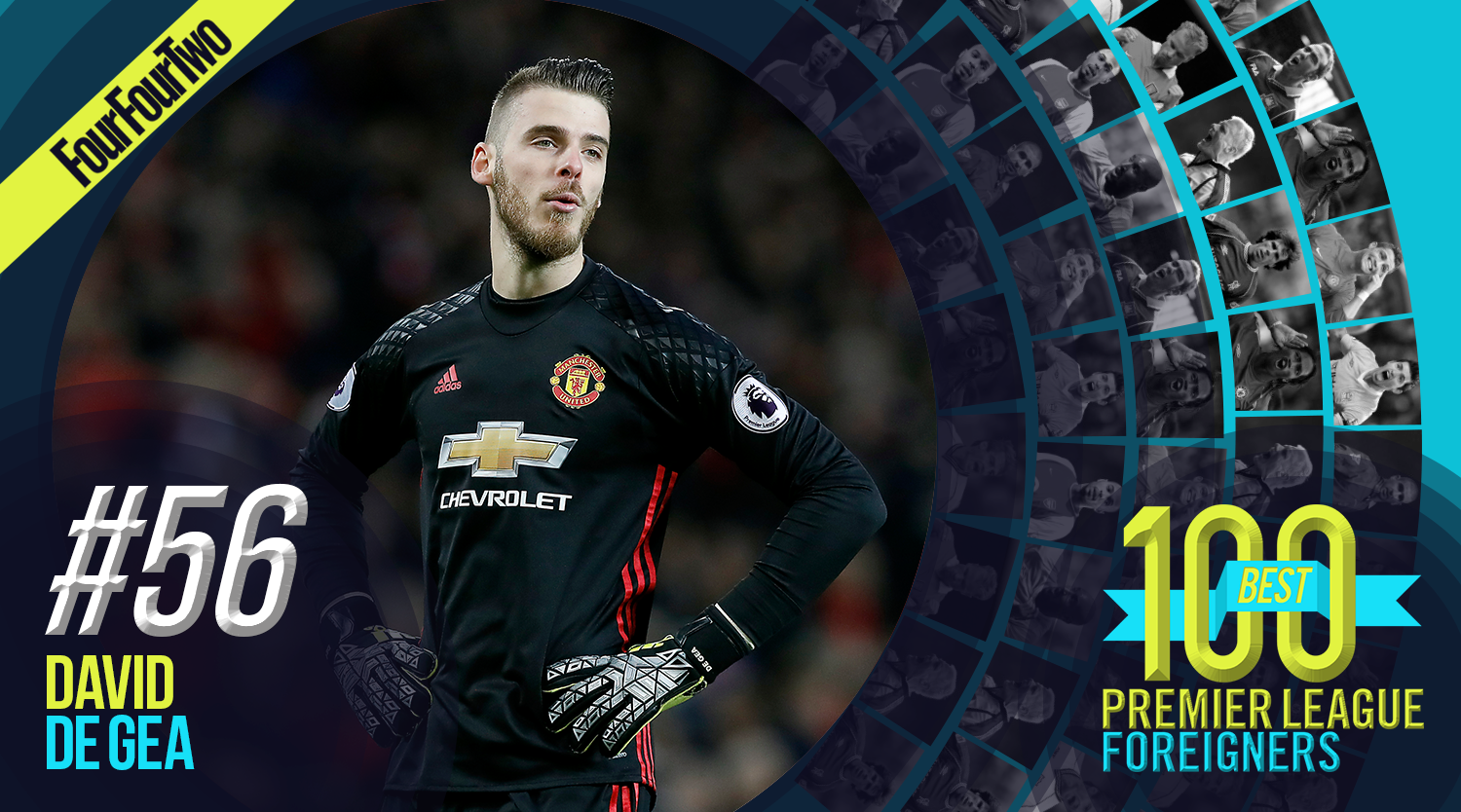
56. David de Gea
Beyond his many telling contributions to Manchester United's cause, De Gea's impact on English football has been to act as perpetual caveat against shaky, youthful goalkeeping. Signed from Atletico Madrid in 2011, his staggering shot-stopping ability didn't immediately translate to the Premier League: his growth was stymied by tentative decisions and his reputation was discoloured by mistakes.
But the steepest of learning curves led the Spaniard to rare goalkeeping air: between 2013 and 2016, he was United's Player of the Year in three consecutive seasons. A worthy reward for his glittering reel of saves.
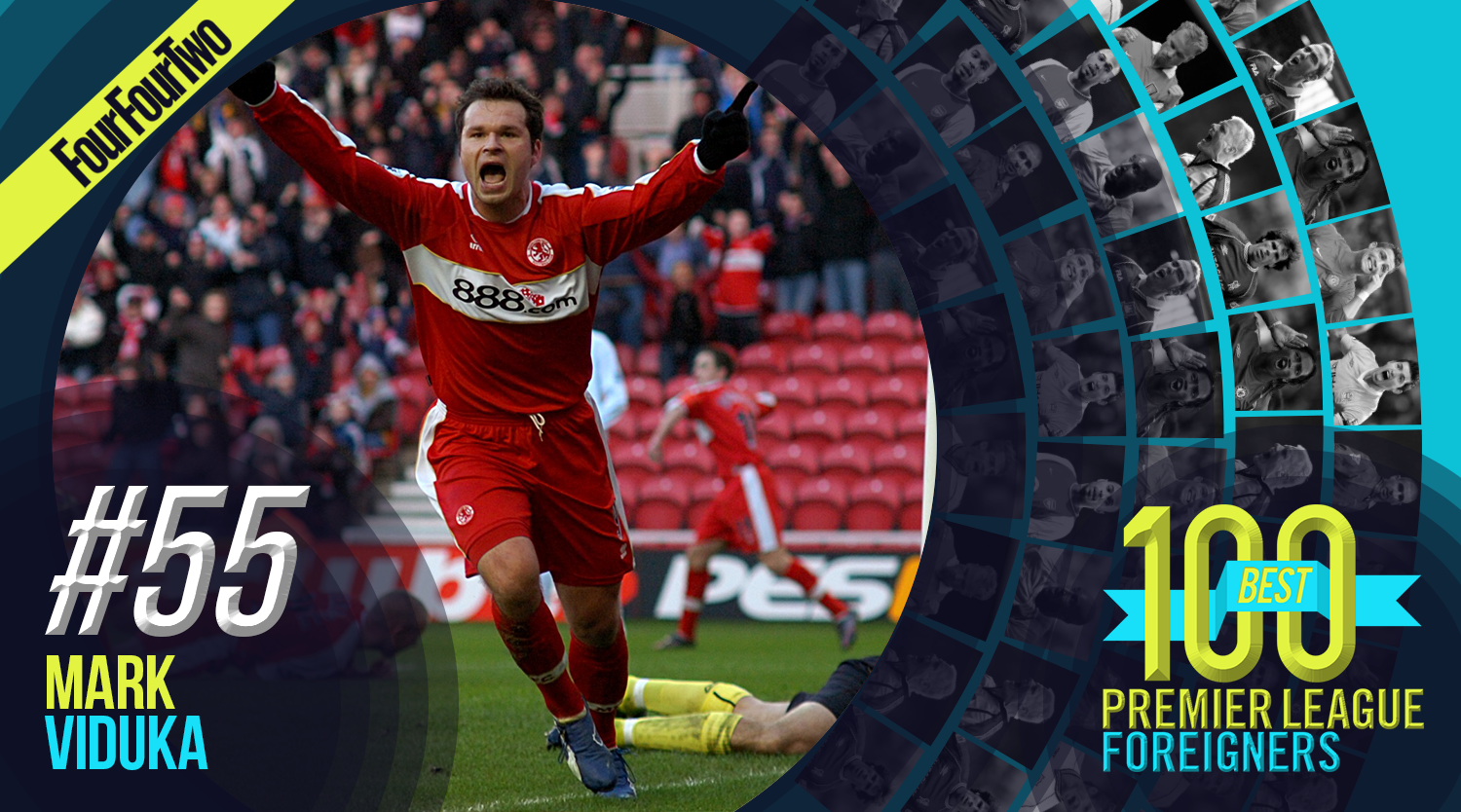
55. Mark Viduka
A man with the physique of an olympic weightlifter and the face of an amateur boxer, Mark Viduka was not, at a glance, a player you would expect to exhibit much in the way of twinkle-toed technical exuberance. Finesse, though, was his standout trait.
The Australian allied the sharp-elbowed brutism of an old-fashioned centre-forward with the sort of delicate ball control more likely found in an Argentinean enganche, and was the spearhead of David O'Leary short-lived but high-flying Leeds side, who reached a Champions League semi-final in 2001.
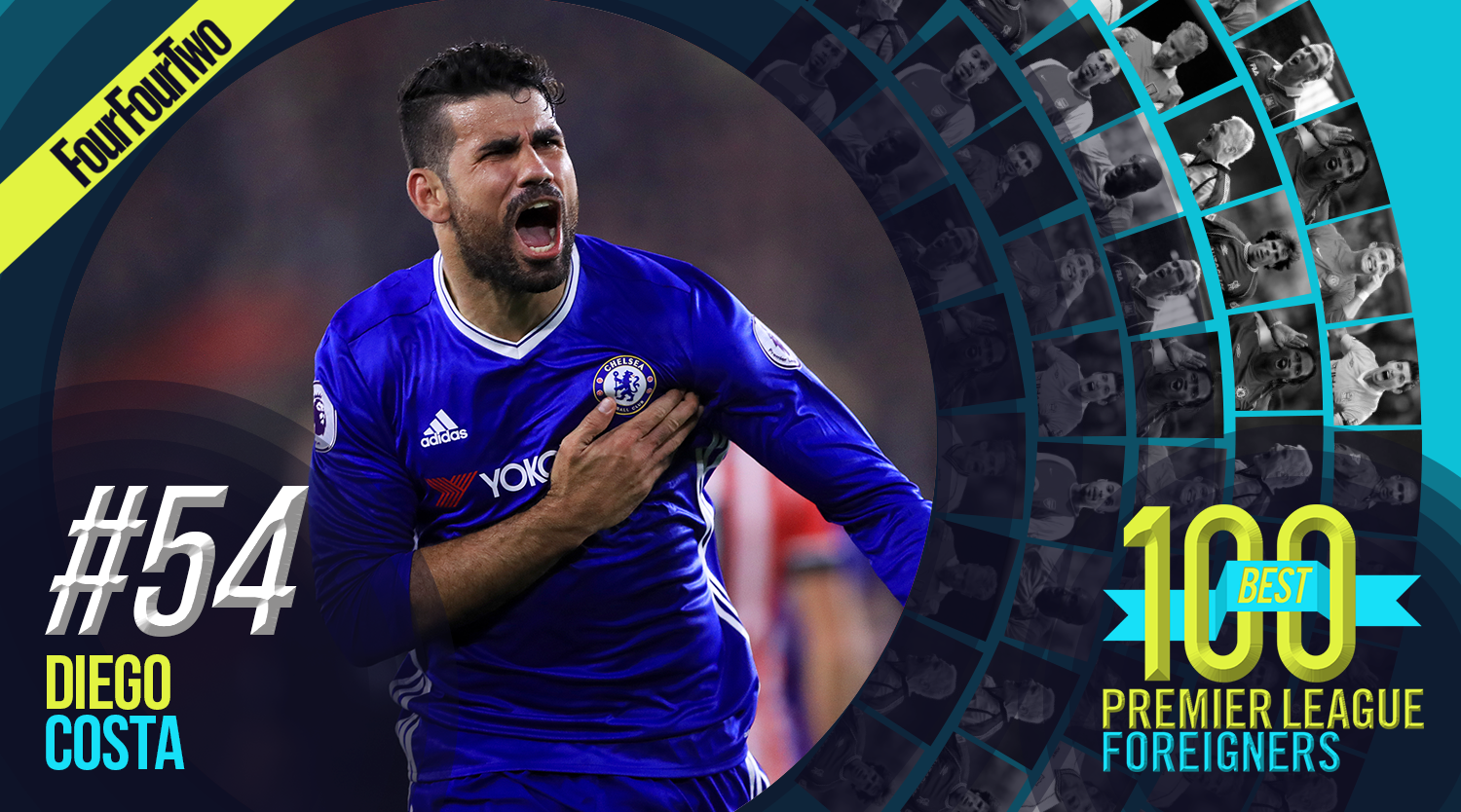
54. Diego Costa
While he was generally detested by every rival crowd in the country, there was much to be admired in the physical leadership Costa offered to Chelsea. When the acrimony rained down from the stands, Costa wanted the ball - he thrived in the hostility.
His goals (52 in 89 Premier League appearances) were of obvious value, but it was his rugged texture that made him. Costa won a league title in his first English season, suffered a curious malaise during his second, but in his third year reached a level of bullying bastardry which surpassed anything we've seen before.
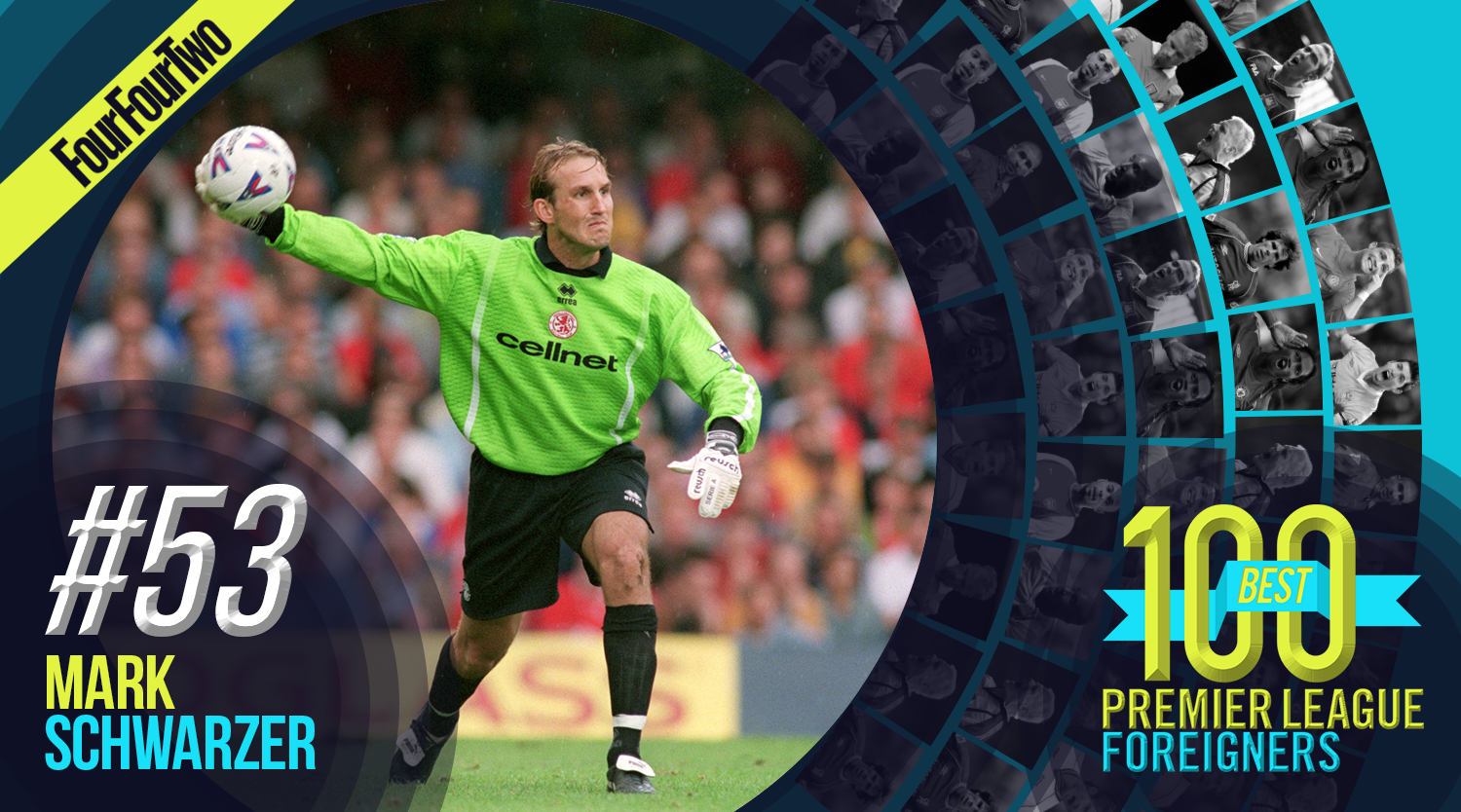
53. Mark Schwarzer
While compatriot and namesake Bosnich indulged himself in the trappings of his profession a little too much and was gone from the game far too early, Schwarzer made over 500 appearances for Middlesbrough and Fulham.
He wasn't just part of the league furniture, either: winning the League Cup with Middlesbrough in 2004, saving a Robbie Fowler penalty to take the Teessiders into the UEFA Cup the following year, and being part of Fulham's improbable run to the 2010 Europa League Final. And, of course, he has two winners' medals: at Chelsea and Leicester.
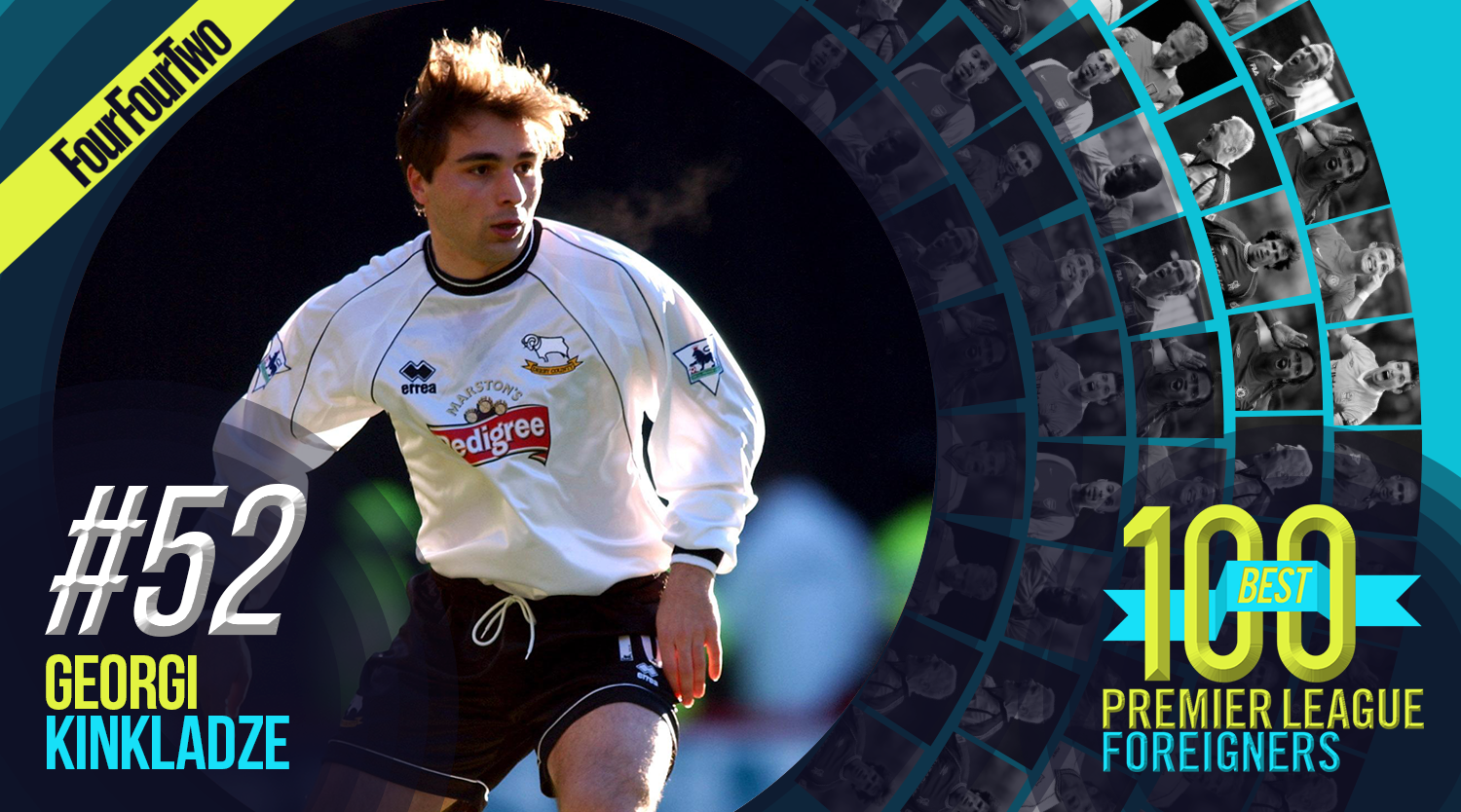
52. Georgi Kinkladze
Immortalised in song by Manchester City fans, Kinkladze remains one of the Premier League’s great entertainers in a team otherwise beset by relegation concerns rather than title dreams. His sole season of top-flight football for City ended with the club falling through the trapdoor to the Championship, but despite being linked with a host of clubs on the continent, the Georgian stayed at Maine Road for another two seasons.
He would later grace the English game again with Derby, but it’s for his performances and goals in the light blue half of Manchester that he's mostly remembered.
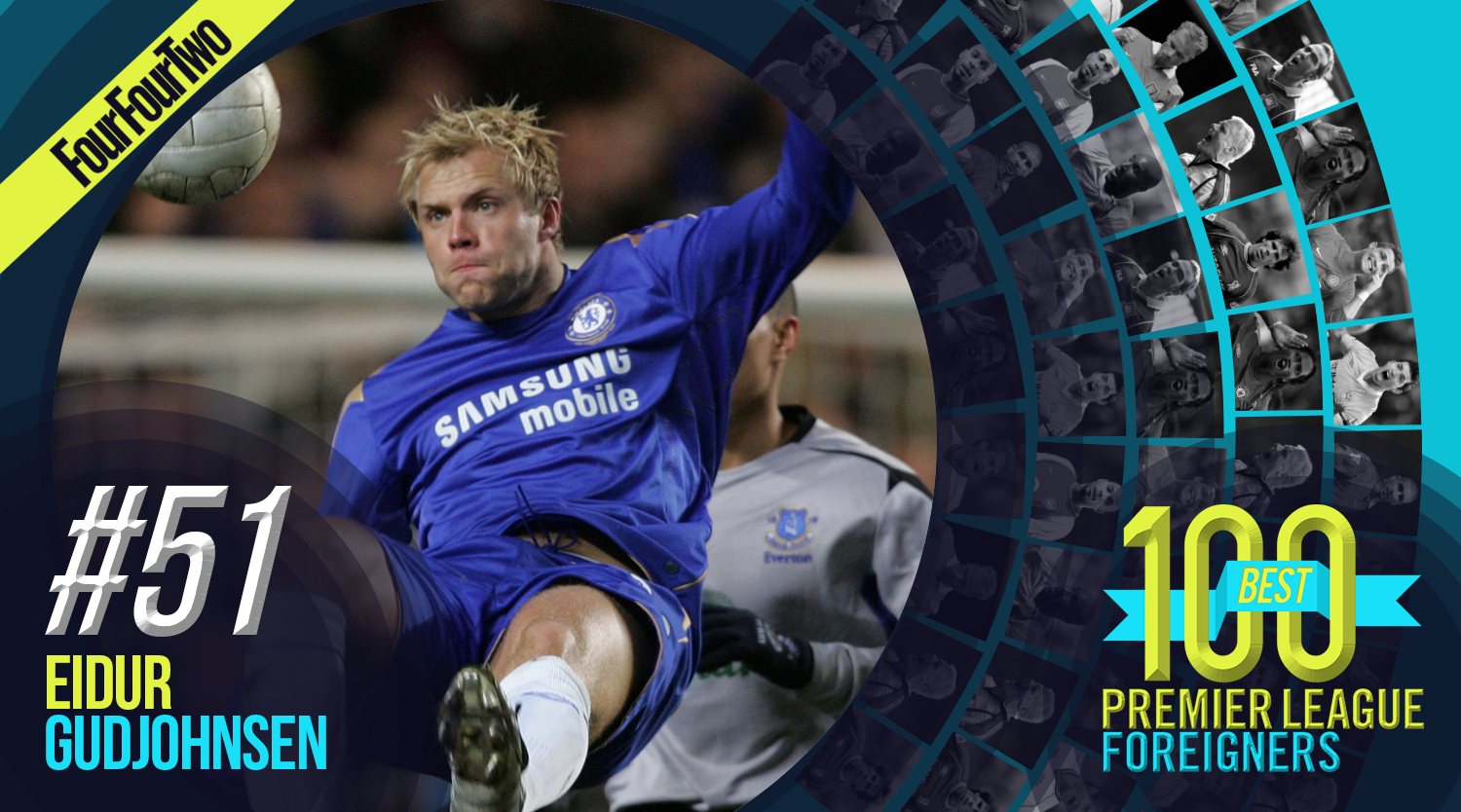
51. Eidur Gudjohnsen
A player whose excellence only became truly obvious in hindsight. Gudjohnsen made his name as a nippy young striker at Bolton before joining Chelsea for a career that played out over two very distinct but equally impressive chapters.
First, he formed one half of an emphatically lethal striking partnership alongside Jimmy Floyd Hasselbaink, his pace and movement often serving as the defence-stretching decoy that engineered the space for his partner's rocket-powered strikes at goal. Then, under Jose Mourinho, Gudjohnsen was transformed into a probing midfield playmaker, earning a pair of Premier League medals before joining Barcelona.
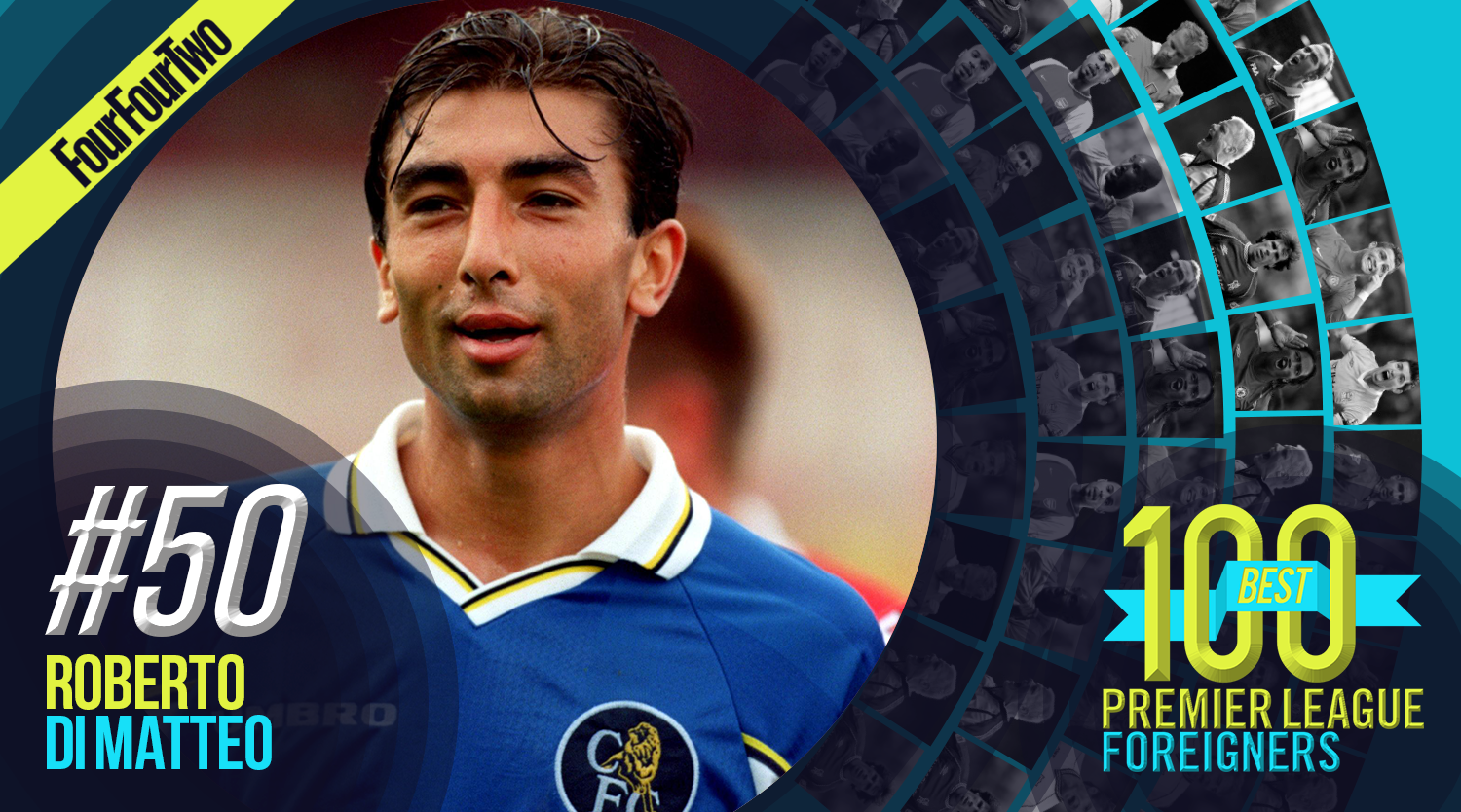
50. Roberto Di Matteo
With his immaculate hair and cultured range of passing, Di Matteo was the epitome of Italian sophistication for supporters used to the rather more earthy attributes of Dennis Wise. A record signing in 1996, Di Matteo signalled the start of a new era – not just in west London but also in the Premier League.
The Italian graced Stamford Bridge for six seasons, offering goals from midfield and famously scoring after 42 seconds in the 1997 FA Cup Final win over Middlesbrough. He retired in 2002, and later guided Chelsea to an unlikely Champions League triumph as manager.
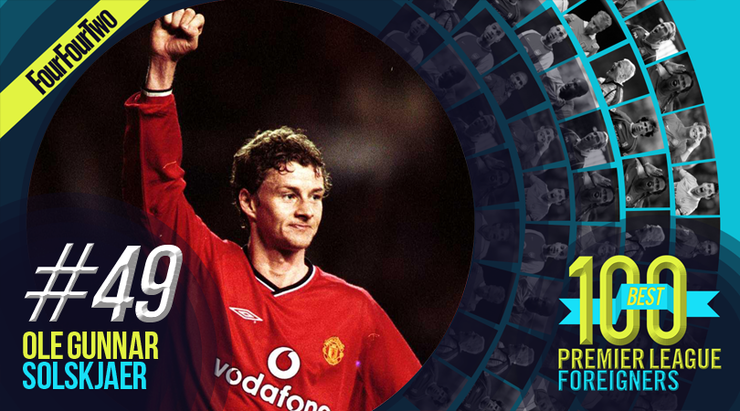
49. Ole Gunnar Solskjaer
Only once (in 2002/03) did Solskjaer reach the 20-goal threshold in all competitions, but that was illustrative of the role he played at Manchester United. Yet, while he's often remembered for his interventions as a substitute, he was neither just an impact player nor a fresh pair of legs; his mental approach and ability to identify weaknesses from the sidelines, when married to his natural instinct for goal, made him lethal.
He was, however, more than just simple opportunism: the Norwegian took goals efficiently, yes, but also with periodic class which has largely been forgotten.
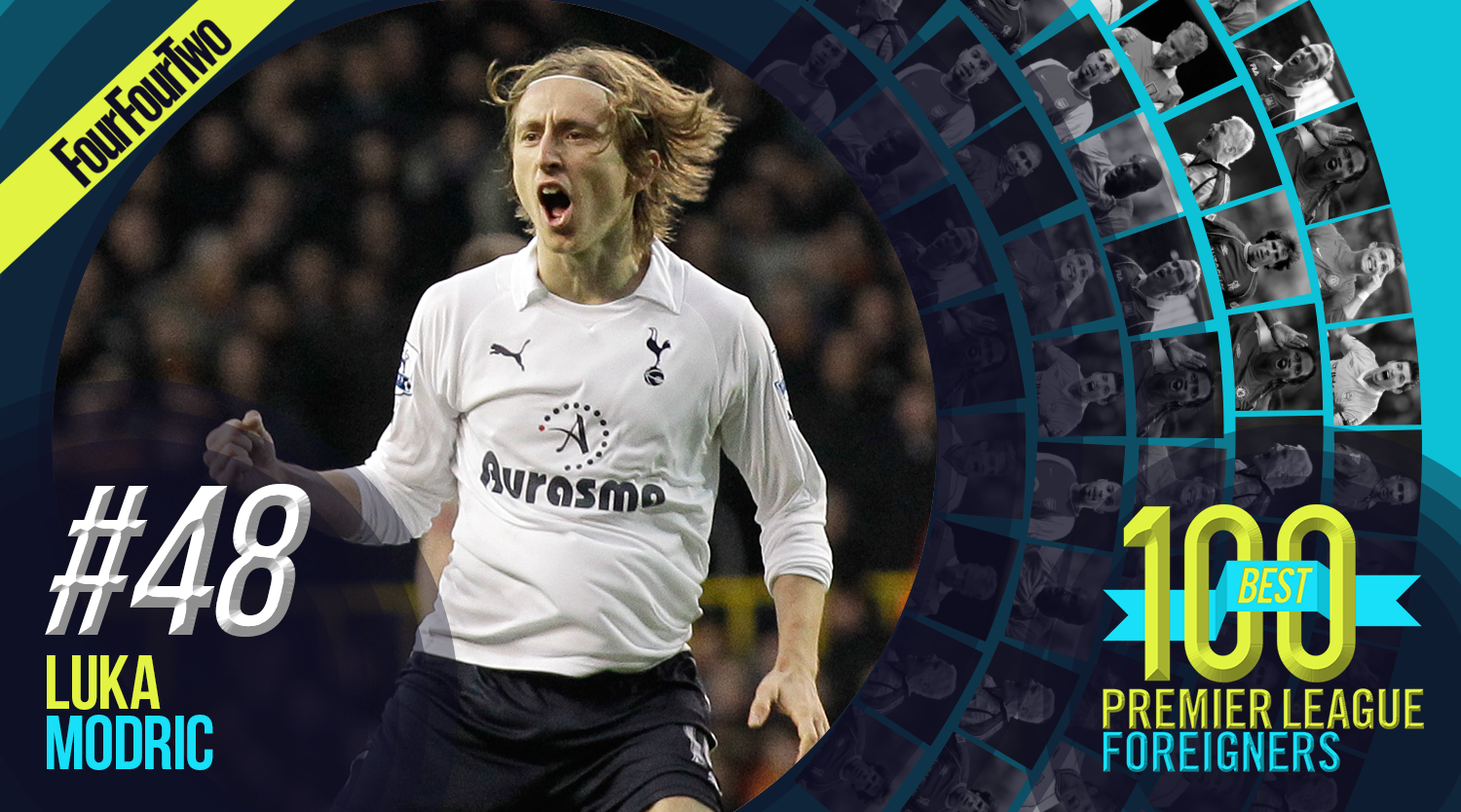
48. Luka Modric
One of the under-appreciated aspects of Modric's career in England is the adjustment he had to make for it to be a success. Juande Ramos's Tottenham were collectively dreadful, and the Croatian was worryingly peripheral; in those difficult early months, his suitability looked to have been horribly misjudged.
But what a response. Physical resilience developed in time and Harry Redknapp's attacking beliefs amplified his talent to a level of technical accomplishment rarely seen before or since. He hardened over time, but never to the point at which it compromised the aesthetic beauty of his passing range or close control.
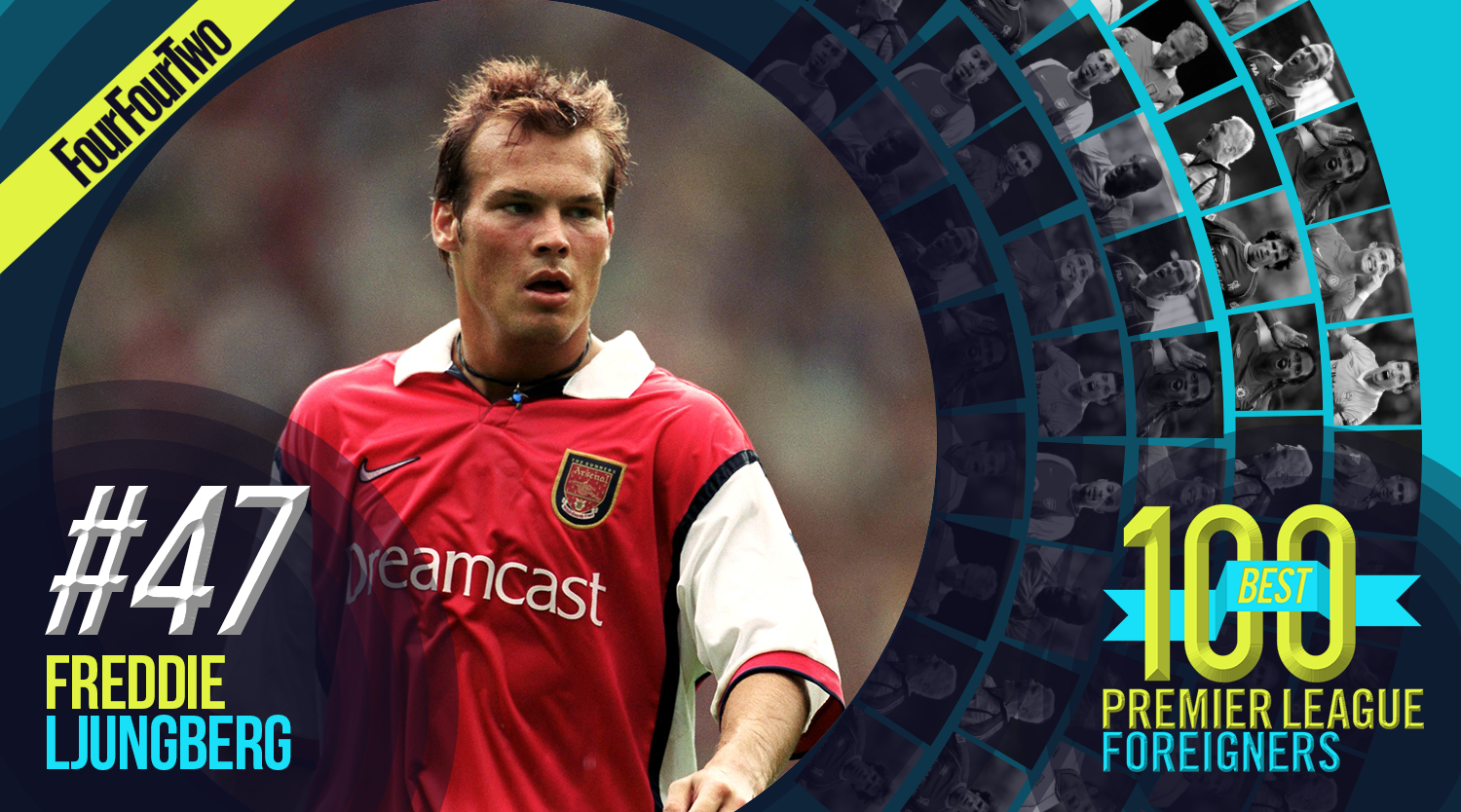
47. Freddie Ljungberg
After arriving at Highbury in August 1998, the spiky-haired Swede drifted in and out of the side and occasionally frustrated with his inconsistent displays.
That was until the Double-winning 2001/02 campaign, when he was arguably the most devastatingly effective forward in England. Linking superbly with Dennis Bergkamp, Ljungberg mastered the art of latching onto the Dutchman’s passes and slipping the ball beyond a goalkeeper.
Arsenal’s victories against Tottenham, Bolton, West Ham and Liverpool were in no small part due to Ljungberg’s marvellous anticipation and clinical finishing. But the less said about his later spell with West Ham, the better.
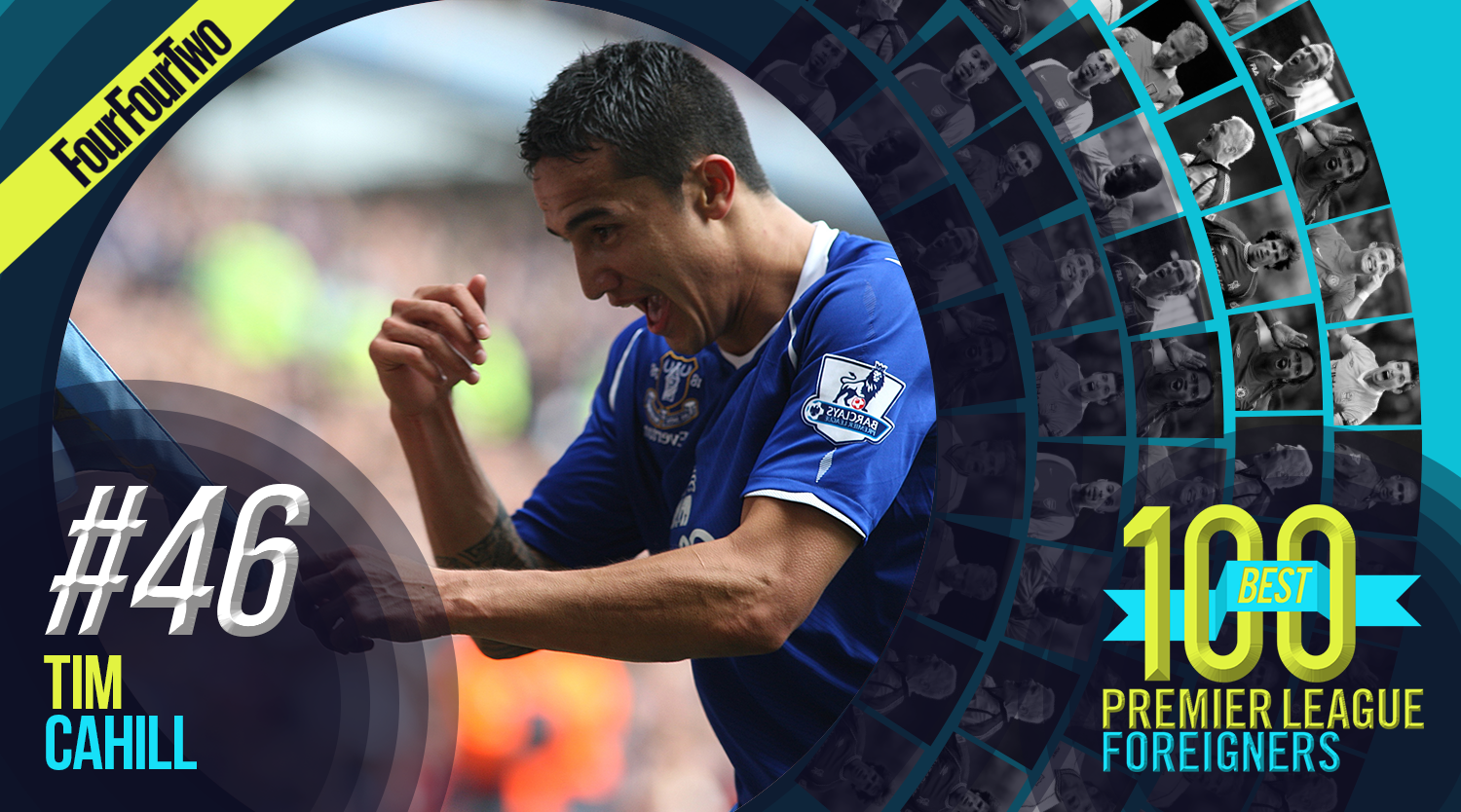
46. Tim Cahill
A nuts-and-bolts central midfielder with vehement dedication and a magnetic attraction to a well-directed cross, Cahill was a staple of David Moyes’s Everton side that spent the best part of a decade troubling any and all opposition with a fine balance of craft and clout, skill and physicality.
If Mikel Arteta was the silk in the side, Cahill was the steel, his infectious energy and focused aggression a key component of a team that were able to punch well above their weight. He remains one of the best headers of a ball the Premier League has seen.
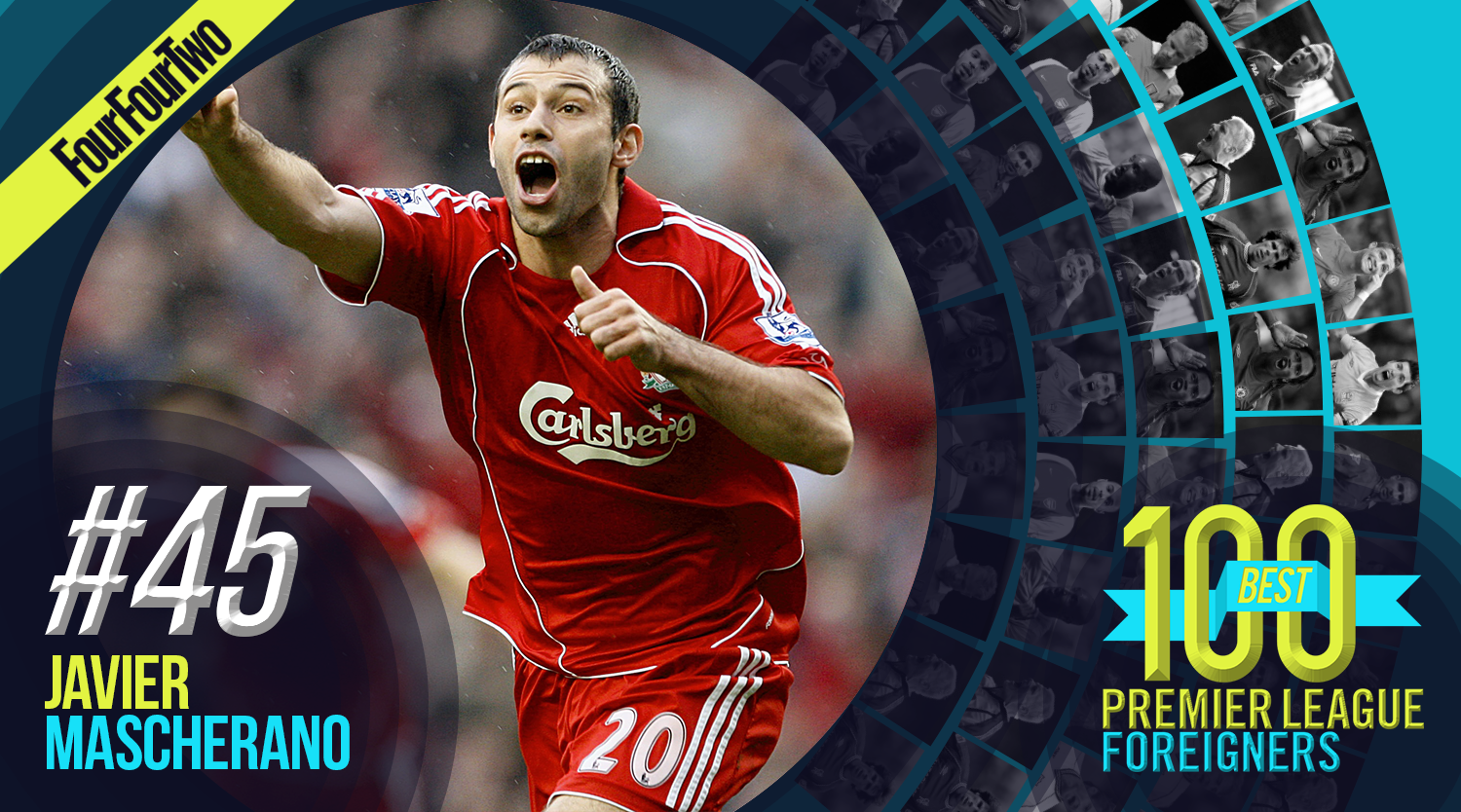
45. Javier Mascherano
What a strange story: one day Mascherano and Carlos Tevez were Corinthians players, the next they were standing alongside Alan Pardew with baffled expressions on their faces.
West Ham was admittedly a disaster, with Mascherano regularly being shunned in favour of Hayden Mullins (yes, really), but a move to Liverpool kick-started his climb. With hindsight and knowledge of what he would achieve at Barcelona, we know exactly why Mascherano was so effective in English midfields: he tracked the ball brilliantly, protected his defence relentlessly, and was smarter than almost every other player on the pitch.
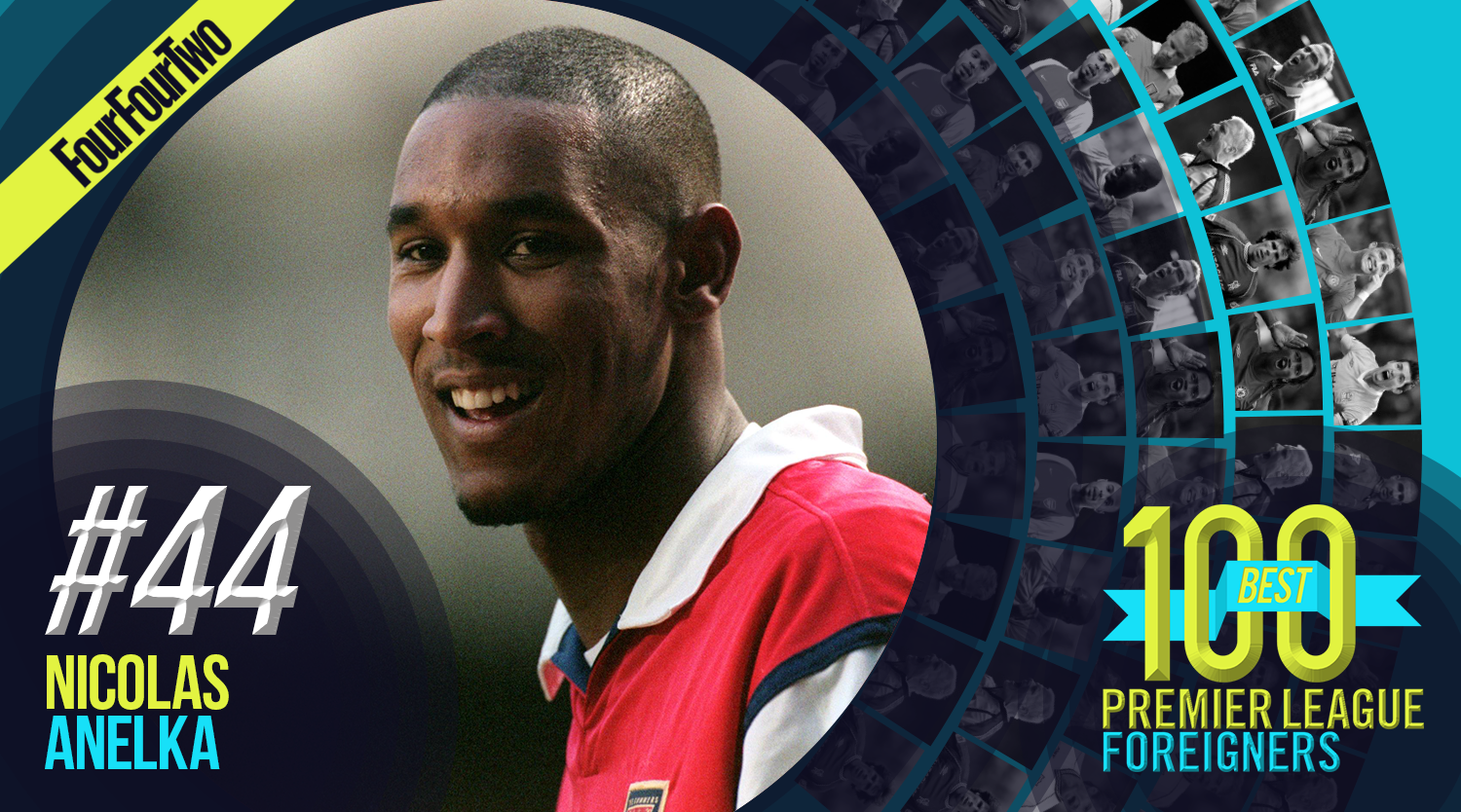
44. Nicolas Anelka
The Frenchman first burst onto the scene at Arsenal as an 18-year-old in a 1997/98 season that ended with the Gunners celebrating the Double.
He would later go on to enjoy spells with Liverpool, Manchester City, Bolton, Chelsea – where he topped the Premier League scoring charts in 2008/09 – and West Brom, without ever truly appearing content with life in the goldfish bowl that is the Premier League. He often delivered more goals than smiles but his scoring record compares favourably with many of his contemporaries.
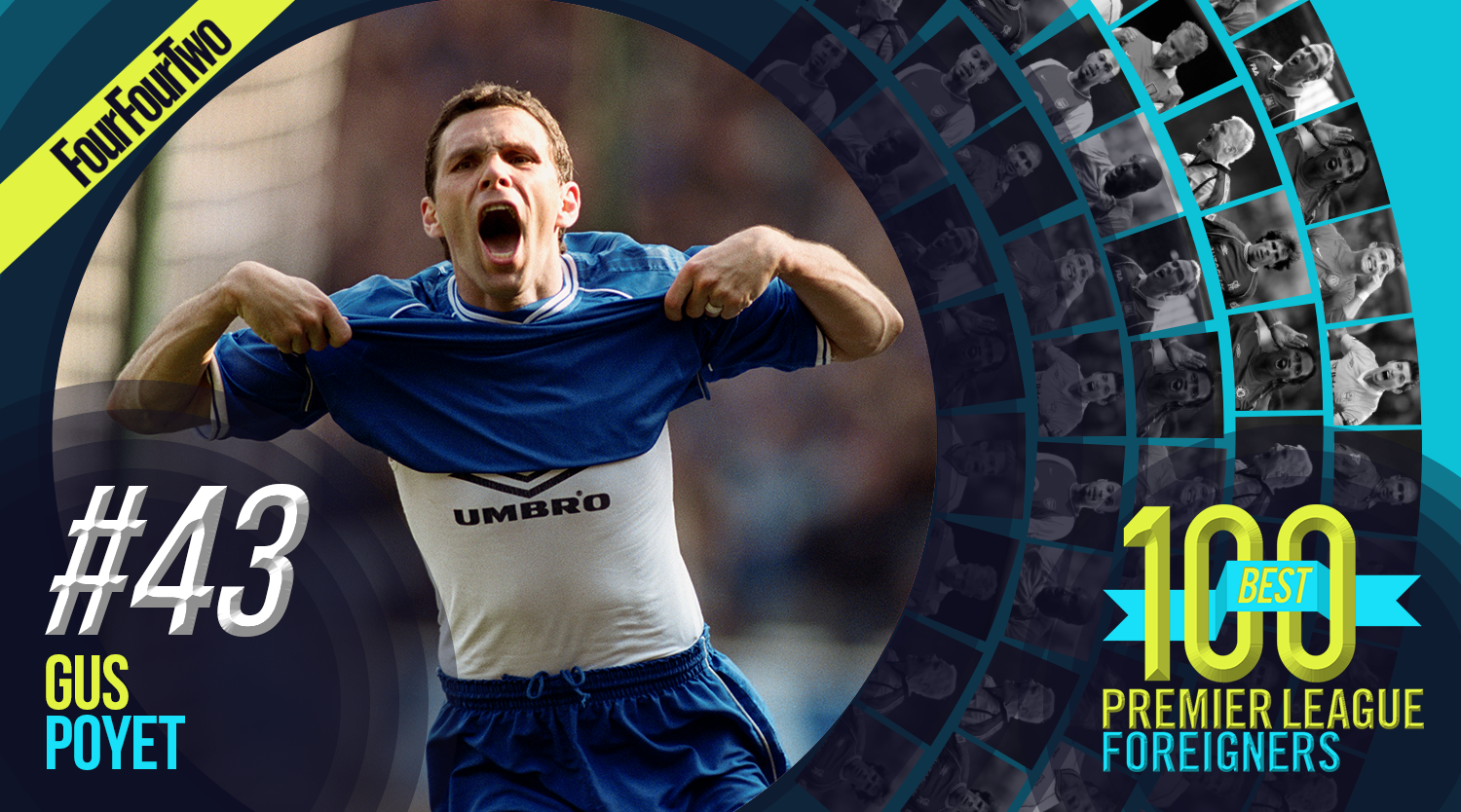
43. Gus Poyet
The ageless Poyet was another to traverse Chelsea’s transformation, the Uruguayan representing a reassuring and often potent goalscoring force from midfield between 1997 and 2001. He did a similarly impressive job at Spurs before calling time on his career in 2004 aged 36.
The attacking midfielder arrived at Stamford Bridge from Real Zaragoza and immediately settled into the rhythm of both the Premier League and life in London. He won the FA Cup and the European Cup Winners’ Cup during his time at Chelsea, and also helped Spurs to the League Cup final in 2002.
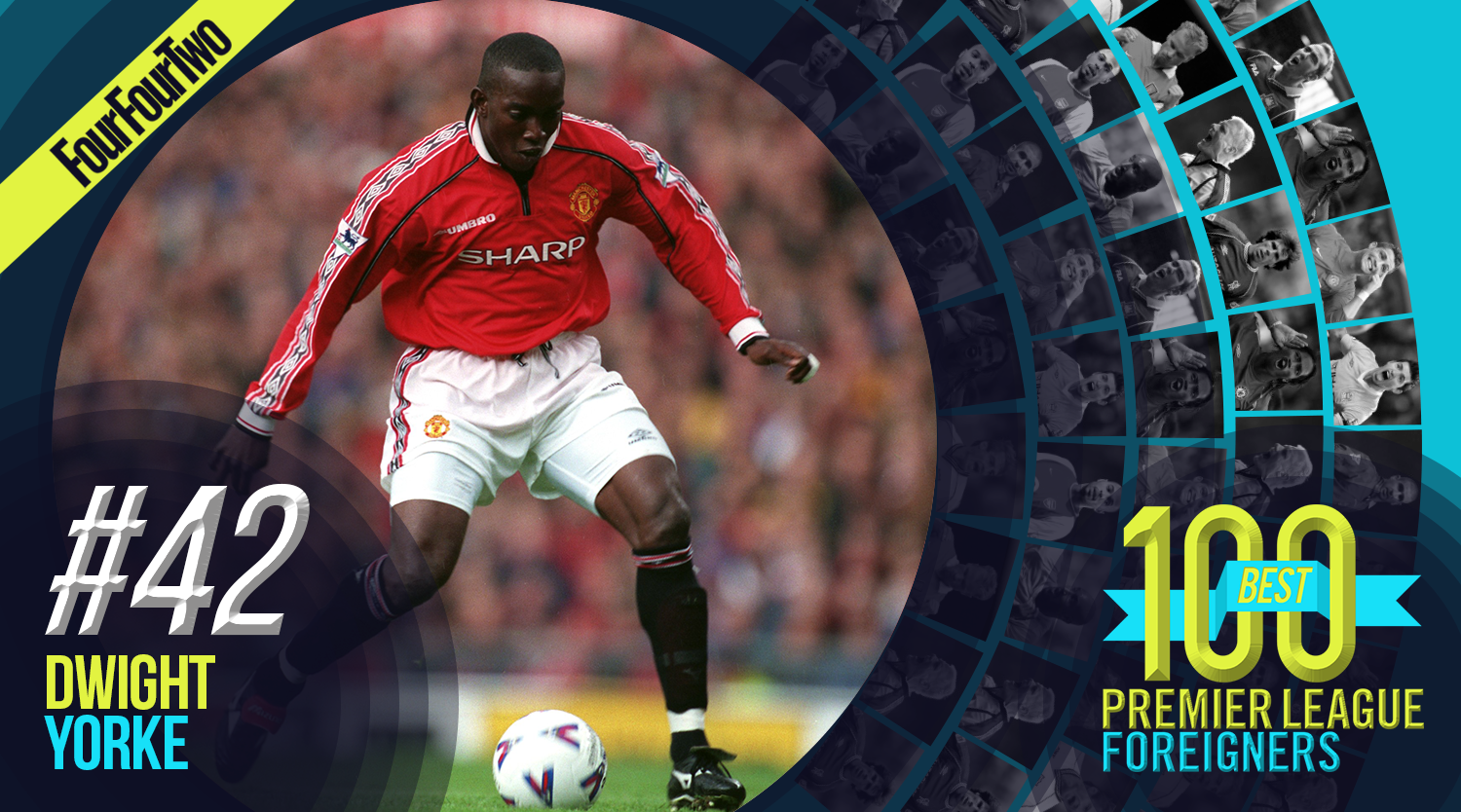
42. Dwight Yorke
A smiling presence on the pitch, the Tobagonian was at times bewitching throughout the 1990s, first for Aston Villa and then for Manchester United, where his partnership with Andy Cole was a major factor in the club’s 1999 Treble triumph.
Alongside his Champions League winner’s medal, Yorke also fired United to three Premier League titles and one FA Cup, adding to the two League Cup wins he'd helped Villa to in 1994 and 1996. After leaving Old Trafford, Yorke played for Blackburn, Birmingham and Sunderland, with a spell in Australia’s A-League with Sydney sandwiched in between.
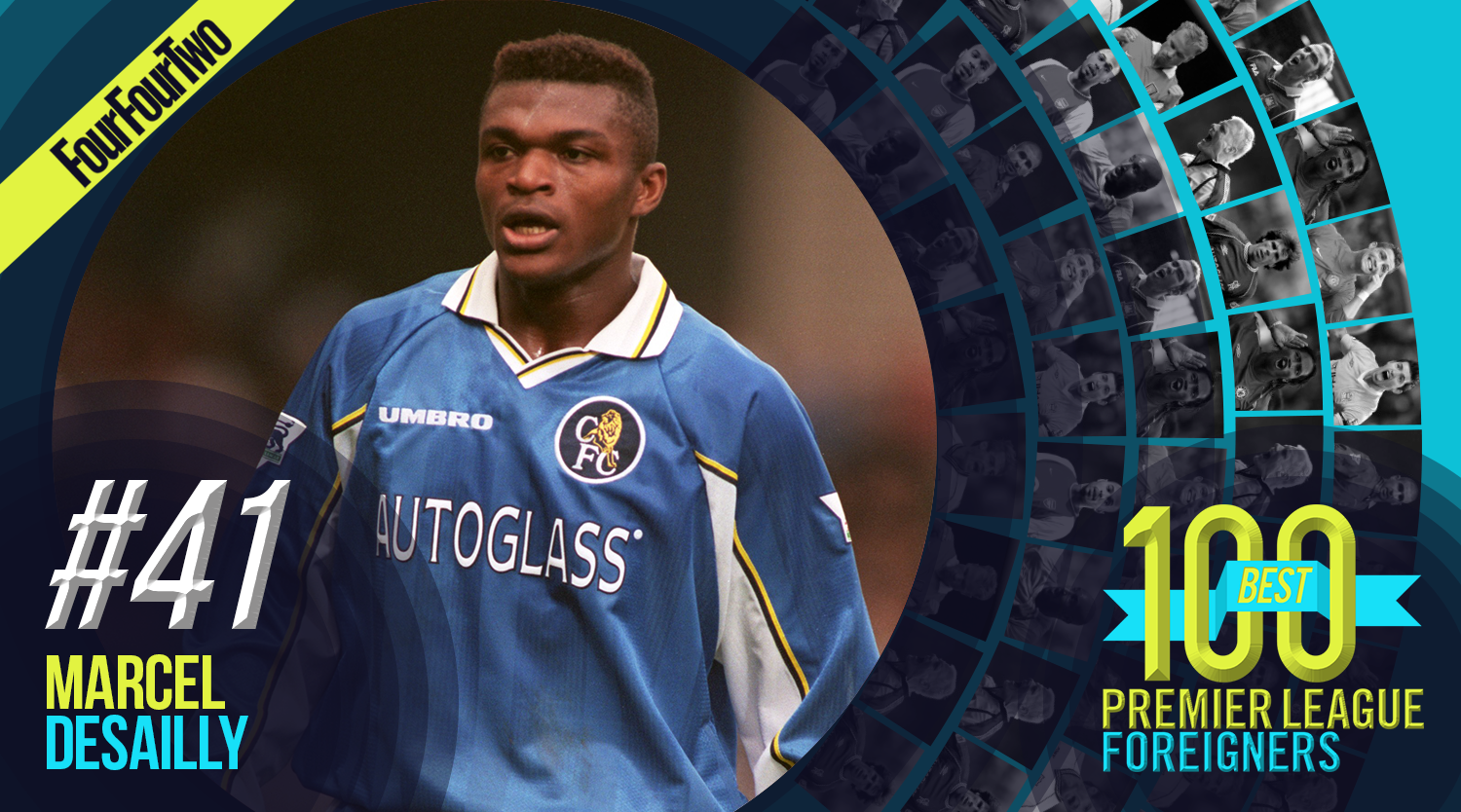
41. Marcel Desailly
Arguably on the wrong side of his career peak when he touched down at Stamford Bridge, no one could quibble with the Frenchman’s performances during his six-year spell in west London.
Desailly played a key role in the Chelsea revolution between 1998 and 2004, standing tall as the club were transformed from also-rans to title contenders. Strong in the tackle and graceful whenever he ventured into midfield, he was unlucky to only add an FA Cup winner’s medal (against Aston Villa in 2000) to the haul he accumulated with Milan.
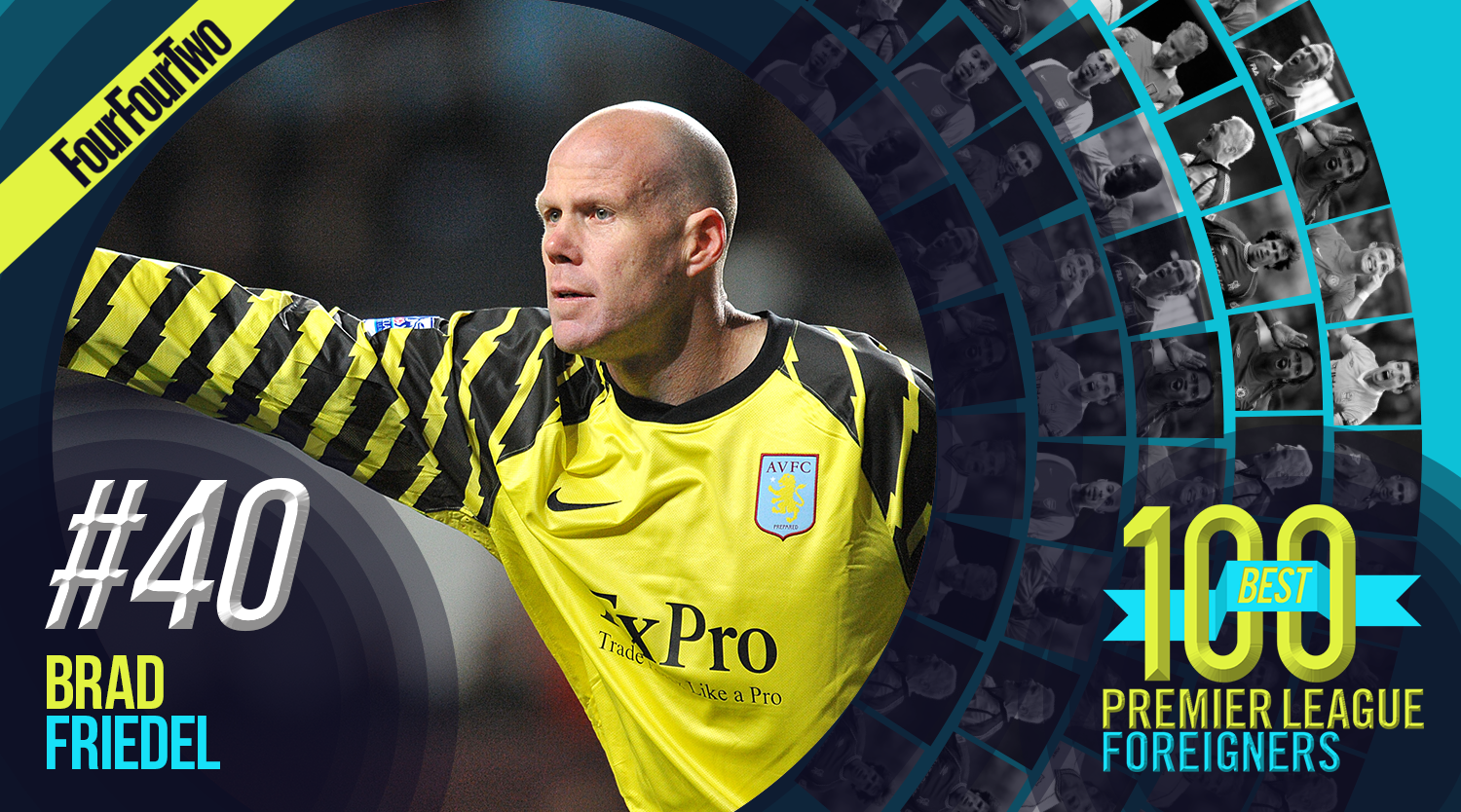
40. Brad Friedel
Friedel wasn’t a success at Liverpool, his first English employers; he lasted just three seasons at Anfield before being sold to Blackburn. The American’s physical resilience is often celebrated, but perhaps his emotional durability warrants equal praise: early failure has destroyed the career of many a goalkeeper and yet in his case it seemed highly instructive.
Friedel rebuilt his reputation at Ewood Park during Rovers' promotion season and spent eight successful years at the club before taking his secure hands and obstinate shot-stopping to Aston Villa and, eventually, Tottenham.
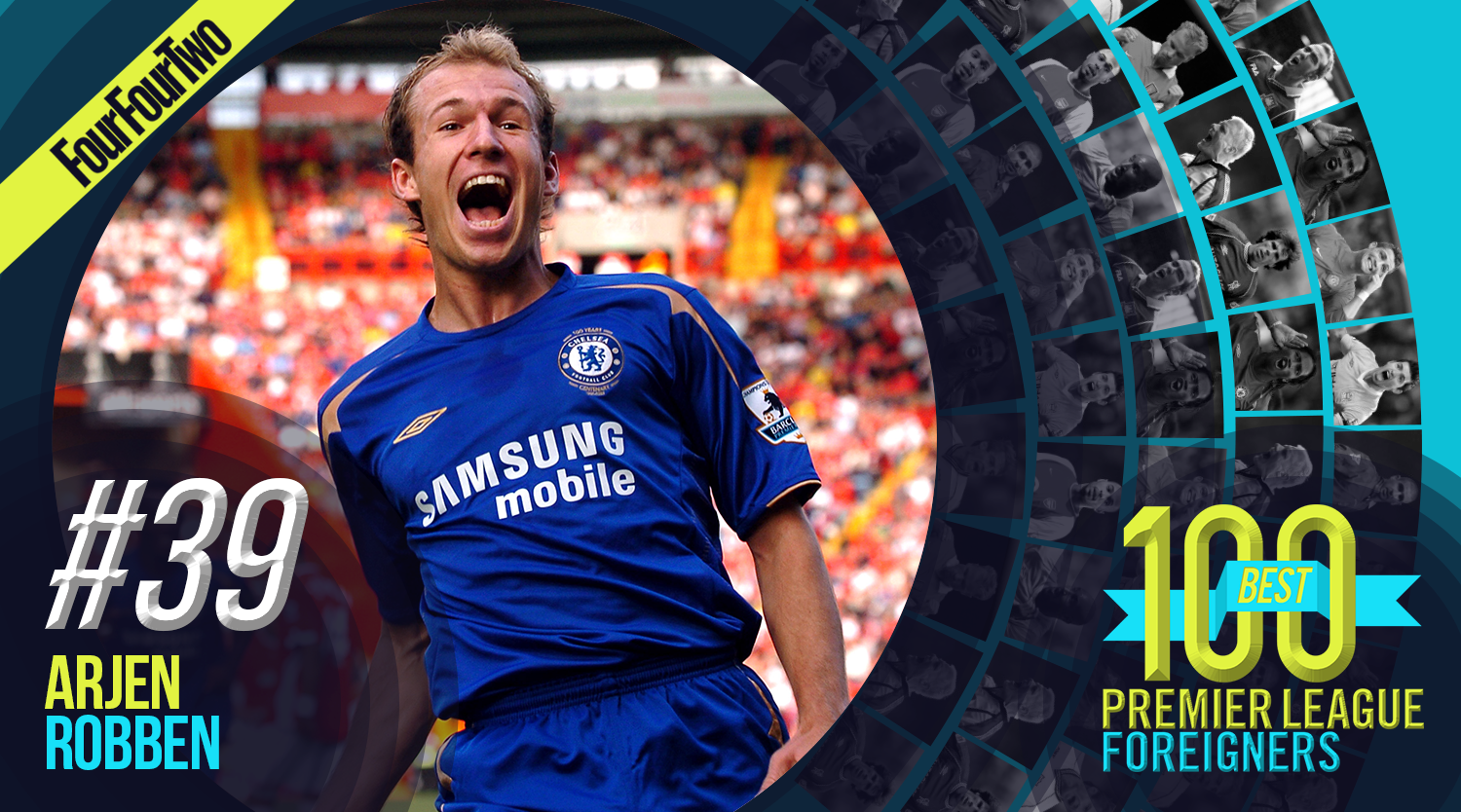
39. Arjen Robben
Robben's career has soared to such heights since leaving England that it's easy to forget those first exciting glimpses of him as a young player.
In the present day, he's synonymous with a specific series of actions: collecting the ball on the right, cutting infield and driving into or across the penalty box. At Chelsea that wasn't quite so; he was more of a complement to his team-mates than an outright match-winner. Lightning quick, direct and highly economic, the Dutchman was nonetheless the perfect Mourinho component.
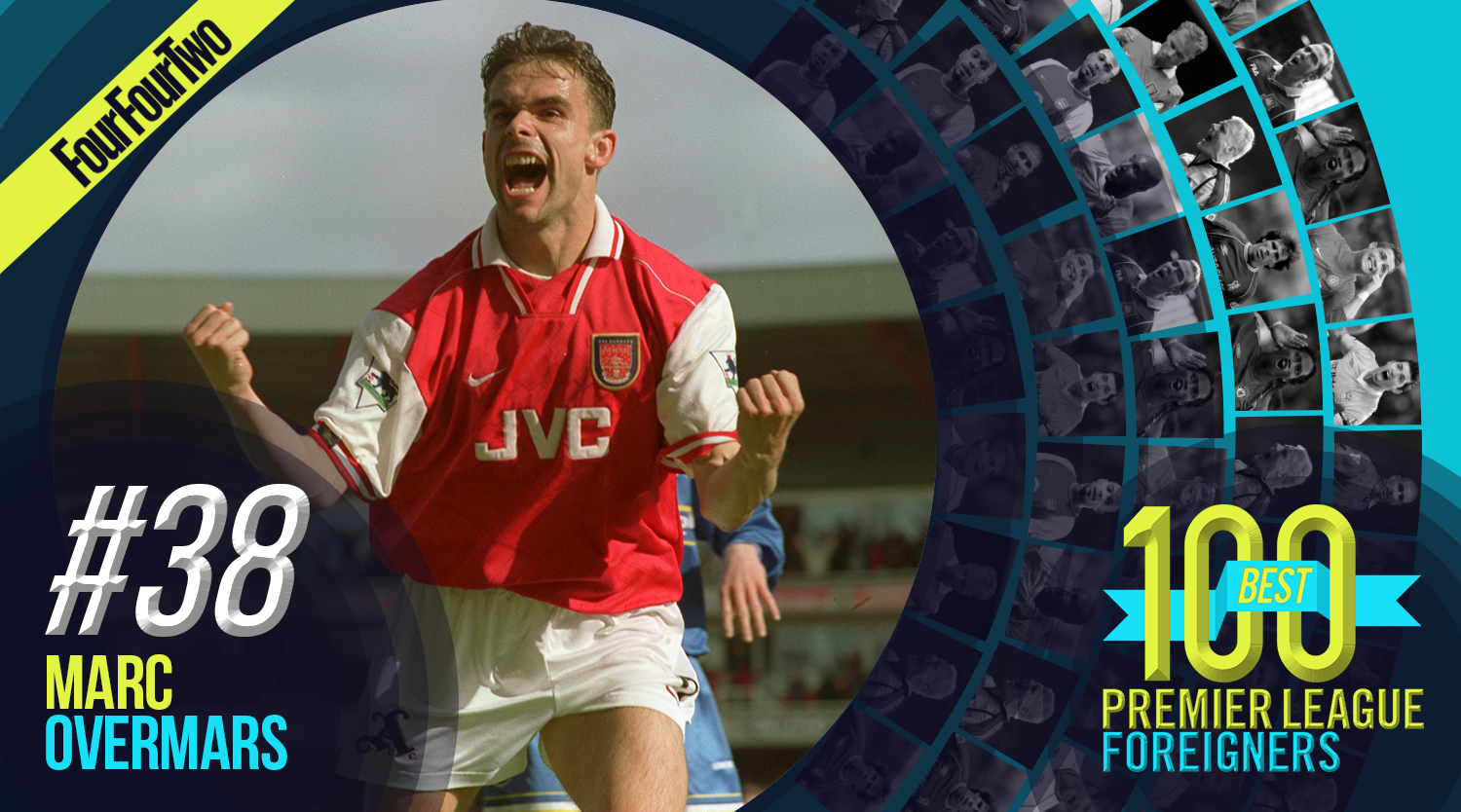
38. Marc Overmars
Like several of his new Arsenal team-mates, Overmars took a few months to adjust to the vagaries of the English game after arriving in 1997. But in the new year, his stellar displays helped drive the team to a second domestic double.
Overmars served notice of his growing effectiveness when he scored both goals in a 2-1 home win against Leeds in January 1998; he then grabbed what was essentially a season-turning winner in Arsenal’s April showdown with title rivals Manchester United, and netted twice as Arsenal clinched the league with a 4-0 win against Everton at Highbury.

37. Emmanuel Petit
Petit arrived at Arsenal in August 1997 after snubbing Tottenham at the last minute. The pony-tailed Frenchman initially struggled to adapt to the pace of the English game, and his and Patrick Vieira’s performances led to suggestions that Wenger’s team lacked the mentality to win the league.
Yet Petit soon morphed into the most effective defensive midfielder in the top flight. Tough in the tackle and an excellent passer, he and Vieira dovetailed perfectly as Arsenal accelerated towards the Double.
Following a season with Barcelona, Petit returned to England for a slightly disappointing three-year stint with Chelsea in 2001.
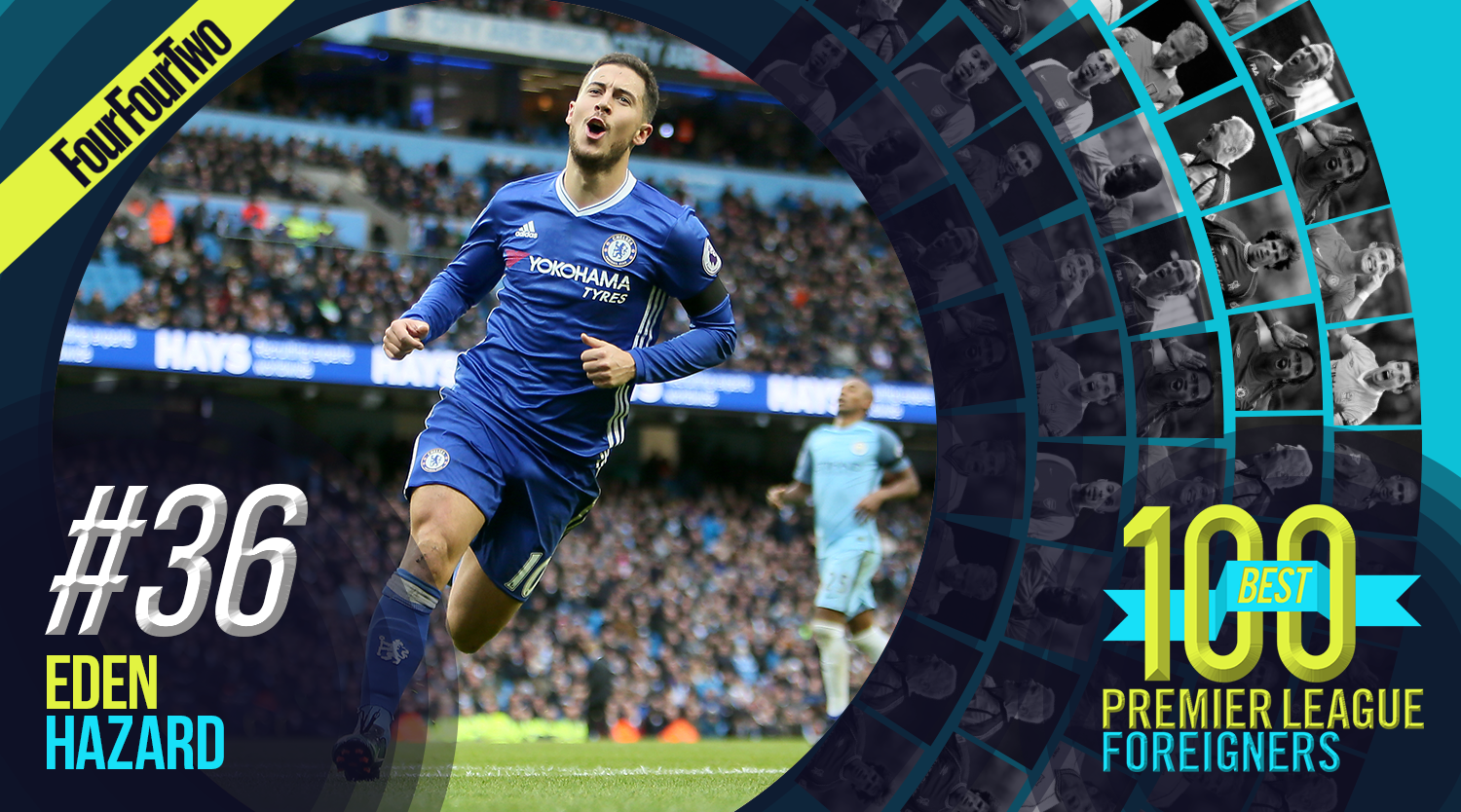
36. Eden Hazard
Courted by almost every major club in Europe, Hazard brought his youthful brand of attacking-midfield play to London in 2012 and has been the jewel in Chelsea's crown ever since.
The Belgian periodically attracts criticism for his performances, never more so than during the dark Mourinho days of 2015/16, but he's consistently been one of the most dangerous players in the league. The inspiration behind two of Chelsea’ Premier League titles, Hazard can change matches in the blink of an eye, with his low centre of gravity and creative finishing range more than a match for any defender.
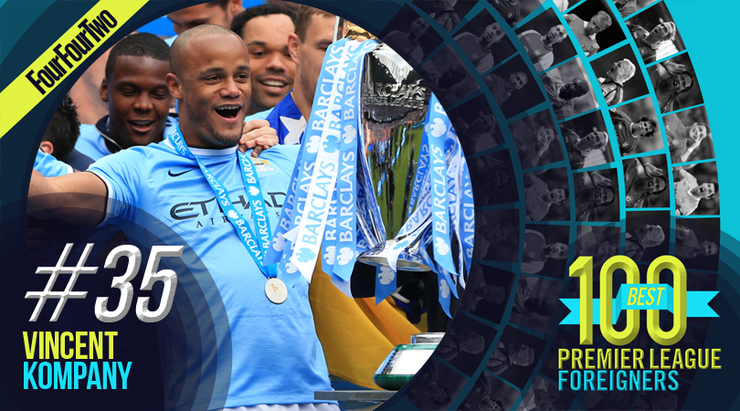
35. Vincent Kompany
Like all clubs who become wealthy overnight, City's recruitment strategy was initially scattergun: in came the big wages and the suspect attitudes. Kompany predated the Abu Dhabi Group's takeover, though, and proved to be an astute addition: an excellent defender, but also a leader who inspired the club to two titles.
Injuries threatened to ruin him, and he’s no longer as dominant as he once was, but the Belgian was undoubtedly among the best centre-halves in the country before his body began to fail him.
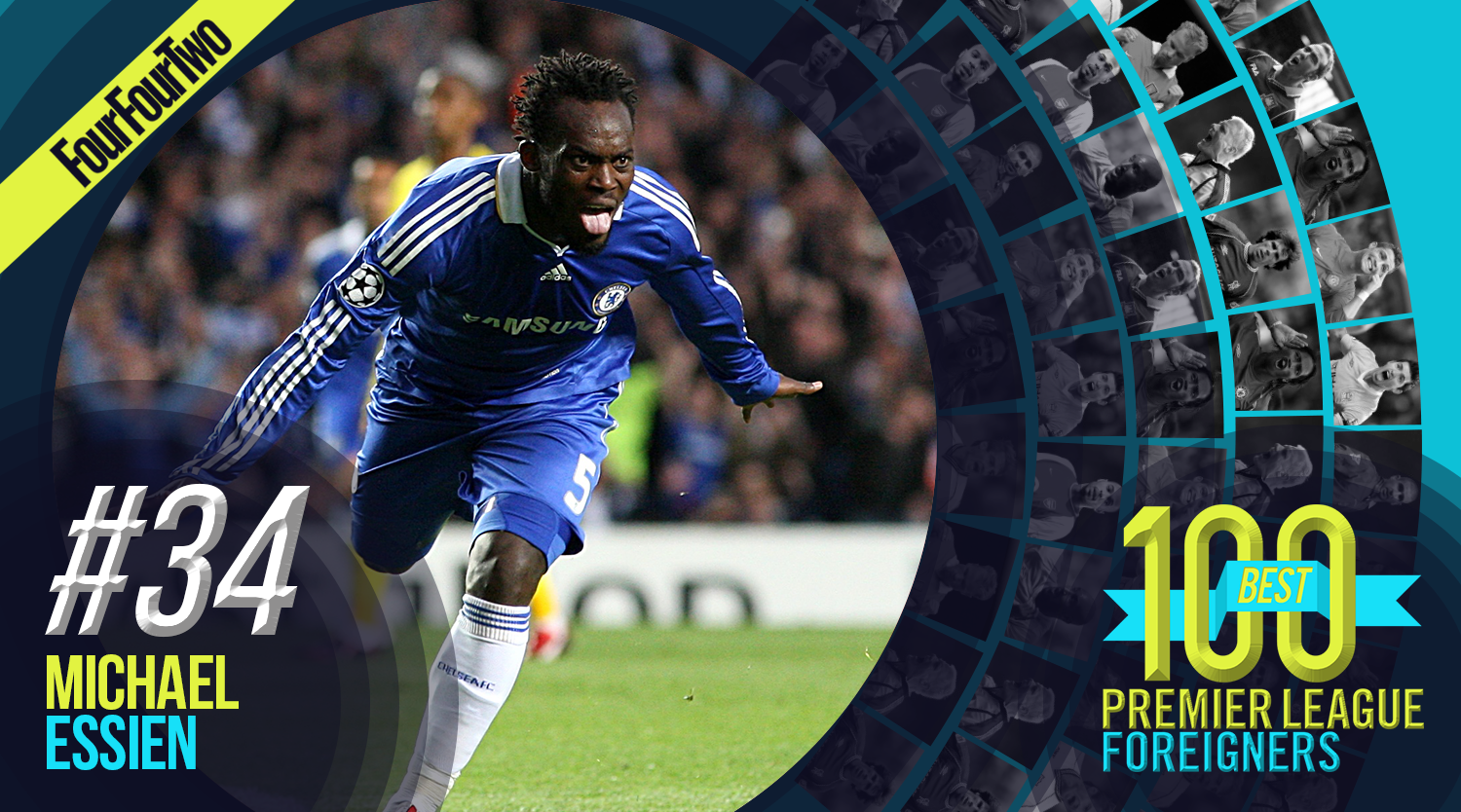
34. Michael Essien
Not a player who often comes up when the Premier League's best midfielders are discussed, yet at his peak Essien was as powerful a force as Gerrard, Lampard or Scholes. The problem is that his peak was so fleeting, having never truly recovered from a knee injury in 2009.
For three seasons Essien came as close as any midfielder to a fully-fledged Gerrard initiation: marauding runs, thundering tackles, boundless stamina and a savage shot. The scorer of one of the great goals of the modern era against Arsenal, Essien deserves to be recalled in higher esteem than he is.
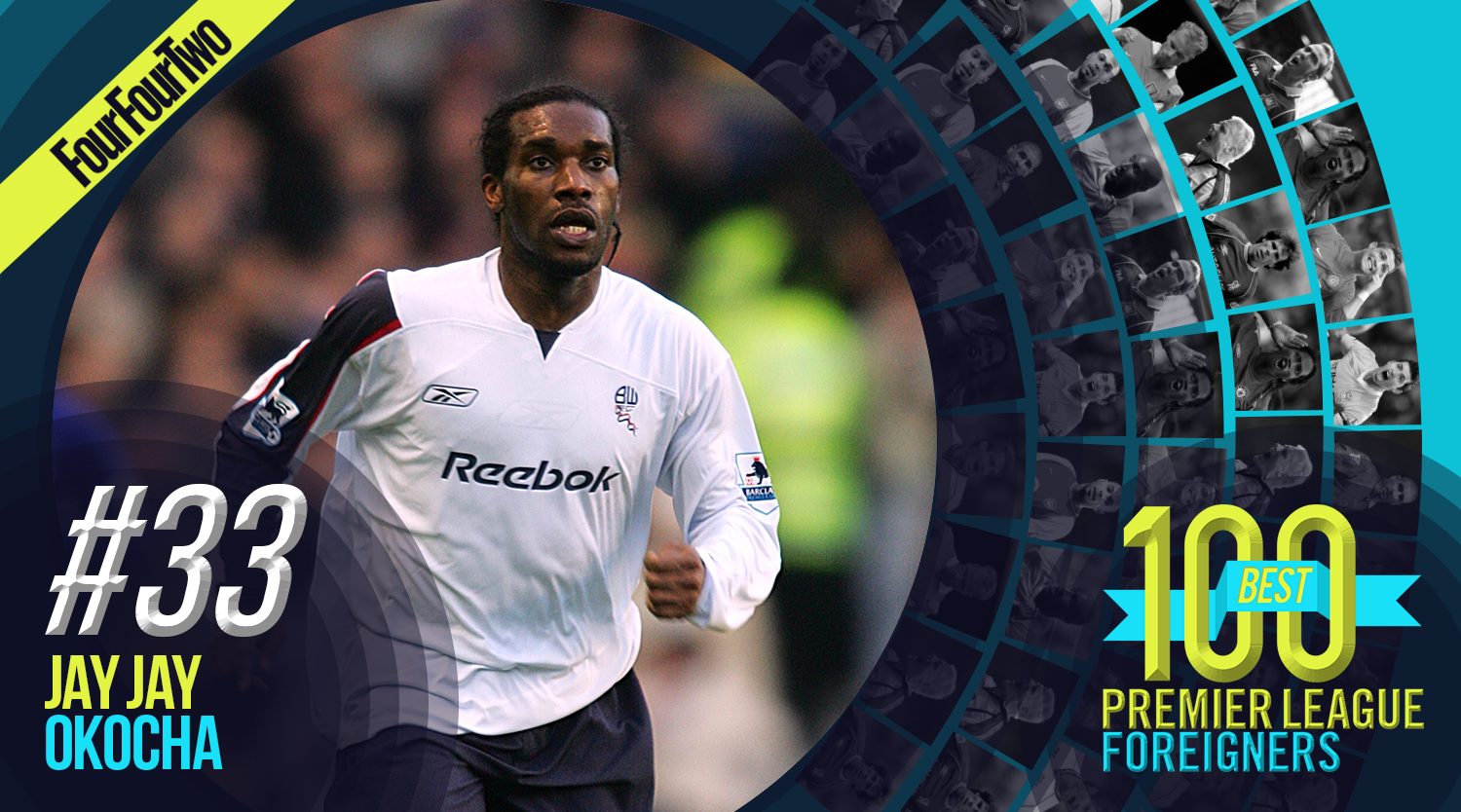
33. Jay-Jay Okocha
Okocha almost single-handedly rescued Bolton from relegation trouble in his first season at the club, netting crucial long-range goals and dazzling the Premier League with a string of outrageous skills and showboats that embarrassed a host of opponents. For half a year, the Nigerian wasn't far from being the best player in the league – even at Bolton.
He'd stay for a total of four years, assuming the role of captain and guiding Wanderers into Europe for the first time in their history, establishing himself as one of the club's greatest ever players.
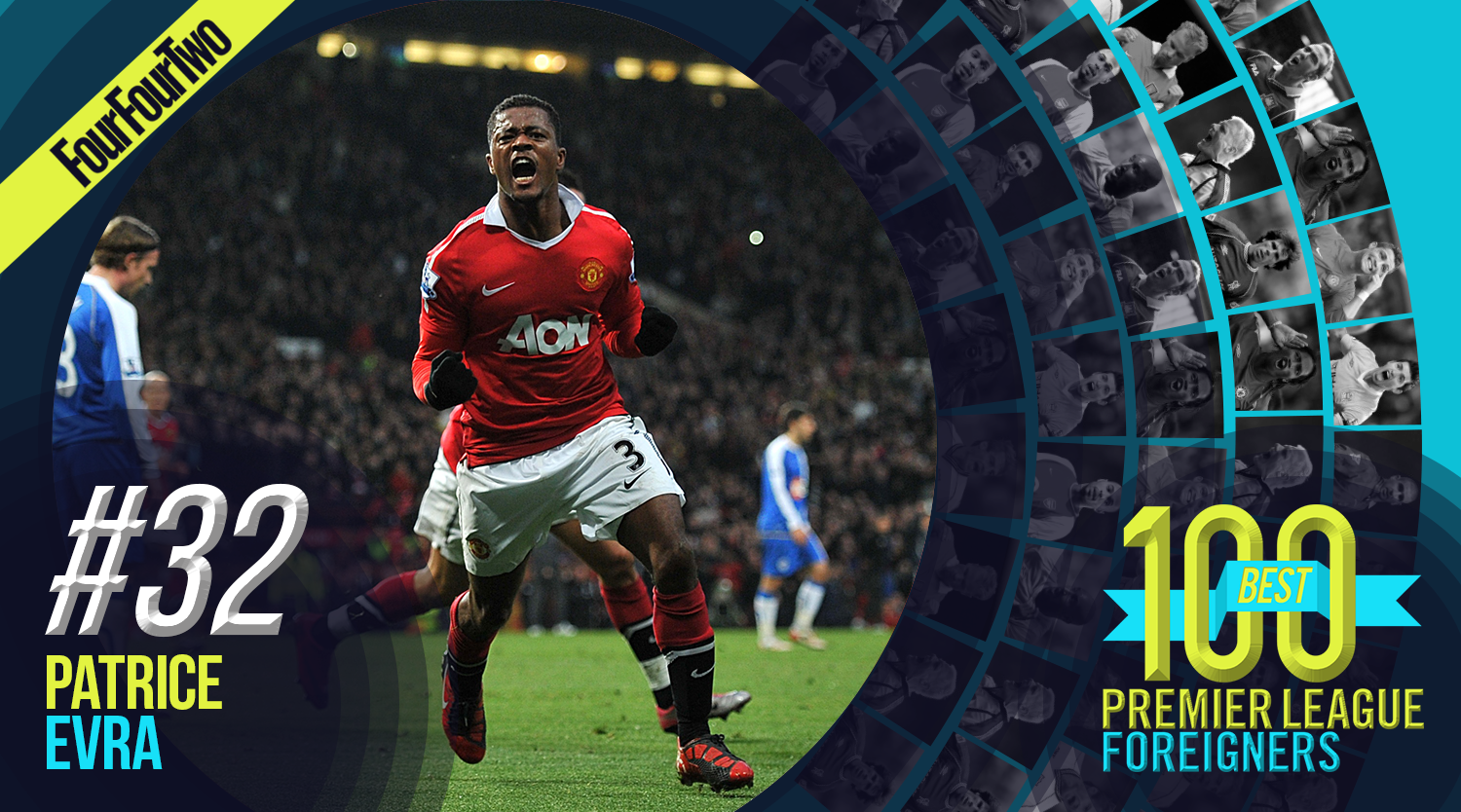
32. Patrice Evra
On his debut against Manchester City, Evra was bullied by Trevor Sinclair, replaced at half-time and awarded a 0/10 for his performance by a British tabloid. Over the next 378 games, however, he had the last laugh: by the time of his departure in 2014, he'd won the Premier League five times, the Champions League once and become one of the finest attacking full-backs in Europe.
The Frenchman had a texture to him, too, and became a weightier figure in the United dressing room towards the end of Alex Ferguson's career.
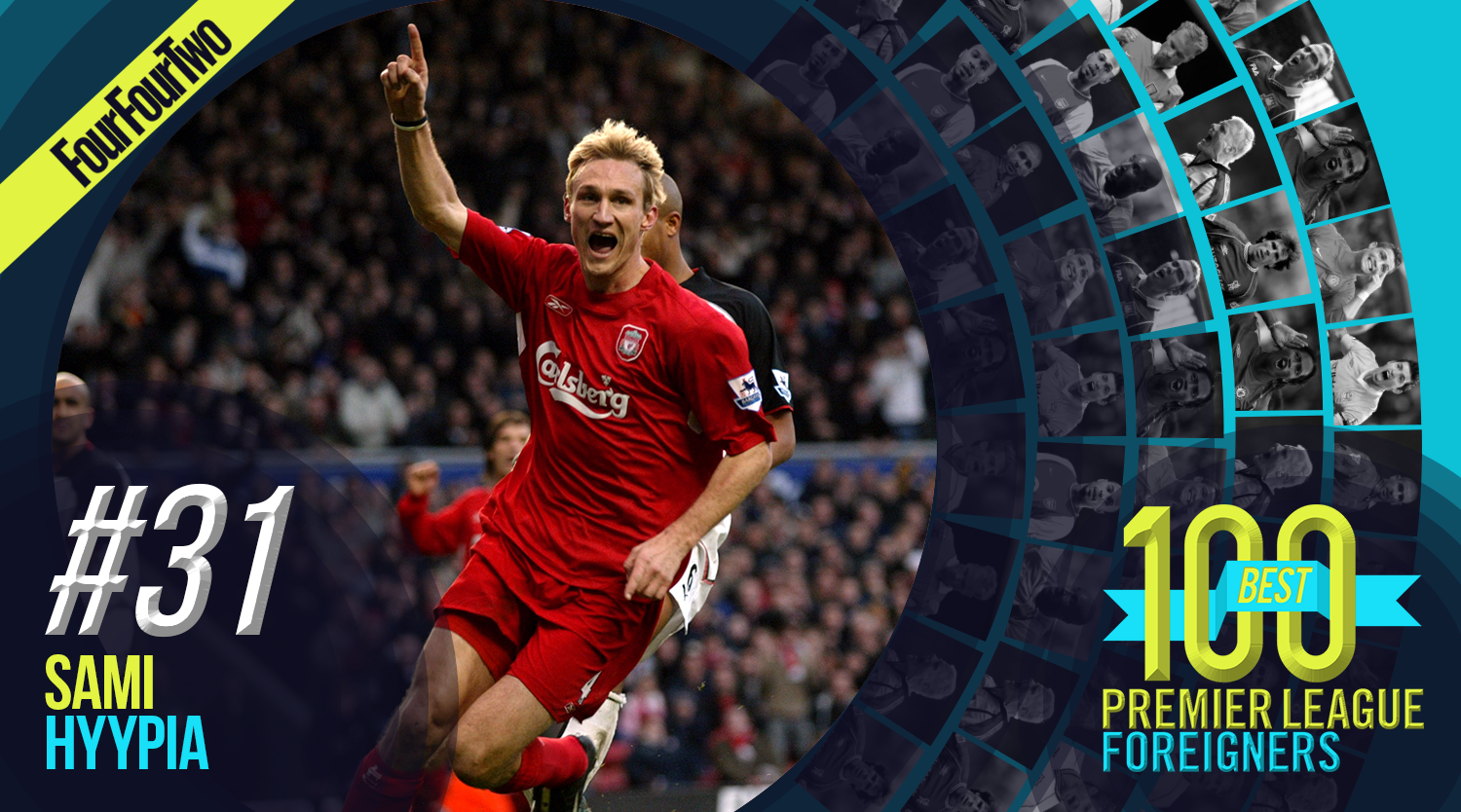
31. Sami Hyypia
Sami who? That was the reaction of most Liverpool fans when Hyypia joined the Reds in 1999. The centre-back was hardly the sort of name to set pulses racing, but by the time he'd left Anfield a decade later, Hyypia had established himself as one of the most popular players in the club’s recent history.
Starting with a barmy UEFA Cup triumph over Alaves in 2001, Hyypia played a central role in a succession of cup triumphs throughout the noughties. Nestled alongside Liverpool’s fabled triumph over Milan in 2005, there were two FA Cups and two League Cups.
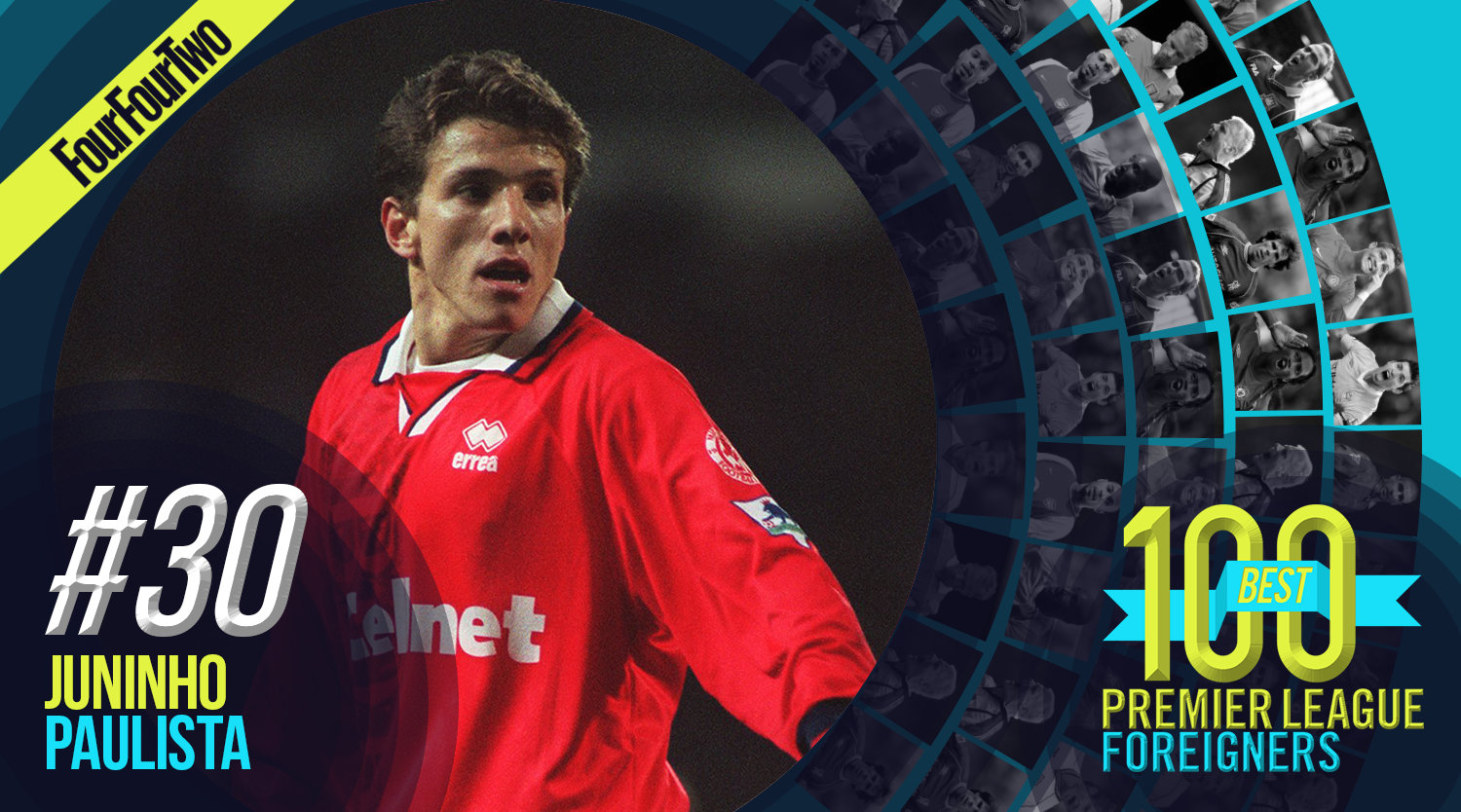
30. Juninho
It was impossible not to be charmed by the effervescent way Juninho lit up Teesside after choosing Middlesbrough over myriad European suitors, all eager to sign this 22-year-old midfielder who’d already won the Brazilian league, Copa Libertadores and Intercontinental Cup.
What made Juninho special wasn’t his delectable first touch, nor his unique ability to hurdle a tackle, nor his hip-wiggling forward runs, baggy shirt billowing in the wind – though special they certainly were. It was his love for the game and his adopted home, palpable in his joyful kick-abouts with local children and his painful tears upon Boro’s relegation.
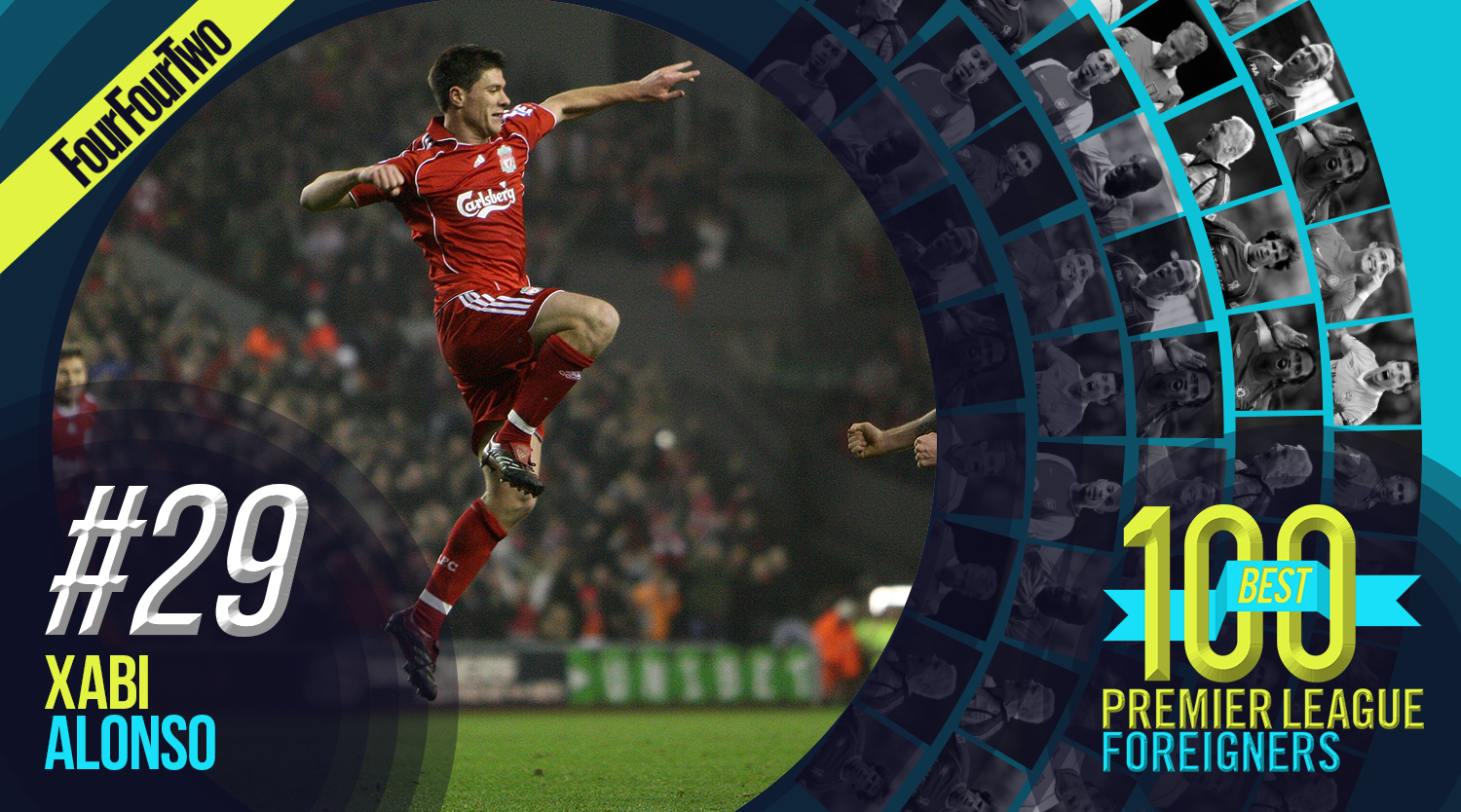
29. Xabi Alonso
Some players strike the ball with venom. Alonso passed it with venom. And with profound intelligence, too – his ice-cool awareness was vital in the Liverpool side that soared under Rafa Benitez before the effects of ruinous ownership took hold.
One senses that English football's wider world only came to appreciate the midfielder after he'd started to assemble a clean sweep of football's major trophies with Real Madrid, Bayern Munich and Spain. That any discussion of Alonso on these shores inevitably turns to his contentious departure from Liverpool is testament to his influence while he was here.
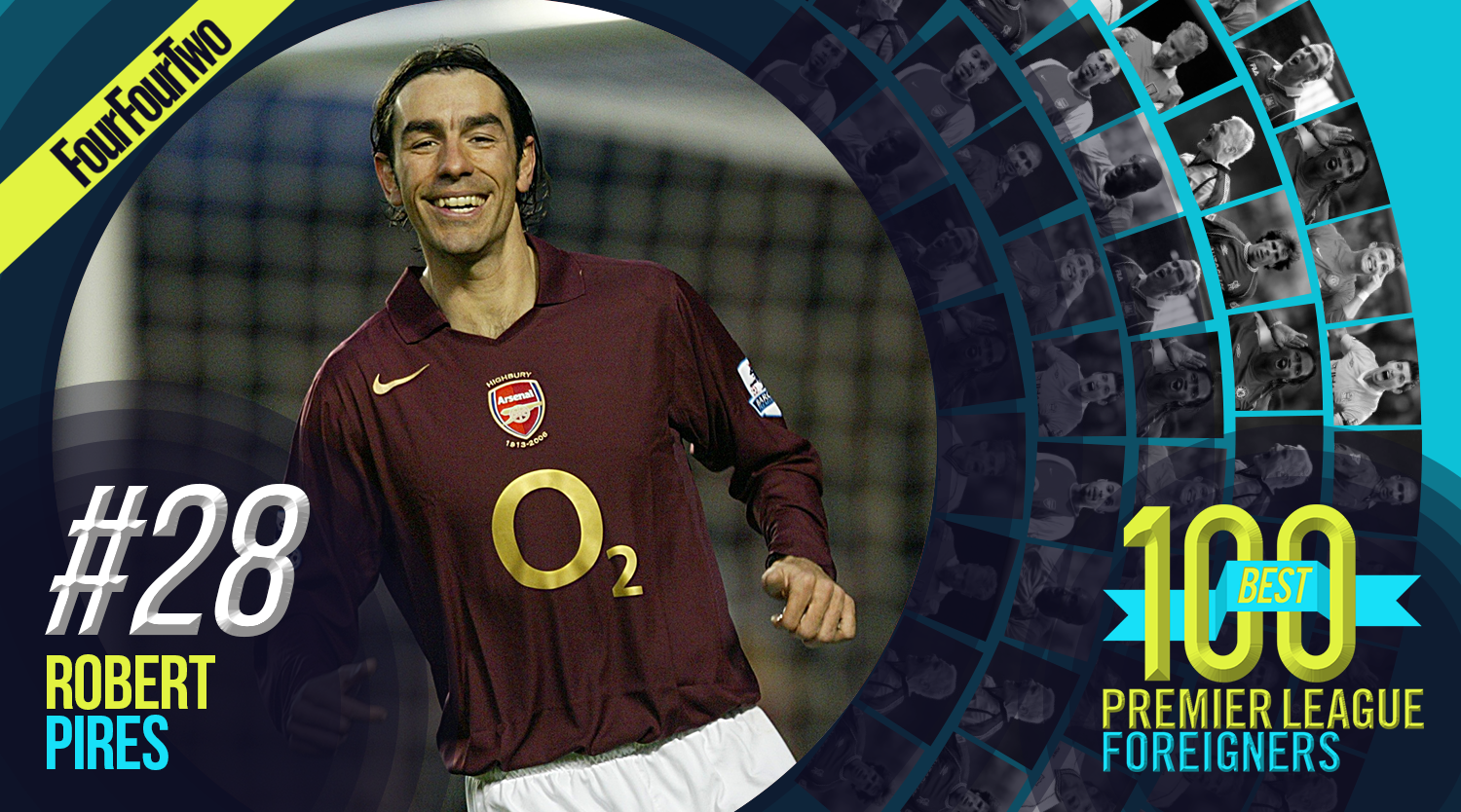
28. Robert Pires
He may not have been the quickest winger to ever grace Highbury, but Pires had a style and elegance to his game that granted him hero status in N5.
In 2001/02 he was devastatingly effective, the highlight being his lobbed goal over a bewildered Peter Schmeichel at Villa Park as Arsenal closed in on the Double. Although a knee injury ruled him out of the end-of-season celebrations, Pires was as potent as ever in the ‘Invincibles’ year.
His Arsenal career ended in the 2006 Champions League Final in Paris, when he was controversially substituted following goalkeeper Jens Lehmann’s sending off.
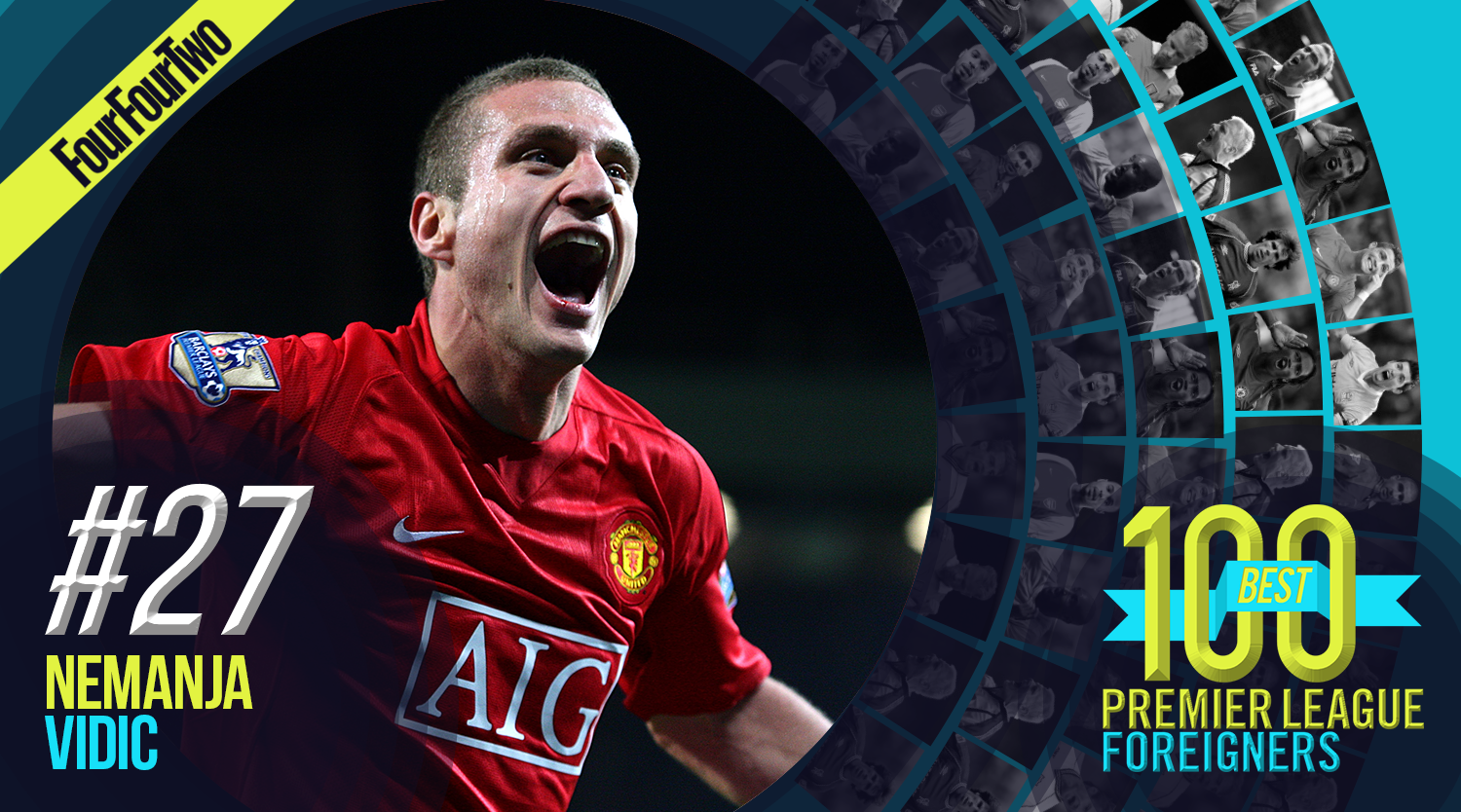
27. Nemanja Vidic
Arguably the best British-style centre-half of the last two decades was a Serbian who arrived from Russia. Vidic bore all the hallmarks of a defender schooled in the blood-and-thunder traditions of the English game: a towering leap, a complete absence of frills, a Terminator-like inability to sense physical pain.
He and Rio Ferdinand formed one of the best centre-back partnerships of the Premier League era. United’s 2008/09 side is remembered for a sparkling forward line of Tevez, Rooney, Ronaldo and Berbatov, but perhaps even more impressive was the defence which kept a ludicrous 14 successive clean sheets that autumn.
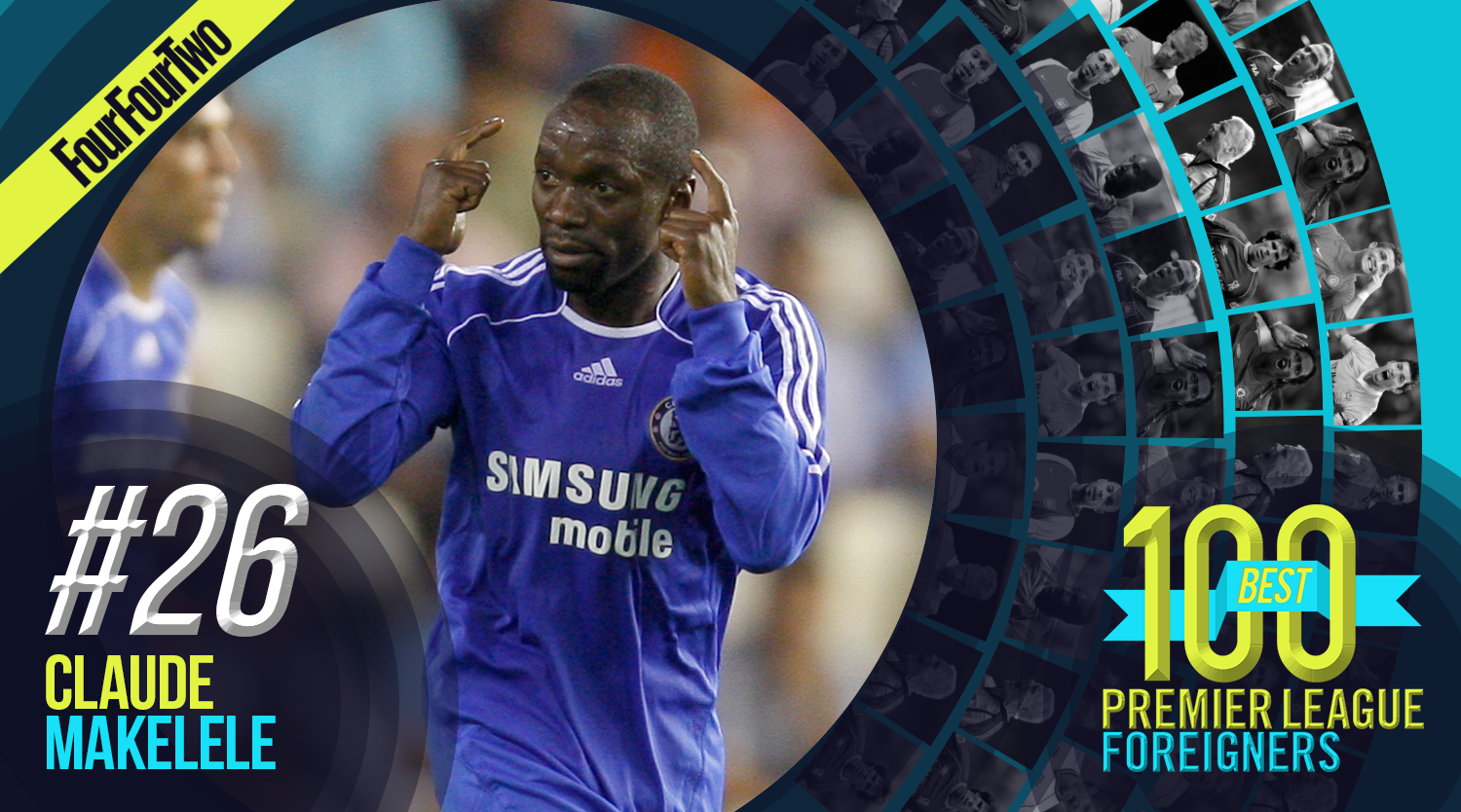
26. Claude Makelele
Despite being perhaps the best defensive midfielder of all time, Makelele rarely made a tackle. Rather, he specialised in stealing possession through subtler, more sophisticated means: nicking it off the toes of an opponent, or appearing from nowhere to intercept a pass and start Chelsea’s attacks.
Bossing a league obsessed with aggression, the 5ft 6in France international soon established such hegemony over his position that it was named after him. Vital to Jose Mourinho’s dominance of English football and thus to recent footballing history, Makelele was a one-man lesson to an entire country’s football culture.
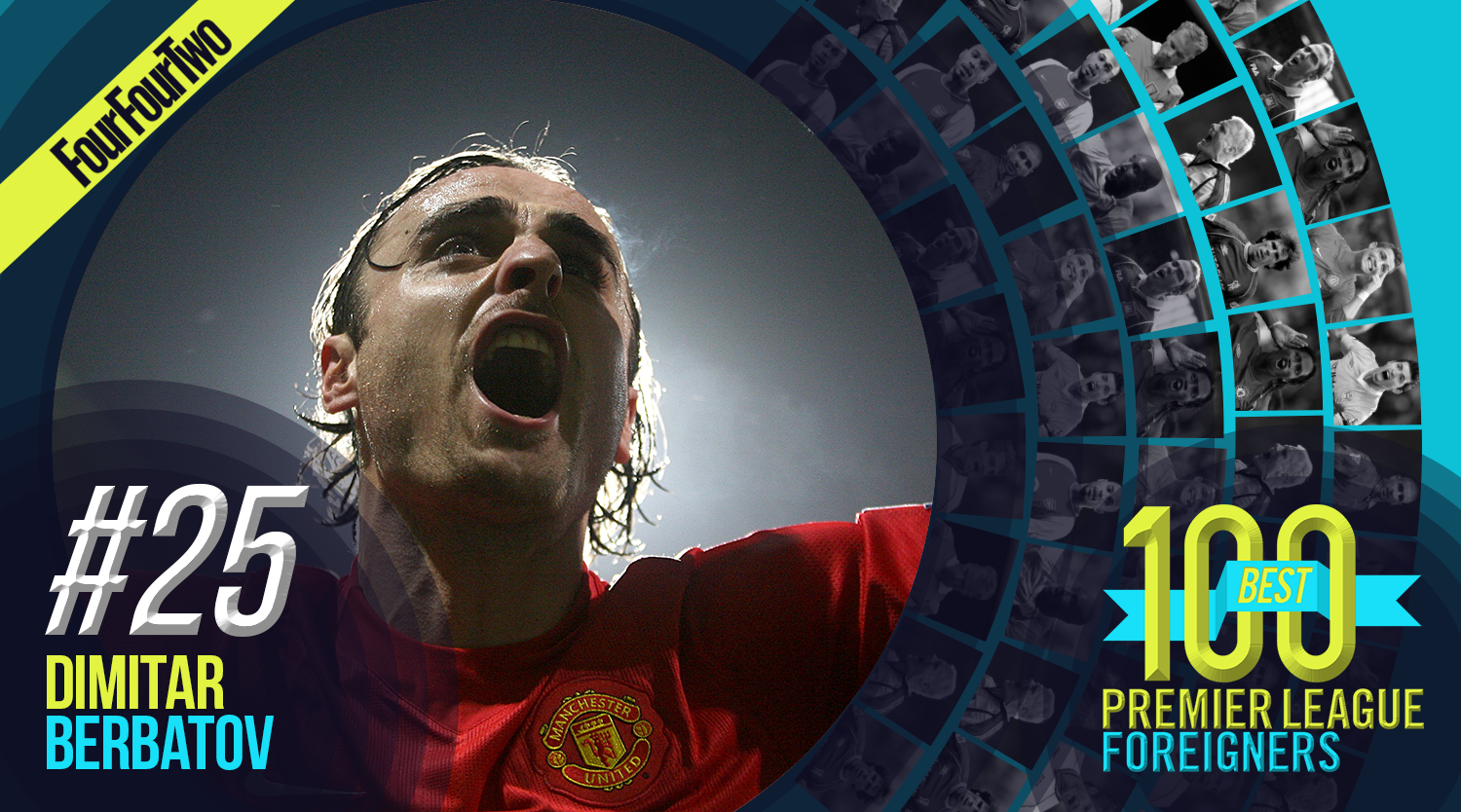
25. Dimitar Berbatov
Manchester United eventually gave Berbatov the stage his talent deserved, but it was an opportunity his personality probably stopped him from taking. The Bulgarian enjoyed success, but his lasting reputation was established at White Hart Lane as Tottenham's talisman.
To see him play live was to know what he was: to hear the crowd gasp their admiration for one of his gentle touches or celebrate the artistry of his goals. Berbatov was part-footballer, part-comic book hero; a ridiculous blend of ability and indifference. Spurs, United and Fulham supporters will all have the same appreciation for his swaggering class.
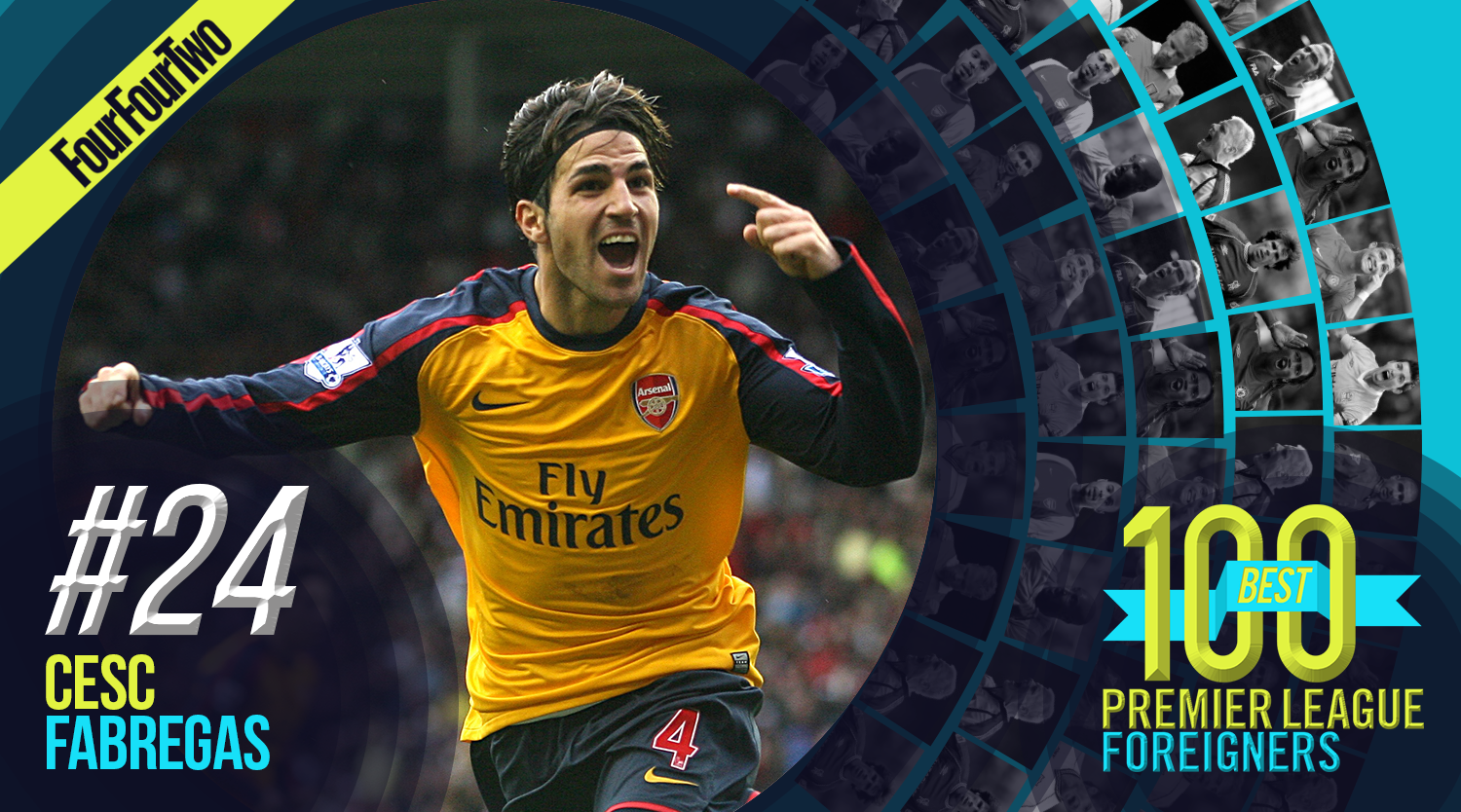
24. Cesc Fabregas
It remains a source of regret for Arsenal fans that the Spaniard won the Premier League title with Chelsea and not with the club for whom he became the youngest-ever debutant, aged 16 in October 2003.
Displaying a level of maturity beyond his years, Fabregas immediately brought a creativity and range of passing to the Gunners’ first team; Patrick Vieira’s departure in 2005 made the 18-year-old Arsenal’s midfield lynchpin. A move back to Barcelona followed, before Fabregas returned to the Premier League in 2014 and finally captured the prize that had eluded him – not once, but twice.
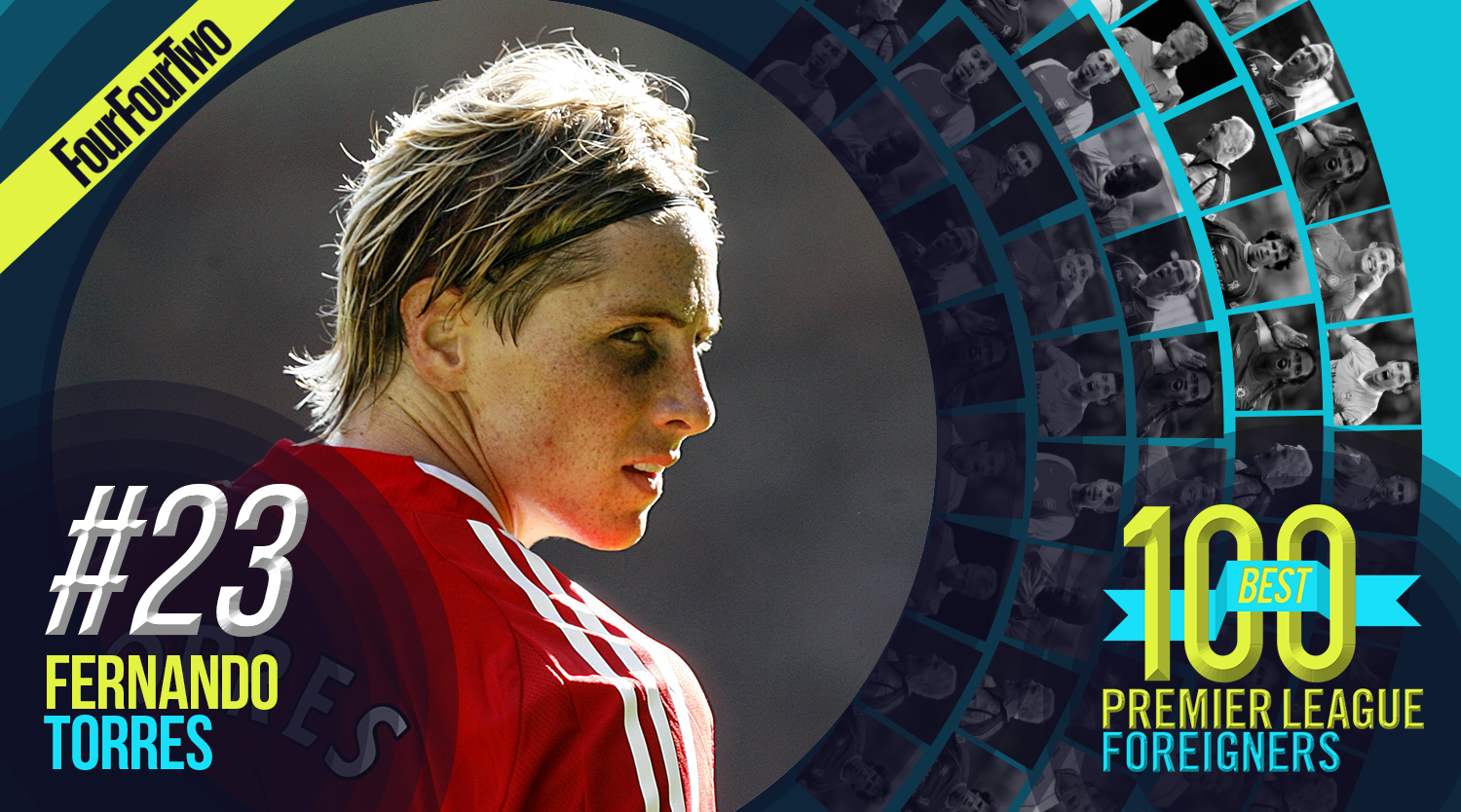
23. Fernando Torres
Liverpool were richly rewarded after snapping Torres up for a club-record fee: 81 goals in 142 games, and a telepathic understanding with Steven Gerrard. In 2008/09, the pair nearly delivered the club’s first league title since 1990 and terrified domestic and continental defences alike.
If Torres’s peak arrived at Anfield, the trophies came after his acrimonious transfer to Chelsea in January 2012. His record at Chelsea was better than you’d think – 45 goals in 172 games – and Blues fans will always remember that goal at the Camp Nou en route to the 2012 Champions League triumph.
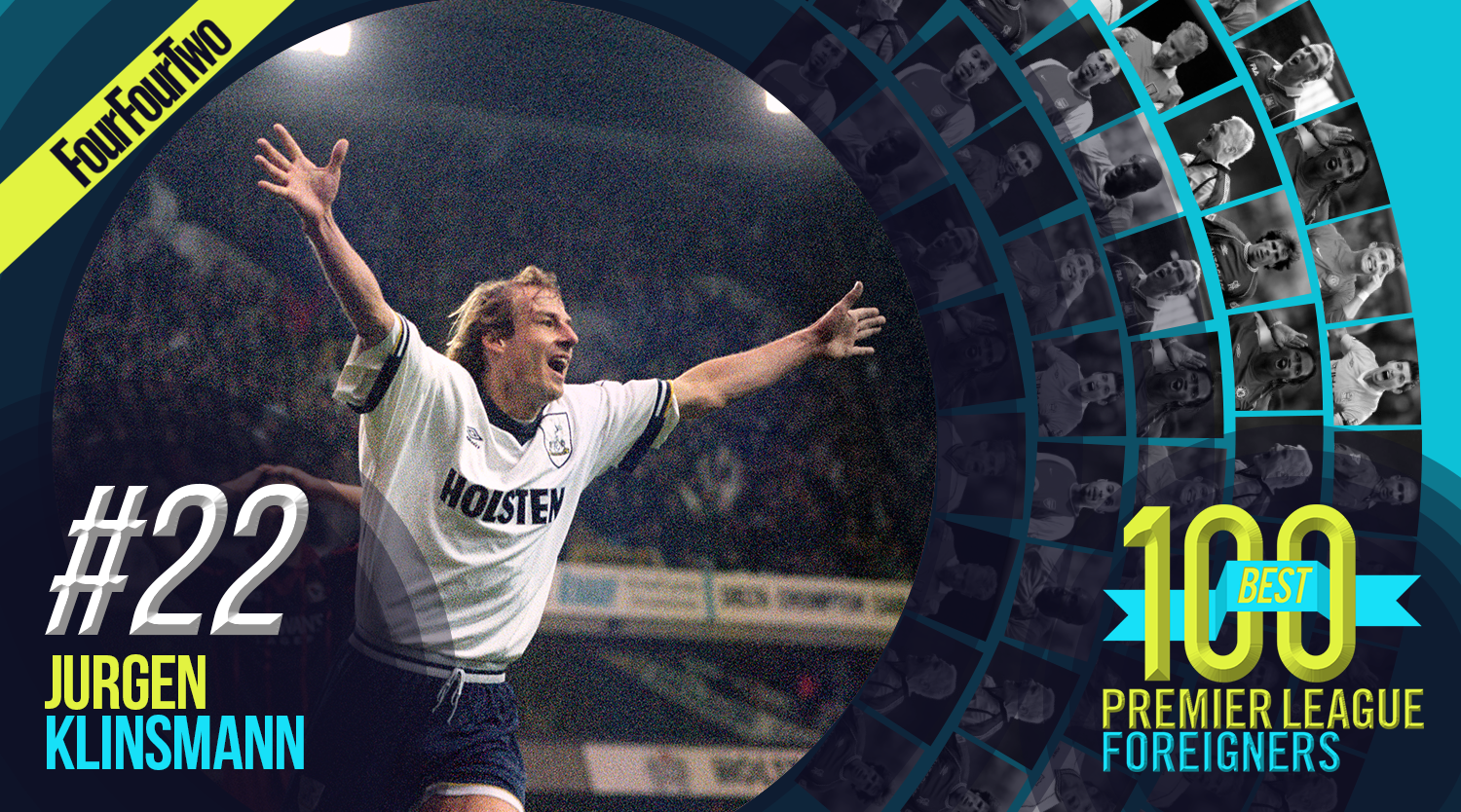
22. Jurgen Klinsmann
A story in two parts: the arrival and return. Given who he was and who they were, Tottenham fans will admit that Klinsmann didn't fit the picture when he signed from Monaco in 1994. History tells us that he blended brilliantly with Ossie Ardiles's lopsided team, but the German was arguably the best in Europe at the time and neither Spurs nor the Premier League could make any such claim.
He would return from a prolific two-year stint with Bayern Munich in 1997/98; although he wasn't the same, Klinsmann’s goals still lifted Spurs away from the relegation zone.
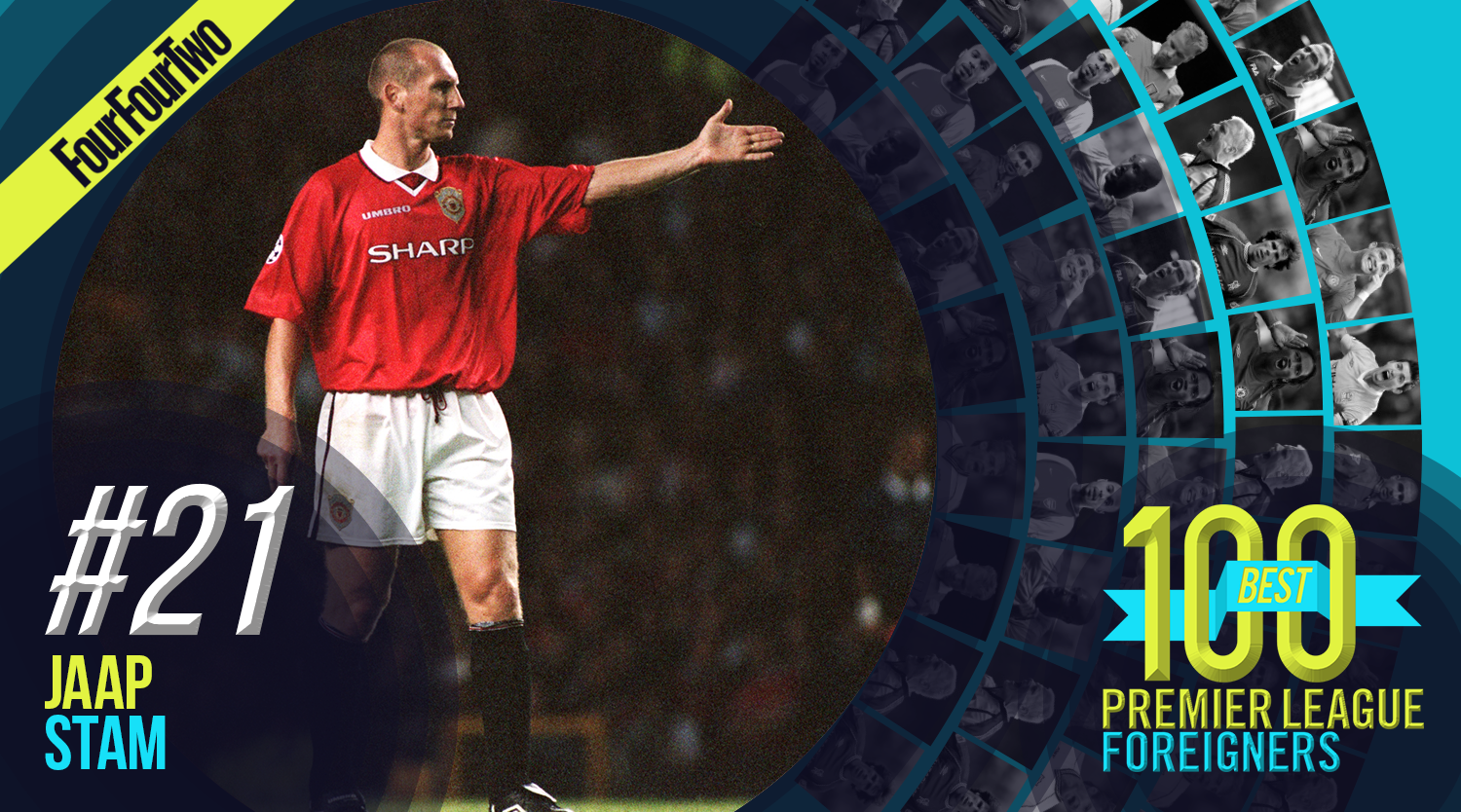
21. Jaap Stam
Now aiming to return to the Premier League as a manager with Reading, Stam was a defensive colossus for Manchester United during a trophy-strewn period for the club.
The Dutchman had arrived at Old Trafford from PSV Eindhoven with an already sizeable reputation, and despite moving for a world record fee for a defender (£10.6m), the price tag – like countless Premier League strikers – was brushed aside dismissively. Stam spent three seasons at the club and was part of the side that created history by winning the League, FA Cup and Champions League in 1999.
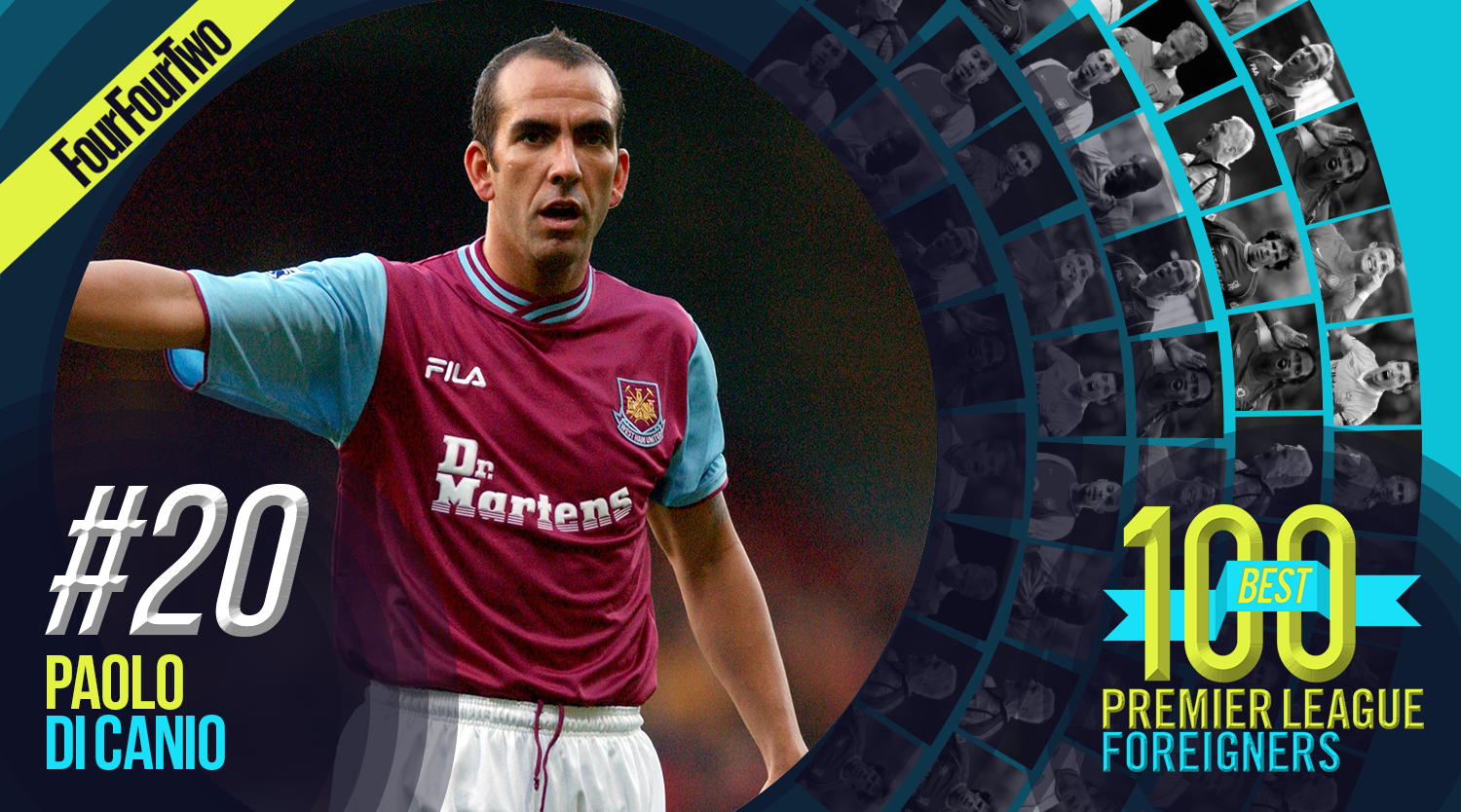
Paolo Di Canio
Di Canio held some suspect political views, but he also possessed one of the great right boots of the modern era, immortalised with the kung-fu volley he sent searing past Neil Sullivan in March 2000.
The Italian had stints at Sheffield Wednesday and Charlton, but by far his most impressive spell in England came sandwiched between those, with four years at West Ham. During that time he offered all the hallmarks of a cult hero: oodles of technical talent, a wild temperament and a showman’s eye for the spectacular.
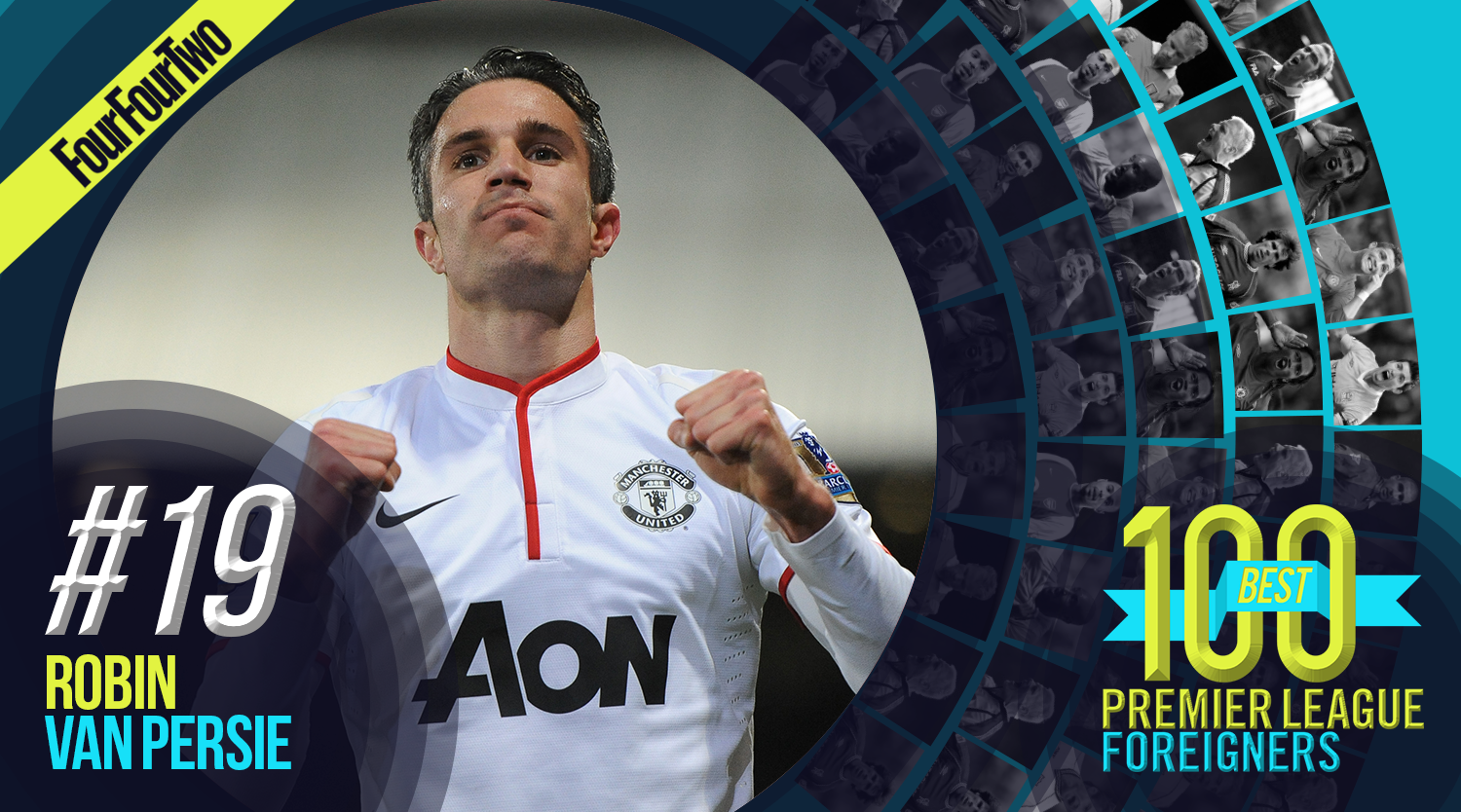
19. Robin van Persie
The 21-year-old arrived at Highbury in 2004 for £2.75m, a snip for a club basking in the afterglow of the ‘Invincibles’ season. His early career was dogged by injuries; Arsenal were in with a chance of the title in 2008 and 2011, with a fully-fit Van Persie arguably the missing piece of the jigsaw.
A return in March 2011 heralded a 14-month golden spell in which the striker barely stopped scoring as Arsenal secured Champions League football. But Van Persie wanted more: he duly joined Manchester United and went on to win the Golden Boot and the title in 2012/13.
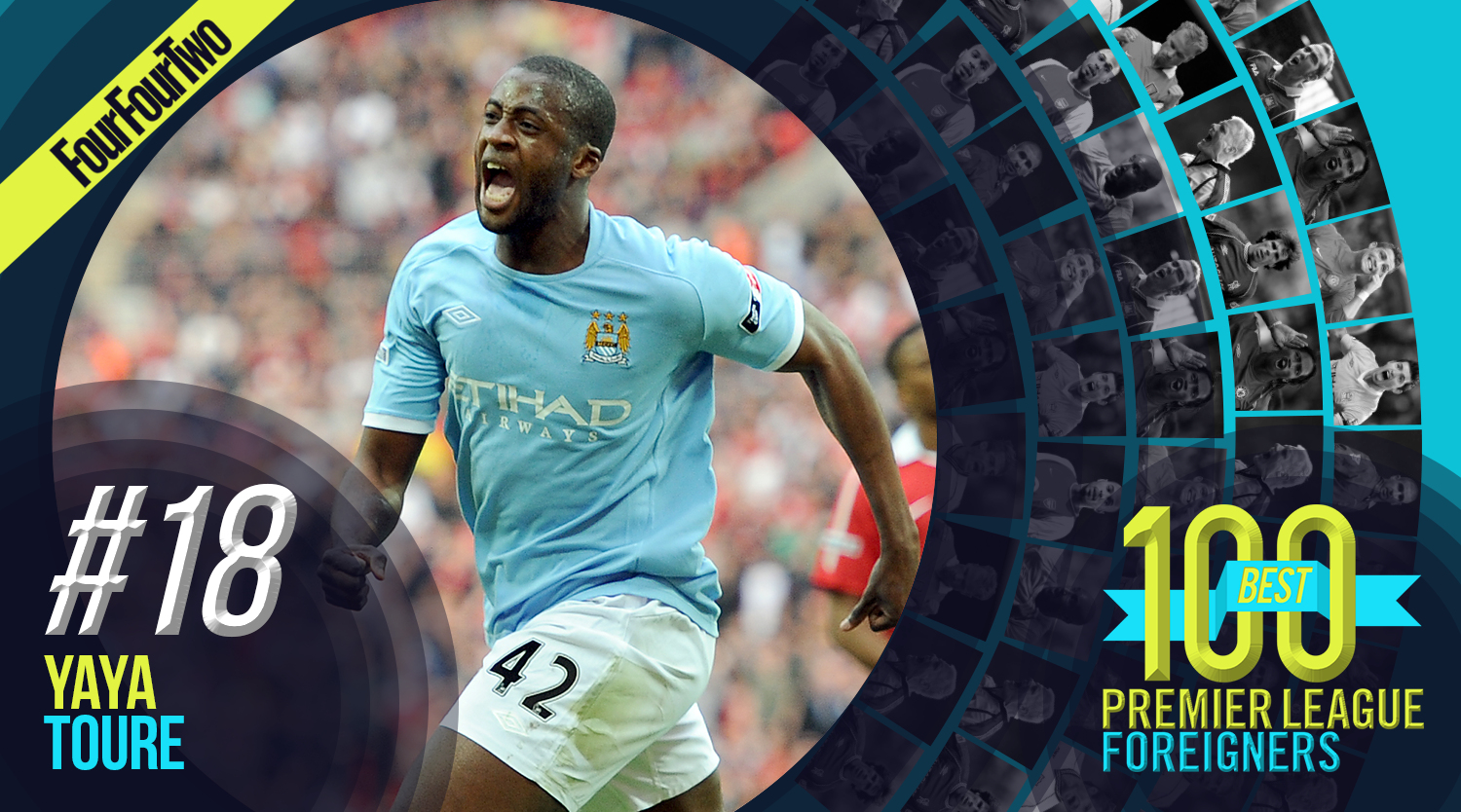
18. Yaya Toure
Something of a football nomad before arriving at the Etihad in 2010 – he’d played in Belgium, Ukraine, Greece, France and Spain – Toure settled quickly in Manchester. He evolved, too, from a defensive midfielder into something altogether more all-action. Sixty-two Premier League goals – and counting – is an impressive haul for a midfielder who's played one-third of his games as an anchor.
His displays in winning the 2013/14 title – ahead of a Luis Suarez-inspired Liverpool – warrant special mention. Before that season, Toure hadn’t managed more than eight league goals in a single campaign. That term, the talismanic Ivorian scored 20.
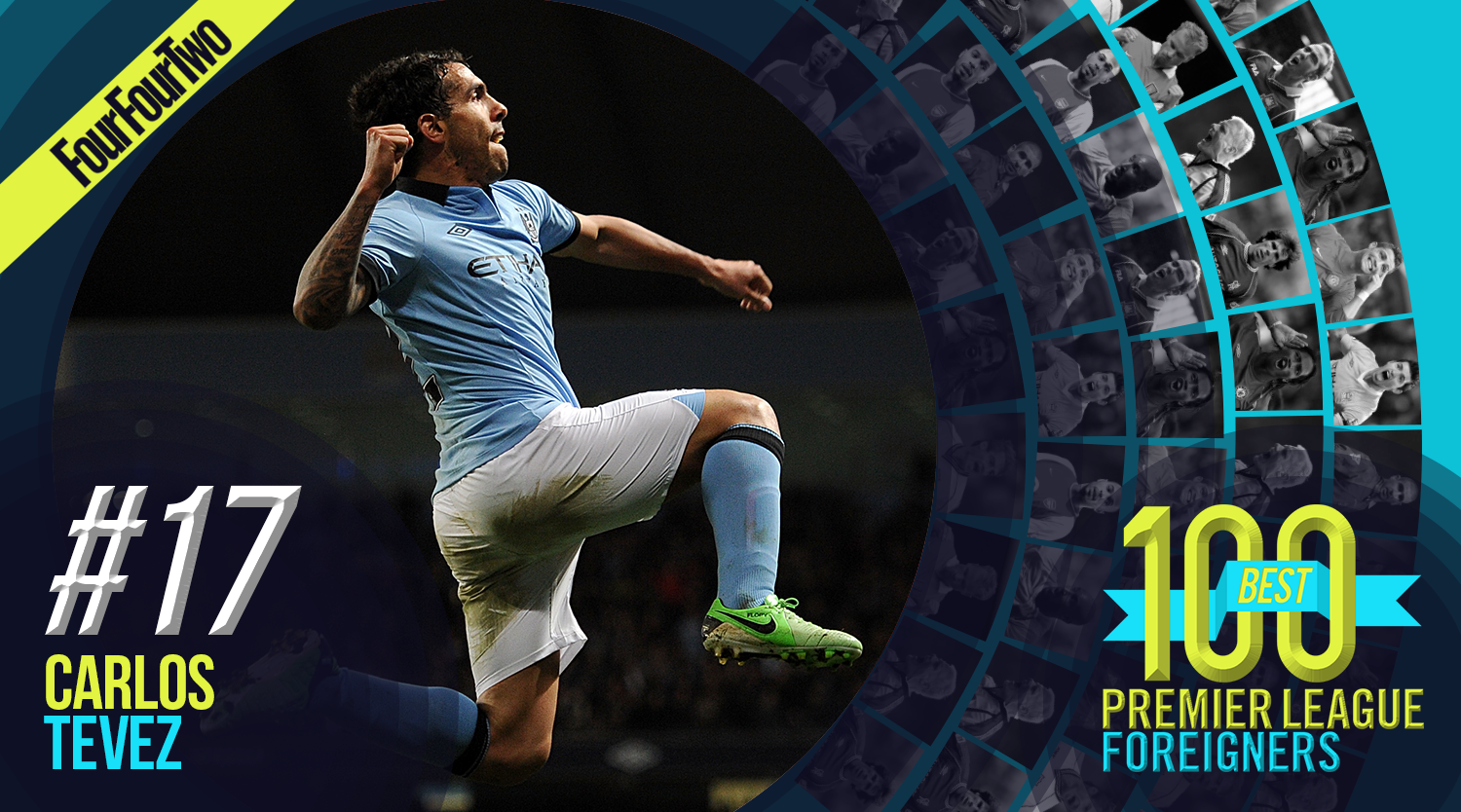
17. Carlos Tevez
Tevez’s all-action performances at the tail end of the 2006/07 season quite literally saved West Ham from relegation, and at Manchester United he became an integral part of Ferguson’s last great team; the Ronaldo-fronted, all-conquering side of the late-noughties.
It was at Manchester City, though, that he proved both most troublesome and most invaluable: his five-month strike in 2011 was brattish and absurd, yet his very presence at the club, having defected from United, functioned as the proof and embodiment of the new-look City’s ambition to overhaul their neighbours at the top of the food chain.
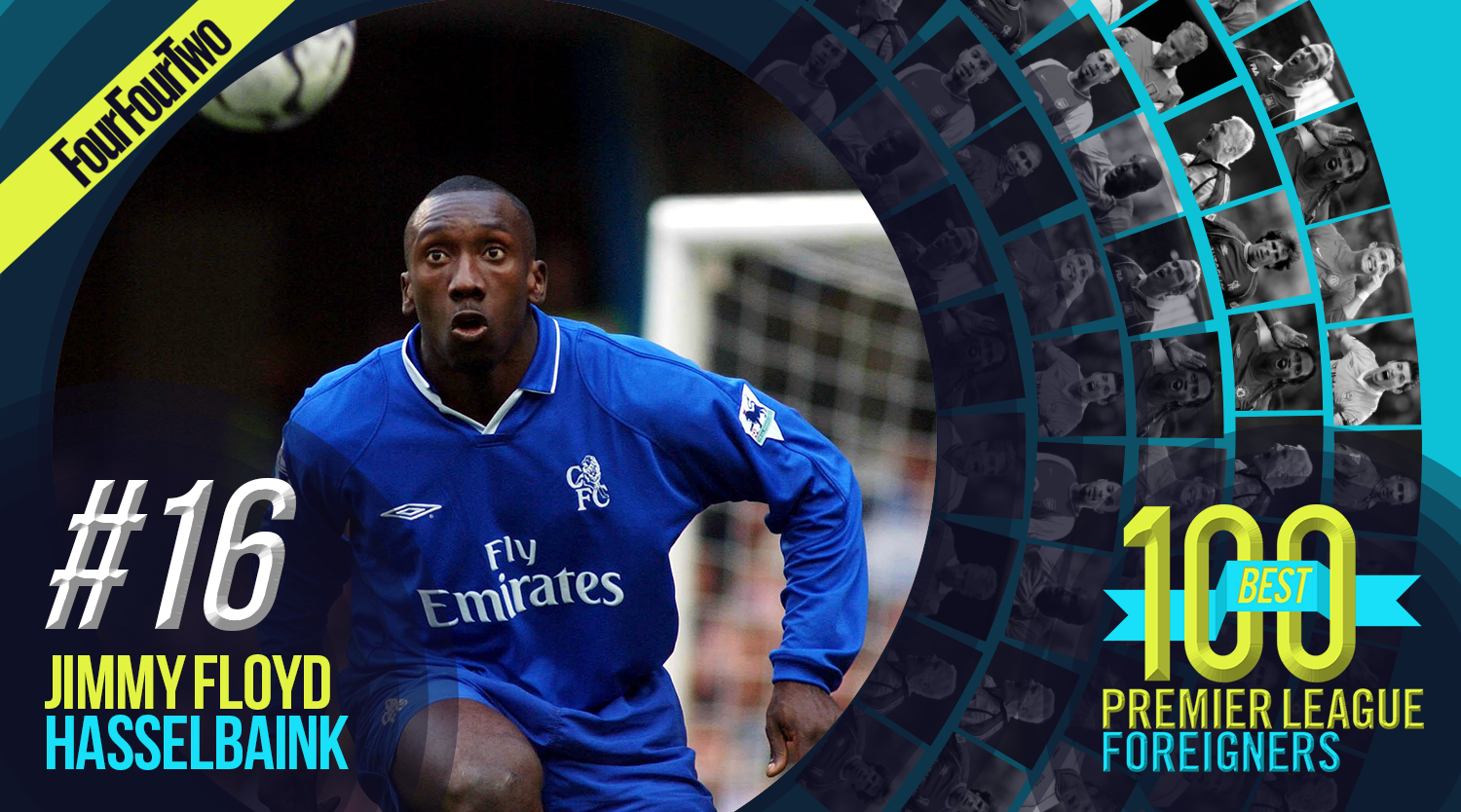
16. Jimmy Floyd Hasselbaink
Hasselbaink was a great player undone by bad timing: he left Leeds before they hit their brief peak under David O’Leary, departed Chelsea during the same summer that Jose Mourinho arrived to make the club a force of nature, and arrived at Middlesbrough the season after they won their only trophy of the modern era.
The Dutchman ended his career a runner-up in the Premier League, FA Cup and UEFA Cup, with only one major honour to his name (the 1996/97 Portuguese Cup). Still, 129 Premier League goals in 288 games speaks loudly.
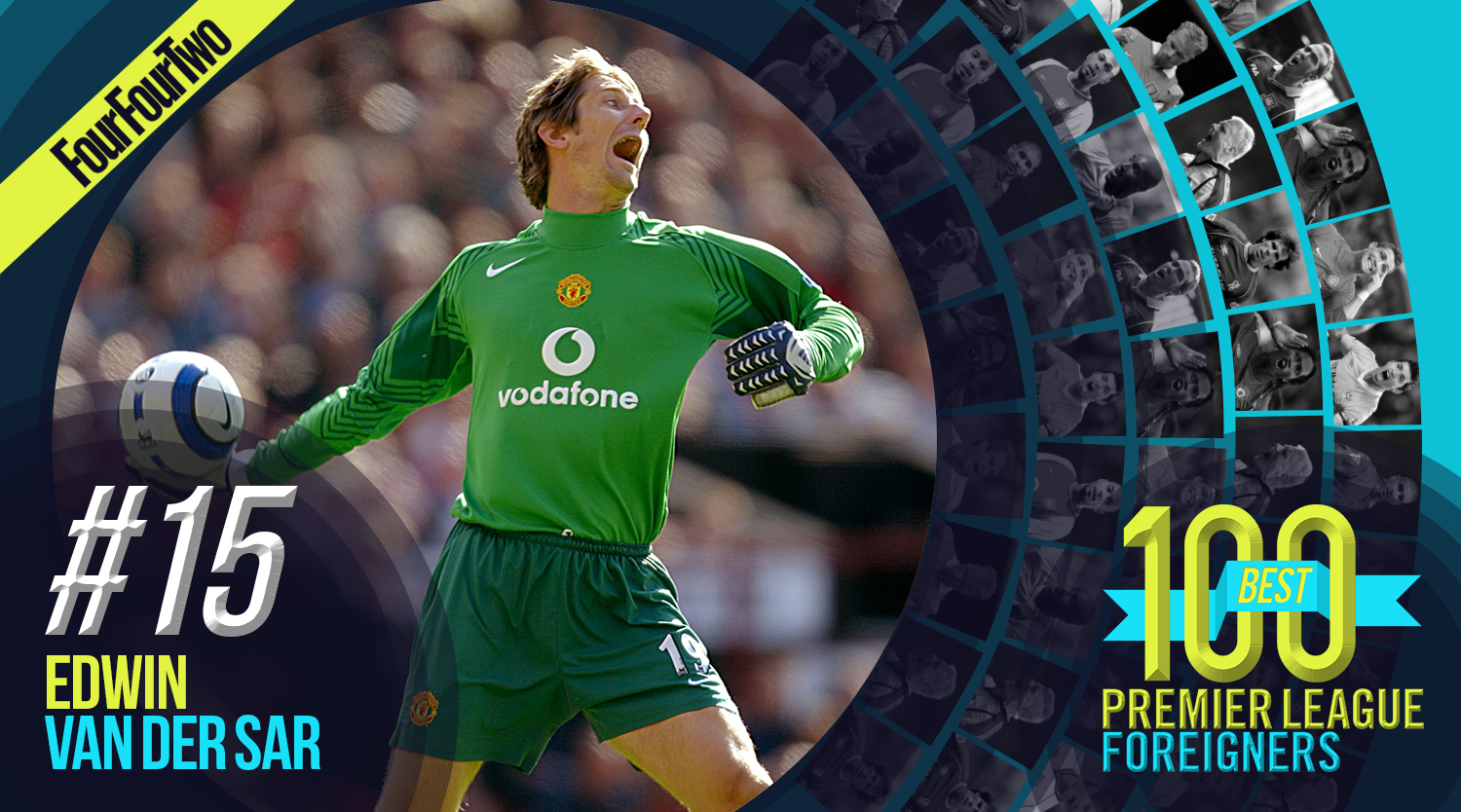
15. Edwin van der Sar
A move to Fulham from Juventus didn’t seem like an obvious one, but then Van der Sar always maintained the capacity to surprise. Between 2001 and 2005, he helped the Cottagers establish themselves in the top flight and proved himself to be one of the Premier League’s most consistent goalkeepers.
Then came a move to Manchester United, where Van der Sar – calm, composed and steely under pressure – won four Premier League titles and a European Cup. Throw in a record 1,311 minutes without conceding a top-flight goal in 2009/10 and it’s easy to see why the Dutchman is so feted.
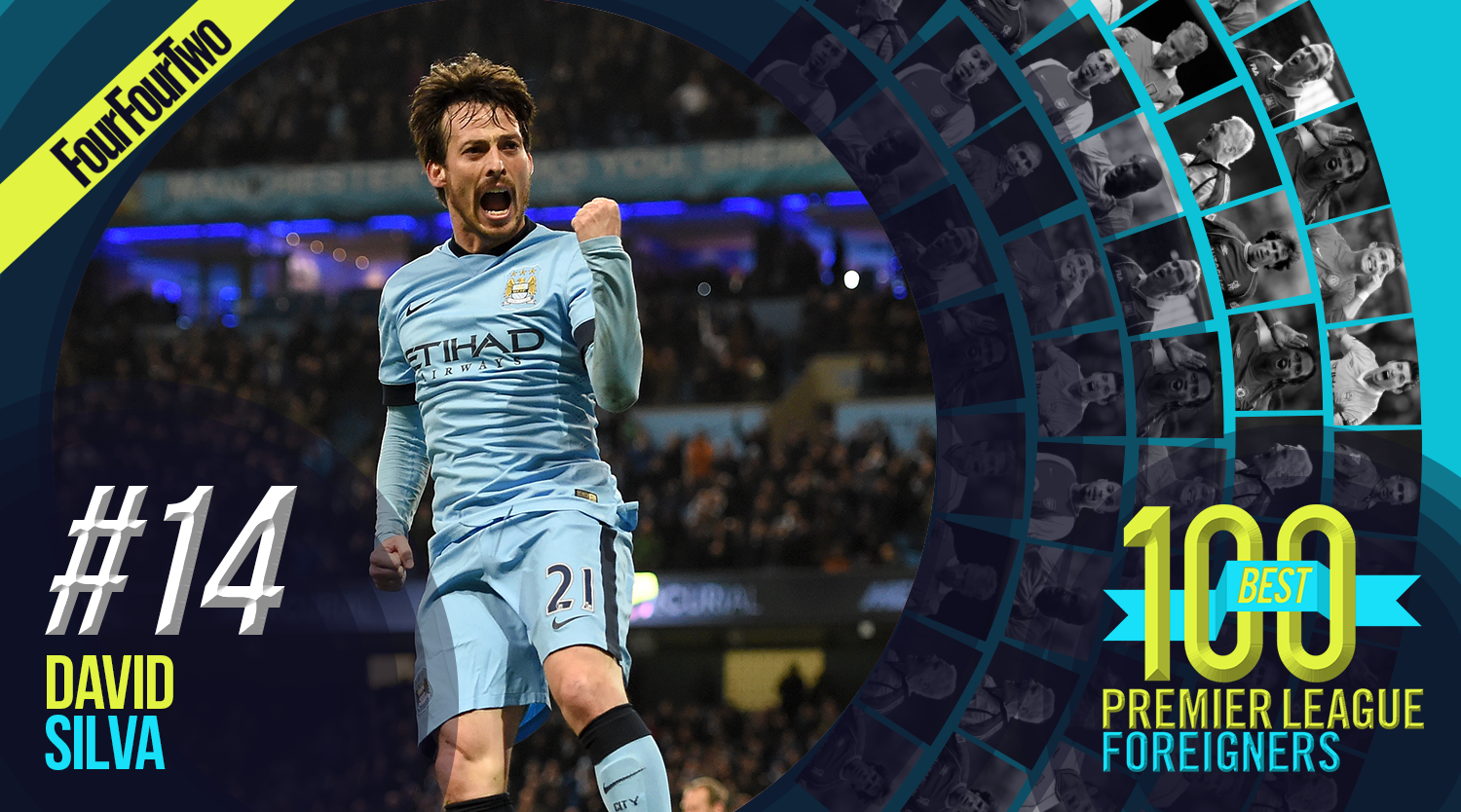
14. David Silva
A significant number of Manchester City supporters rate Silva as the finest player to have ever represented their club. Not just the finest foreigner, and not just during the Premier League era, either.
It's really not difficult to understand why: forget the goals, the numerous assists, and the two top-tier titles he's associated with, and remember the little moments. To watch the Spain international pirouetting away from opponents and escaping out of tight spaces is to see football at its most pure.
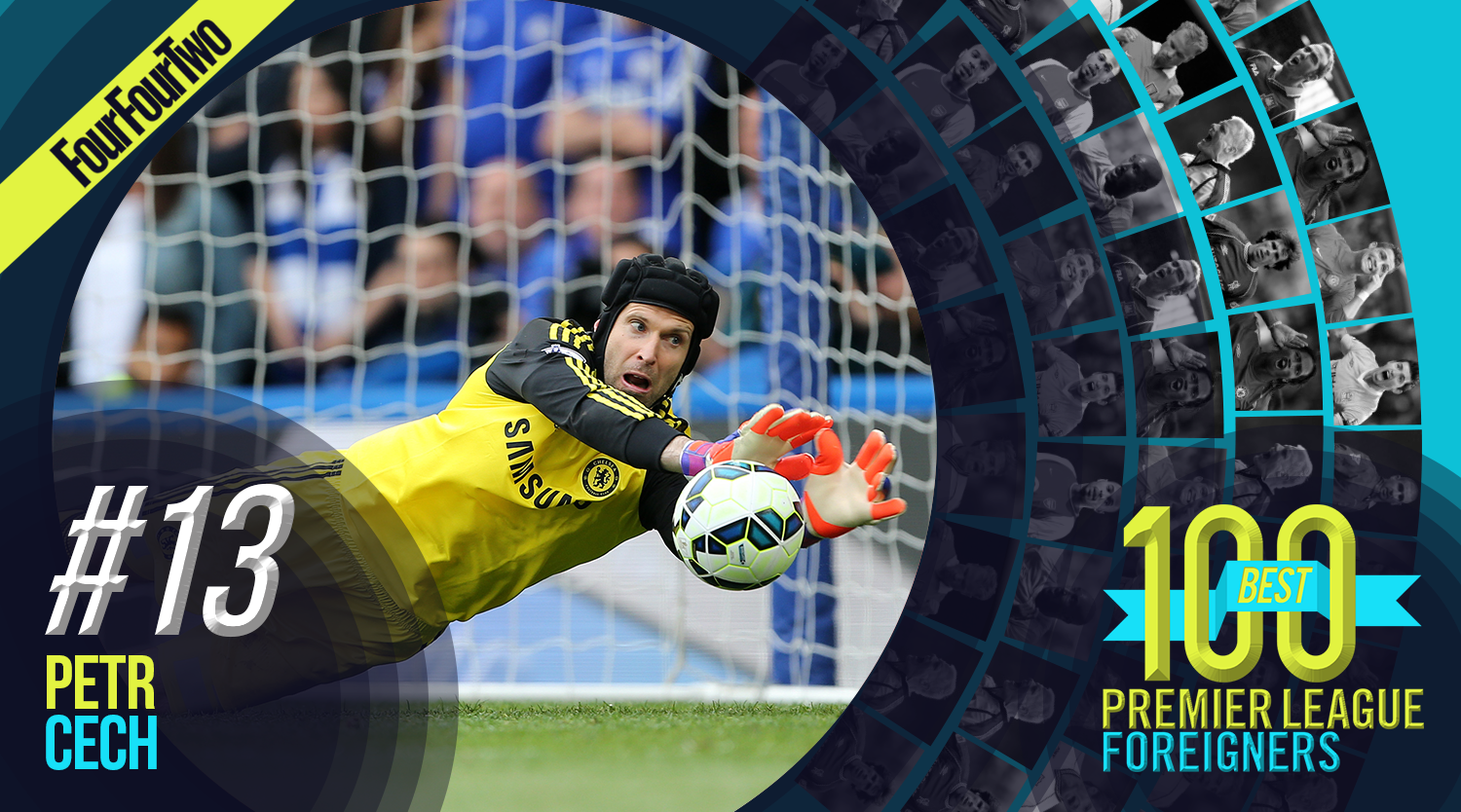
13. Petr Cech
There's a "before and after" point in Cech’s career: in October 2006, the collision with Stephen Hunt resulted in a fractured skull and, one has to imagine, an altered perspective. It's to Cech's great credit, then, that the incident's only legacy is visual – the scrum cap remains to this day, but so too do the high standards that he set before the accident.
The Arsenal custodian, who won 13 major honours as a Chelsea player, is an emblem of resiliency, a monument to longevity, but equally he's testament to the breadth of attributes required in an elite goalkeeper.
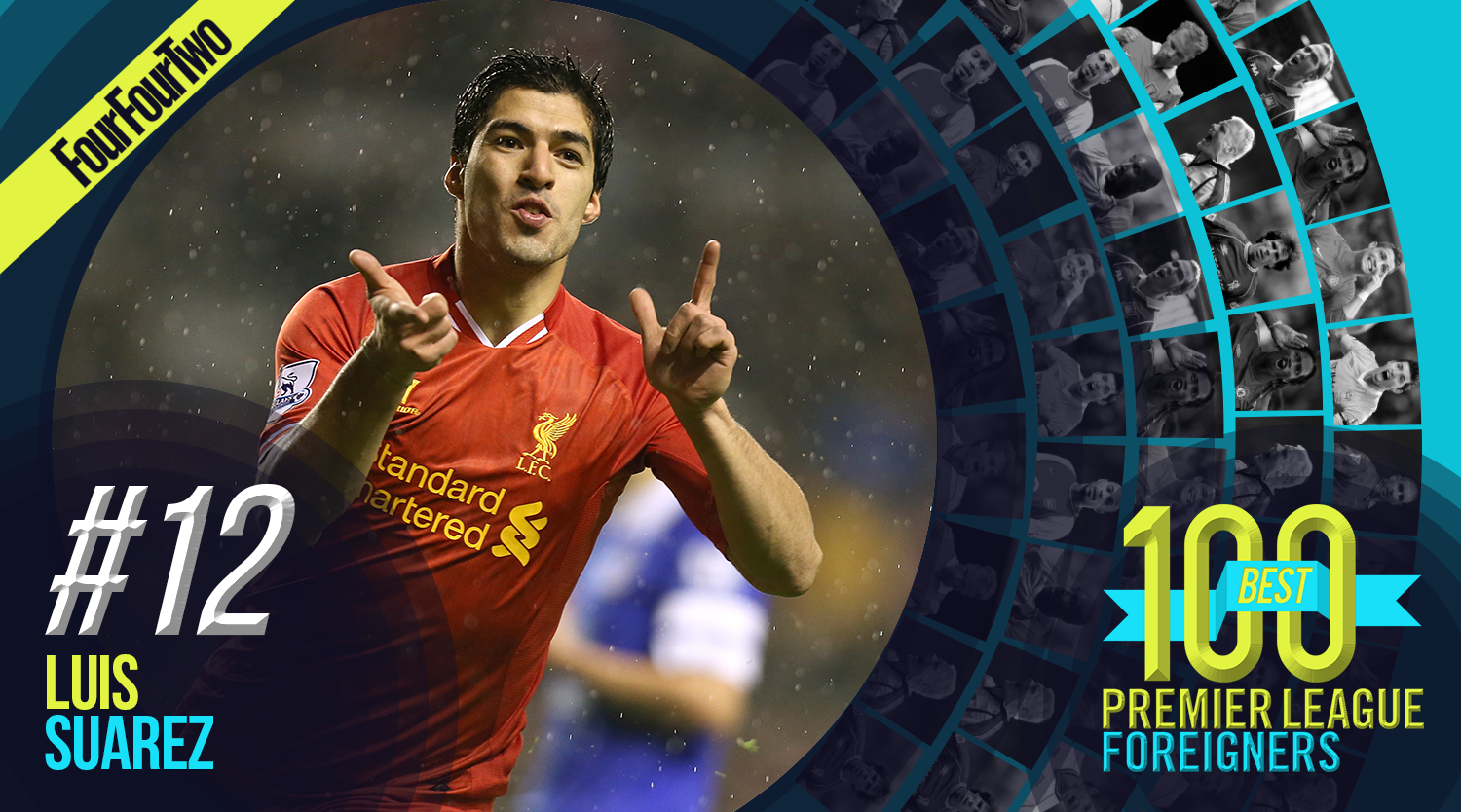
12. Luis Suarez
Following a £22.8m move from Ajax, Suarez scored just four times in 13 appearances Liverpool. But once he settled, he caught fire, a one-man forward line who could tie entire defences in knots.
In his last two seasons at Anfield, he scored 61 times from 81 games in all competitions, single-handedly leading Liverpool agonisingly close to a first top-flight title in 24 years in 2013/14. For that season, because of him, Brendan Rodgers' side were the most thrilling team to watch in world football.
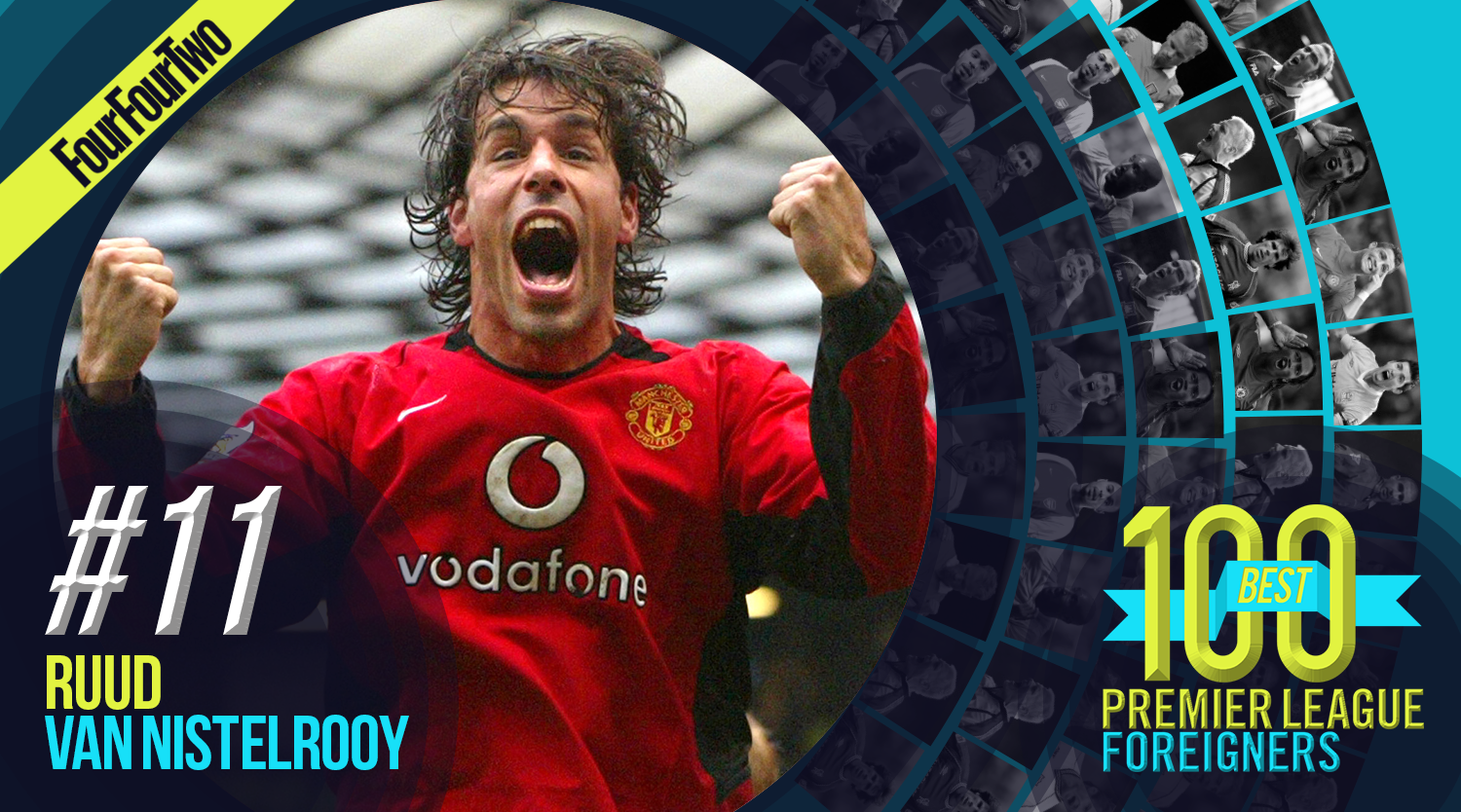
11. Ruud van Nistelrooy
The last great penalty-box striker, Manchester United waited a full year to sign Van Nistelrooy from PSV due to a serious knee injury he sustained in 2000; by the end of his half-decade at Old Trafford, the club had been repaid in spades.
A mere three medals (Premier League, FA Cup and League Cup) was, all things considered, a rather scant reward for his unrelenting habit of locating net with ball for United, which encompassed a staggering 110 goals across his first three seasons at the club.
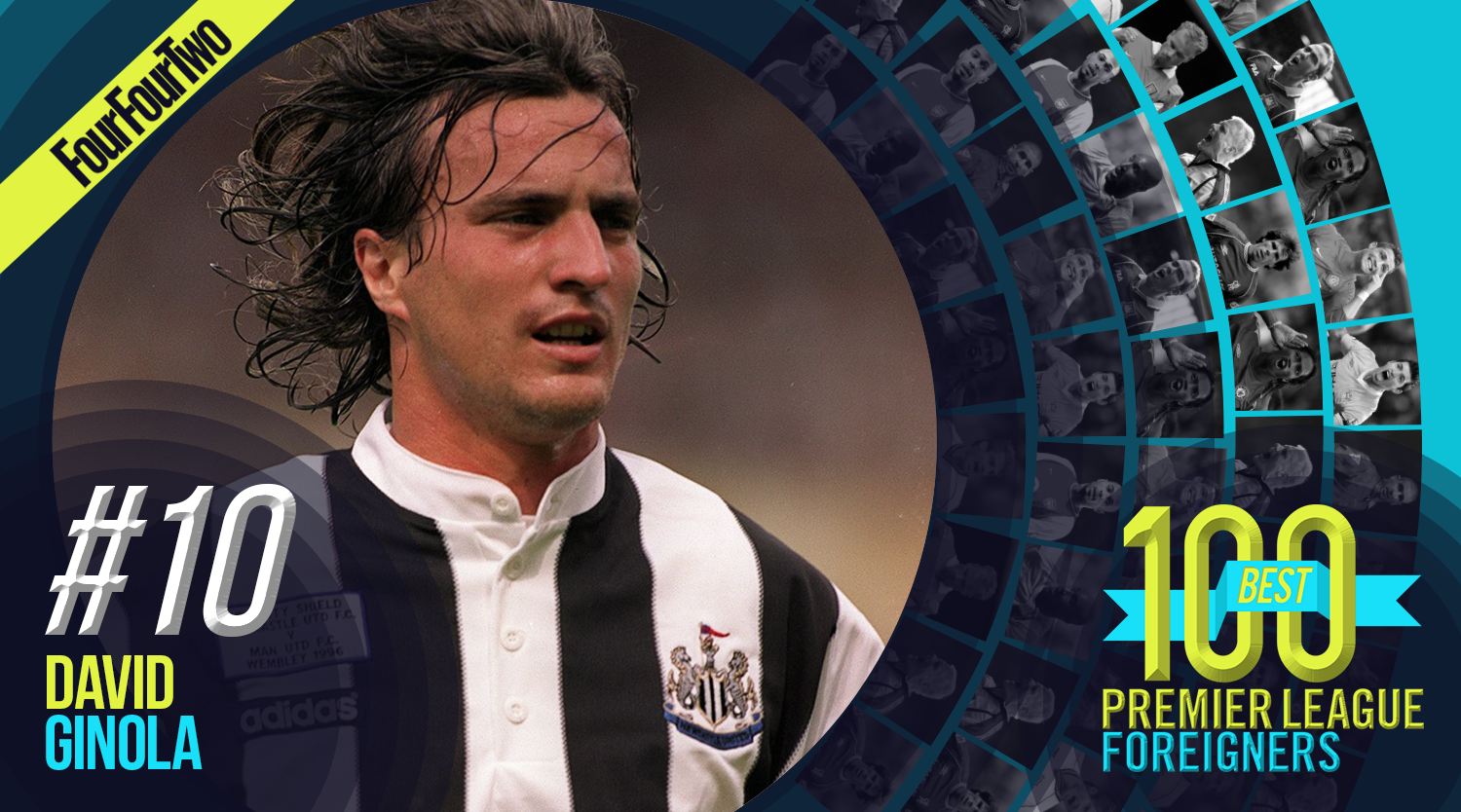
10. David Ginola
By Warren Barton
In many ways, I think David was unique in English football, particularly at that time. He was a special player. Those words gets bandied about far too regularly in the modern era but he deserved that tag because of what he could do with the ball at his feet. How much would he be worth now?
He was a charming man but he’s also someone who thinks deeply about the game. It ended on a sour note with him at Newcastle in the end with Kenny Dalglish, but everyone respected him up there and no one will ever forget him.
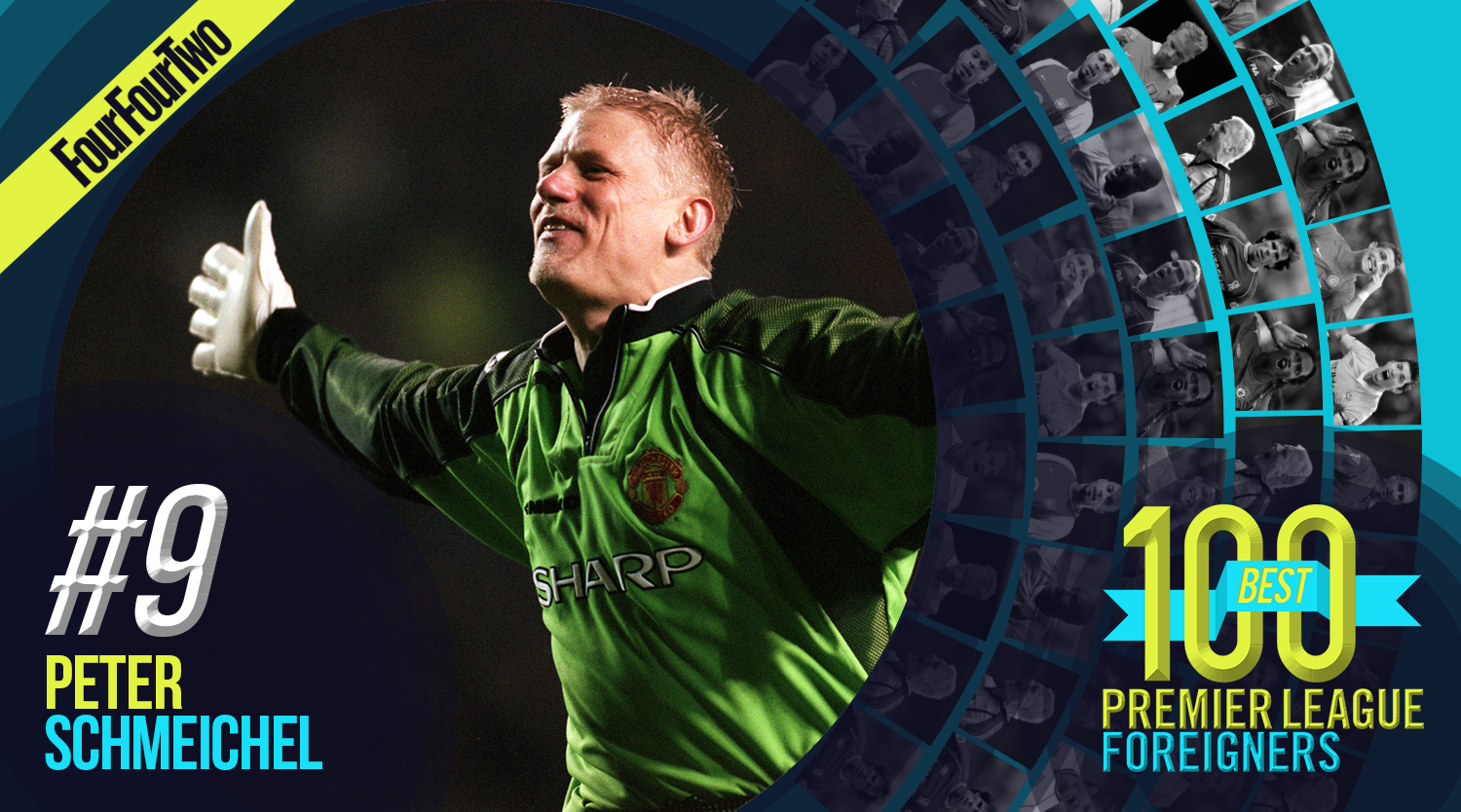
9. Peter Schmeichel
By Henning Berg
Despite the fact that Peter wasn’t afraid to give you a dressing down as a defender, he was fantastic to play in front of. He was a great organiser but also a great motivator, someone who made sure that everyone was on their toes at all times.
Basically he was a big figure in every sense; a great character, someone who showed his emotions in the right way, but also someone who had an enormous physical presence – he filled the goal. A lot of players have skills and quality, but they lack a winning mentality. Peter had the lot.
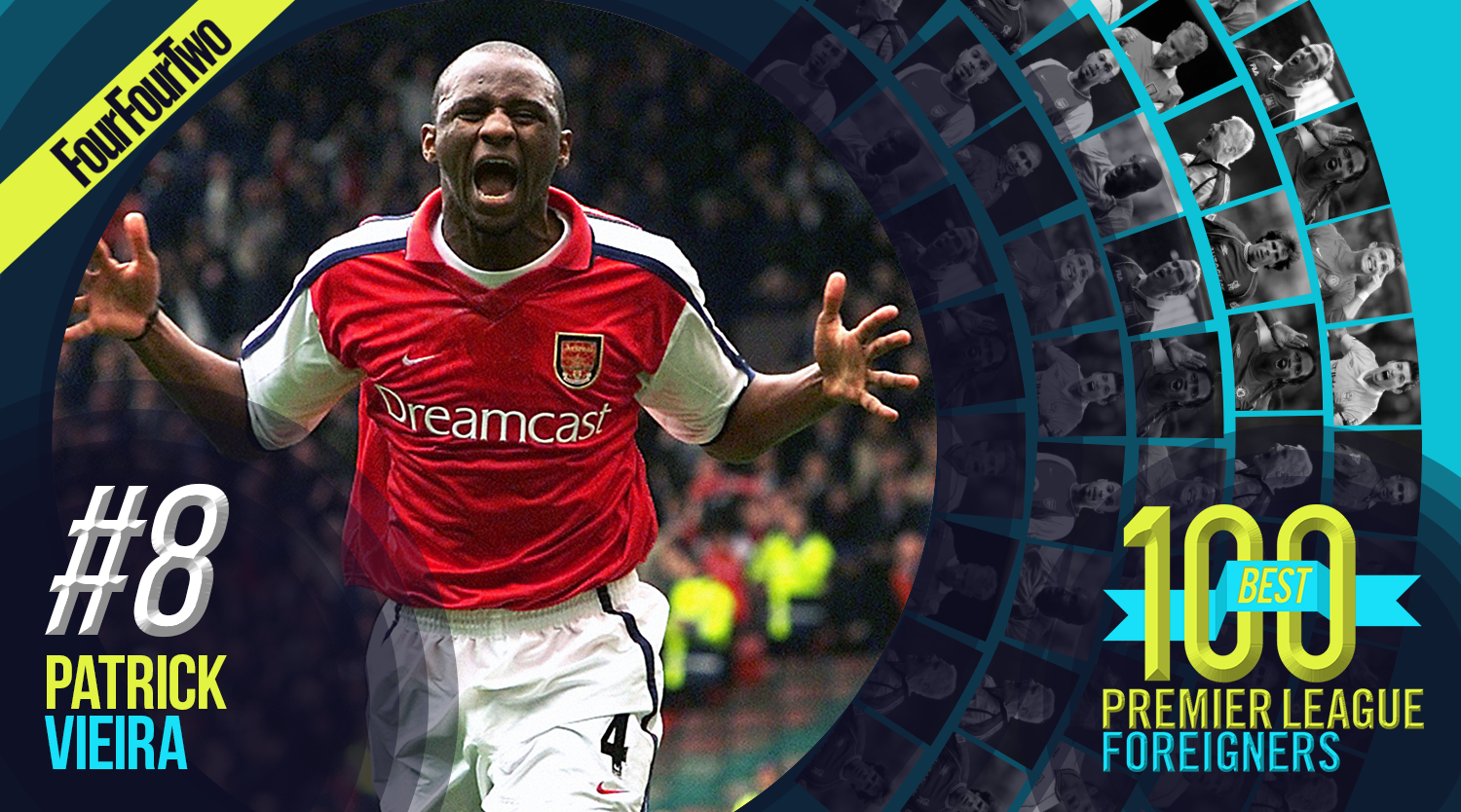
8. Patrick Vieira
By Stephen Hughes
In his first training session we played a practice game in training. Immediately you could just see what that long stride of his could do; it’d take him away from you in two movements. I don’t think we saw the best of Patrick until Arsene came, but we could see his natural ability.
Everyone remembers that strong, aggressive holding midfield player but the ability he had is easily overlooked. I remember him just dinking the ball over opponents like they weren’t even there. Everyone focuses on his warrior-like mentality, but nobody should forget what he could do on the ball.
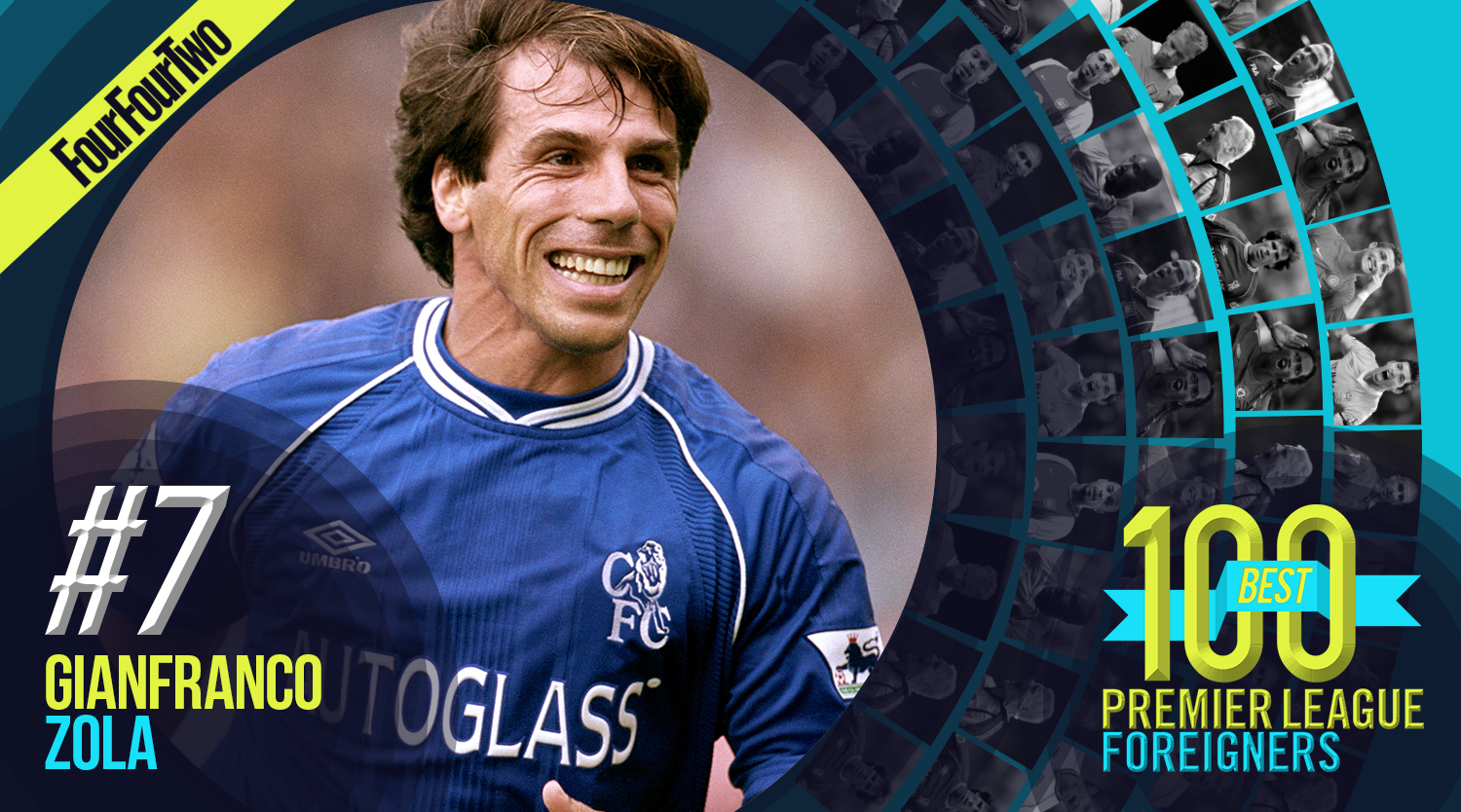
7. Gianfranco Zola
By Craig Burley
When Zola walked in, it was a real stand-up-and-take-notice moment. Don’t forget that he was once seen as the heir apparent to Diego Maradona at Napoli; now there he was arriving in the same changing room as me.
There are a lot of talented guys out there but that work ethic Gianfranco showed can be the difference. That’s the difference between the great players and those who have great ability but bemoan the fact that they didn’t get to a certain level.
Did he inspire us to play better and to train better? Absolutely.
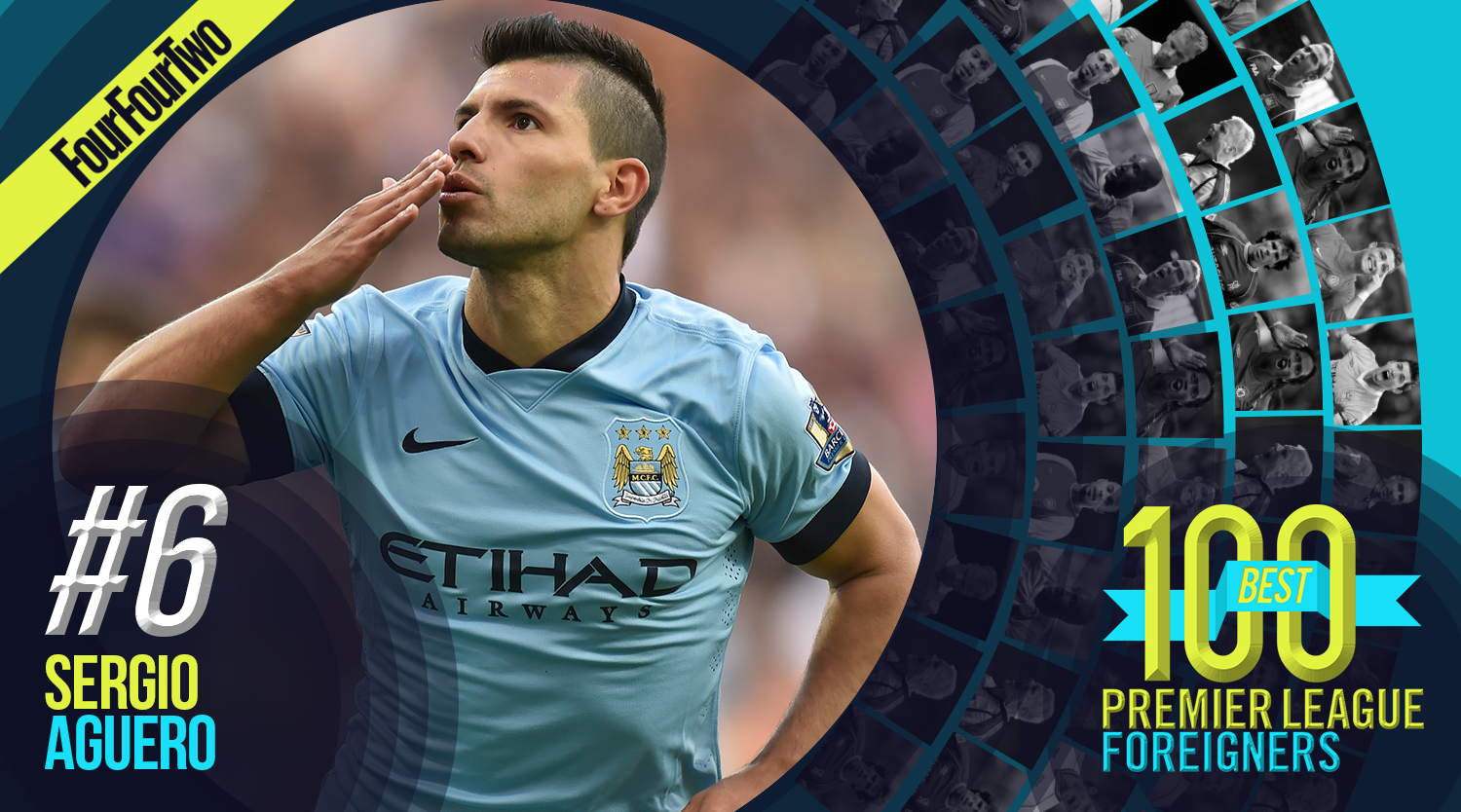
6. Sergio Aguero
By Micah Richards
In the summer of 2011 we already had some really good players at Manchester City, but up to that point Robinho had been the biggest signing – the first one when people started to take us a bit seriously.
But when Sergio came it was different level, because we knew he was potentially one of the best strikers in the world. We also knew that once we started getting these kinds of players in that it wouldn’t be long before we started winning leagues – and we were right. Sergio was just next level.
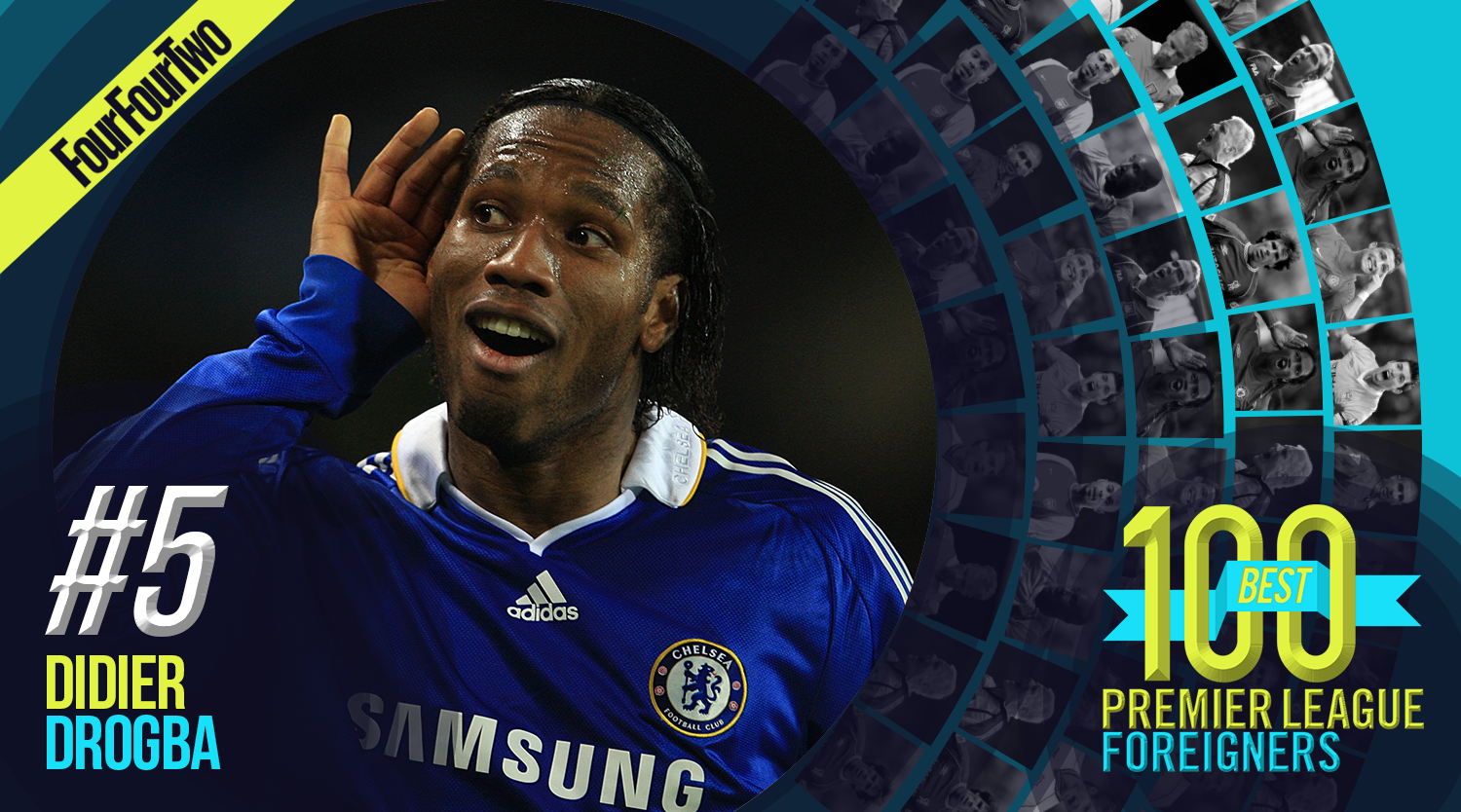
5. Didier Drogba
By Damien Duff
Didier was a man you’d go to war with – a real leader, which I think showed on the pitch. Away from the pitch I just remember him bouncing around everywhere – he was a massive joker in the dressing room, just a big personality. There were a lot in that dressing room like that actually.
Me being a winger, you didn’t even have to look up sometimes and pick Didier out because you knew he’d be there. He could make a bad cross into a good cross – he really was an unbelievable player.
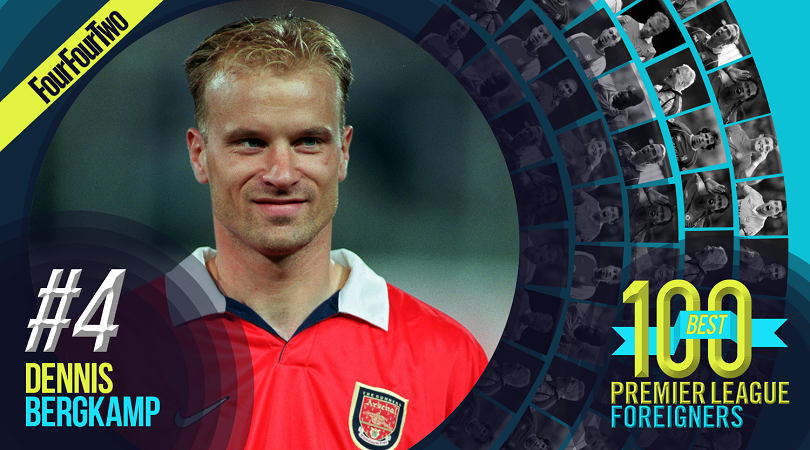
4. Dennis Bergkamp
By Nigel Winterburn
When you put someone down as your all-time greatest team-mate, I think that tells you all you need to know.
Dennis played in that No.10 role where you’re looking for someone to score a lot of goals, but he created so many chances for others too. We soon realised what he had to offer: his incredible control of the ball, how calm and calculated he was.
There was an appreciation of the way he conducted himself; how he linked play between team-mates and showed an unbelievable awareness of those around him. We knew quite quickly that we had a pretty outstanding player at the club.
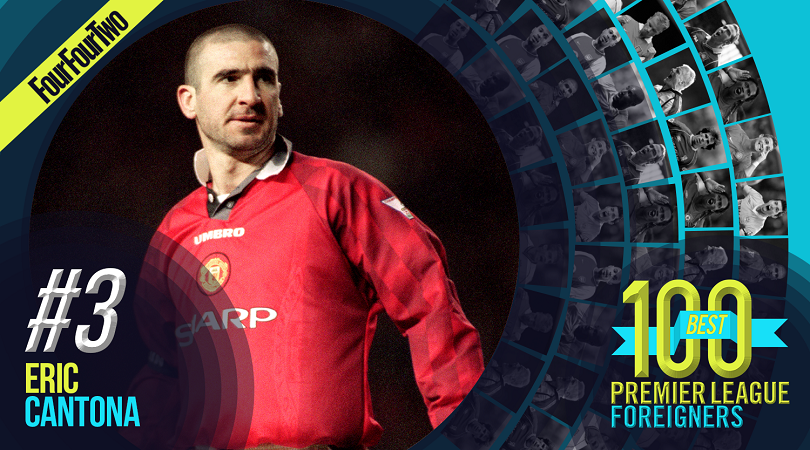
3. Eric Cantona
By Lee Sharpe
I think the standard went up as soon as he arrived, even in training. Eric had an edge of arrogance that helped us all, and a self-confidence that rubbed off on everyone. We used to do a lot of crossing and finishing, and he was unerring – he would always seem to score. He had a great touch and a fantastic awareness with the ball at his feet.
It was a shame he retired a bit early, but being the maverick he was, it was entirely in keeping. He finished on his terms and that only added to his mystique.
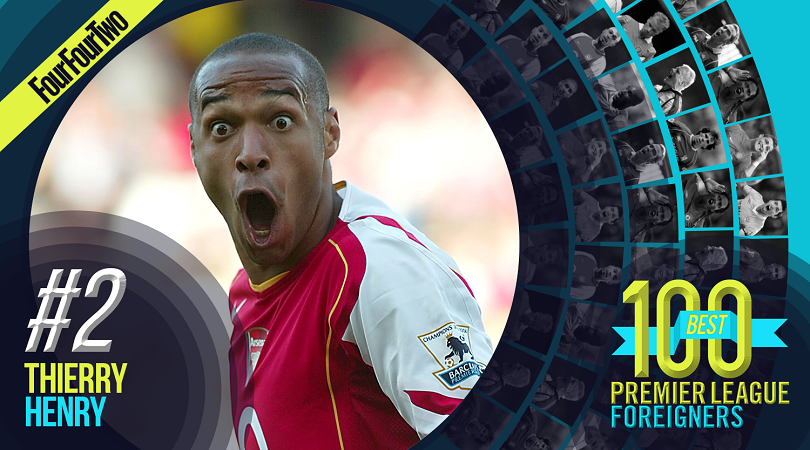
2. Thierry Henry
By Gilberto Silva
Thierry is an amazing guy. He’s one of those guys who has a strong personality and wasn’t afraid to say whatever came to his mind if he thought it was fair, or would be positive to help the team. He always put everything into what he did, and wouldn’t accept if others didn’t do the same.
Perhaps he got himself into some trouble a few times because of it, but I have no doubt it was fundamental for us to build the side that won the Premier League without losing a single game.
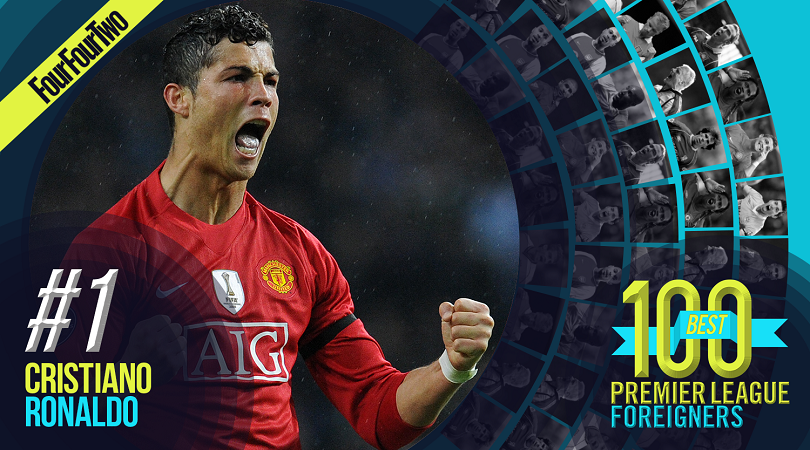
1. Cristiano Ronaldo
By Rio Ferdinand
We 100% thought Cristiano was going to be a world superstar – it was just a case of when and how quickly he was going to get there.
World Player of the Year? There was never a doubt, even when he’d only just come to us from Sporting in 2003. You can see a lot of players with potential; it’s when they realise decision-making at key moments in games that you know they’re special – when to pass, and how they live their life. It all just fell into place for him through hard work.
Greg Lea is a freelance football journalist who's filled in wherever FourFourTwo needs him since 2014. He became a Crystal Palace fan after watching a 1-0 loss to Port Vale in 1998, and once got on the scoresheet in a primary school game against Wilfried Zaha's Whitehorse Manor (an own goal in an 8-0 defeat).
 Join The Club
Join The Club











